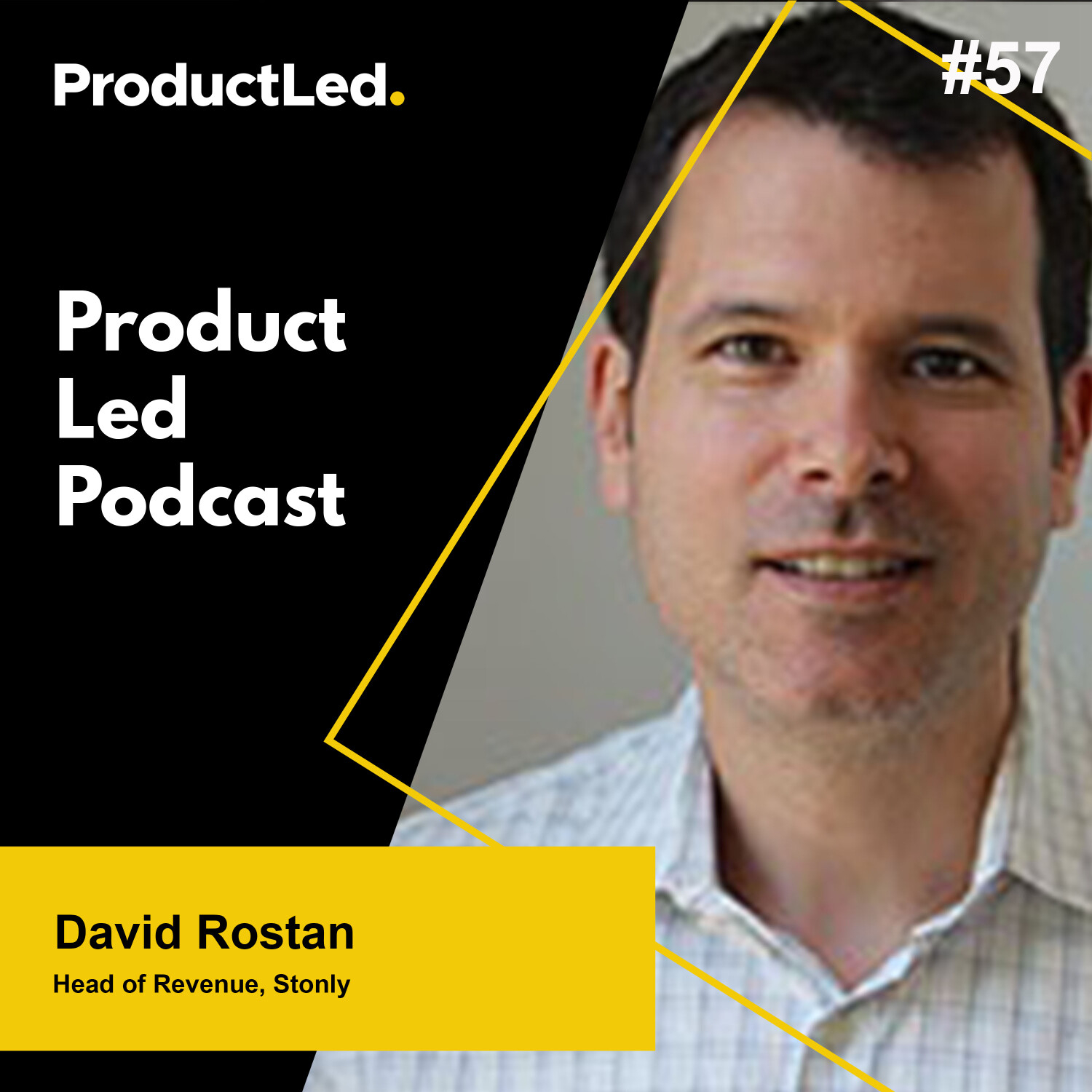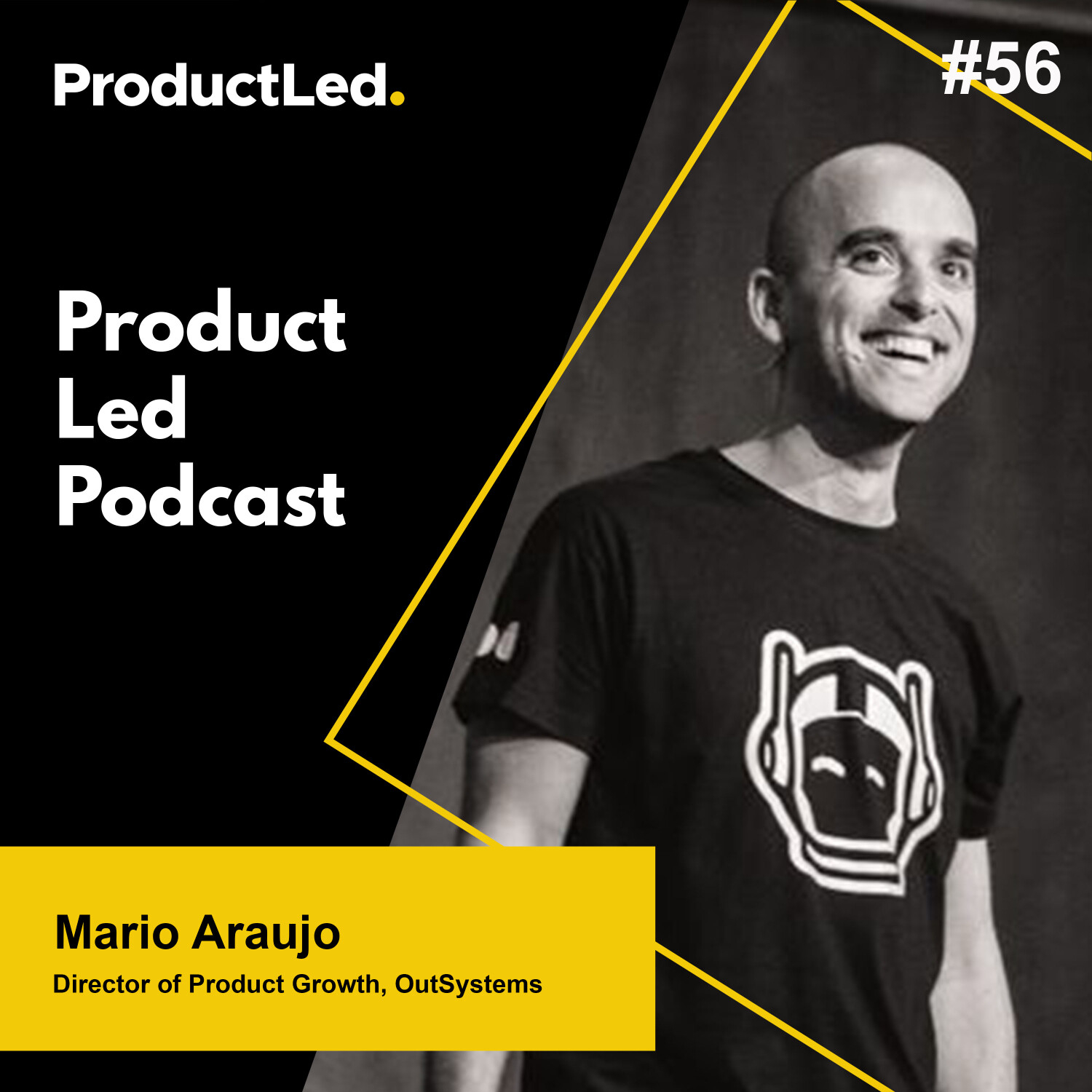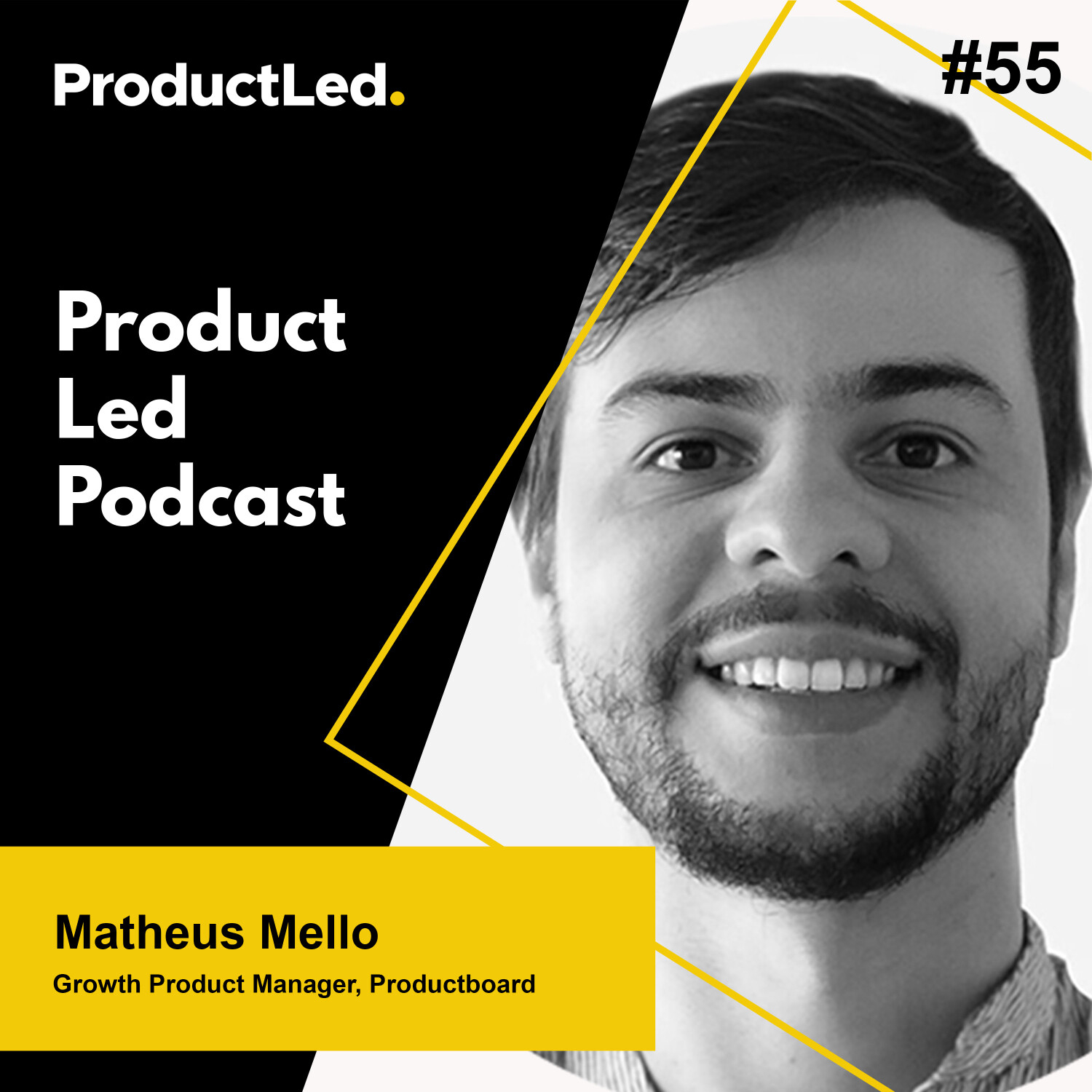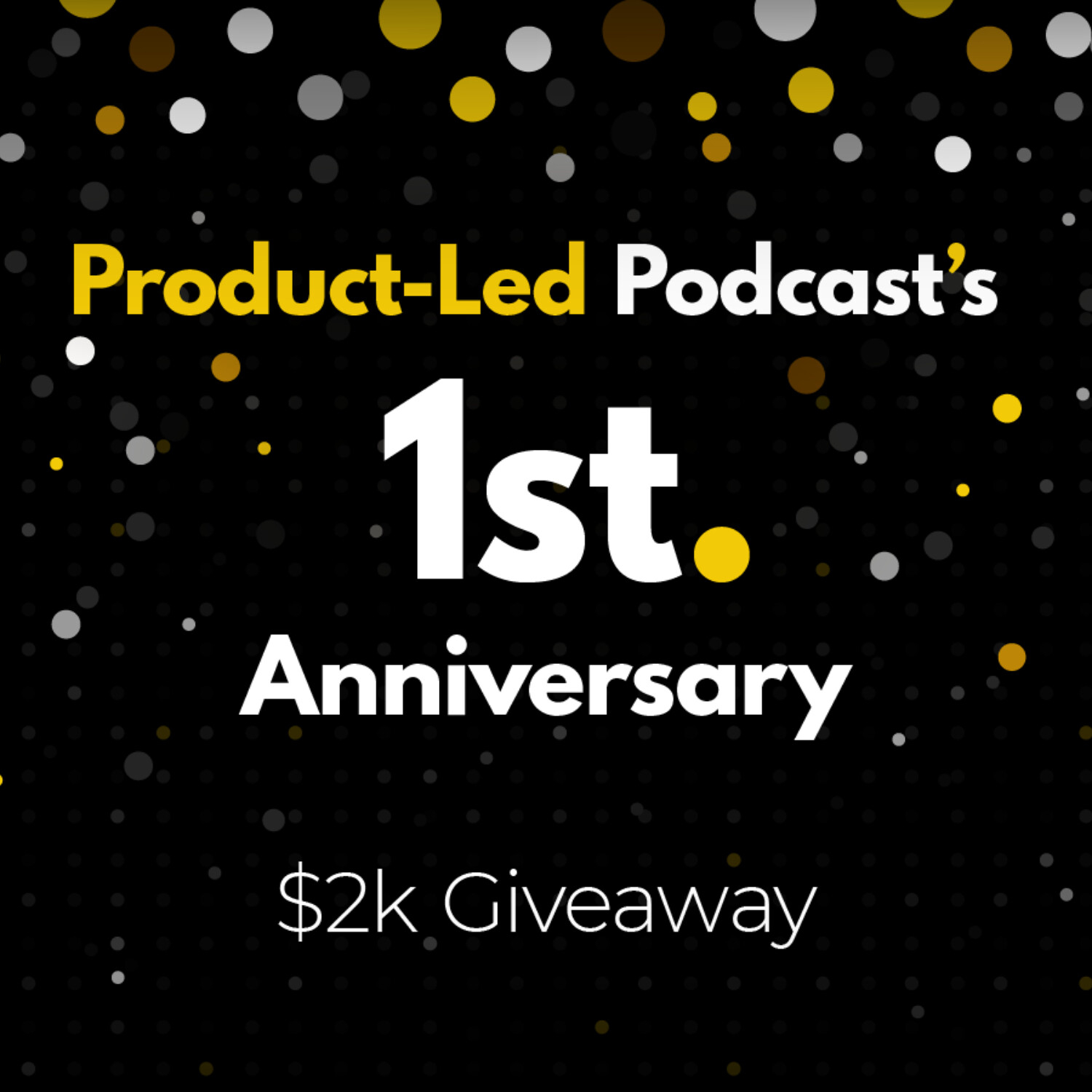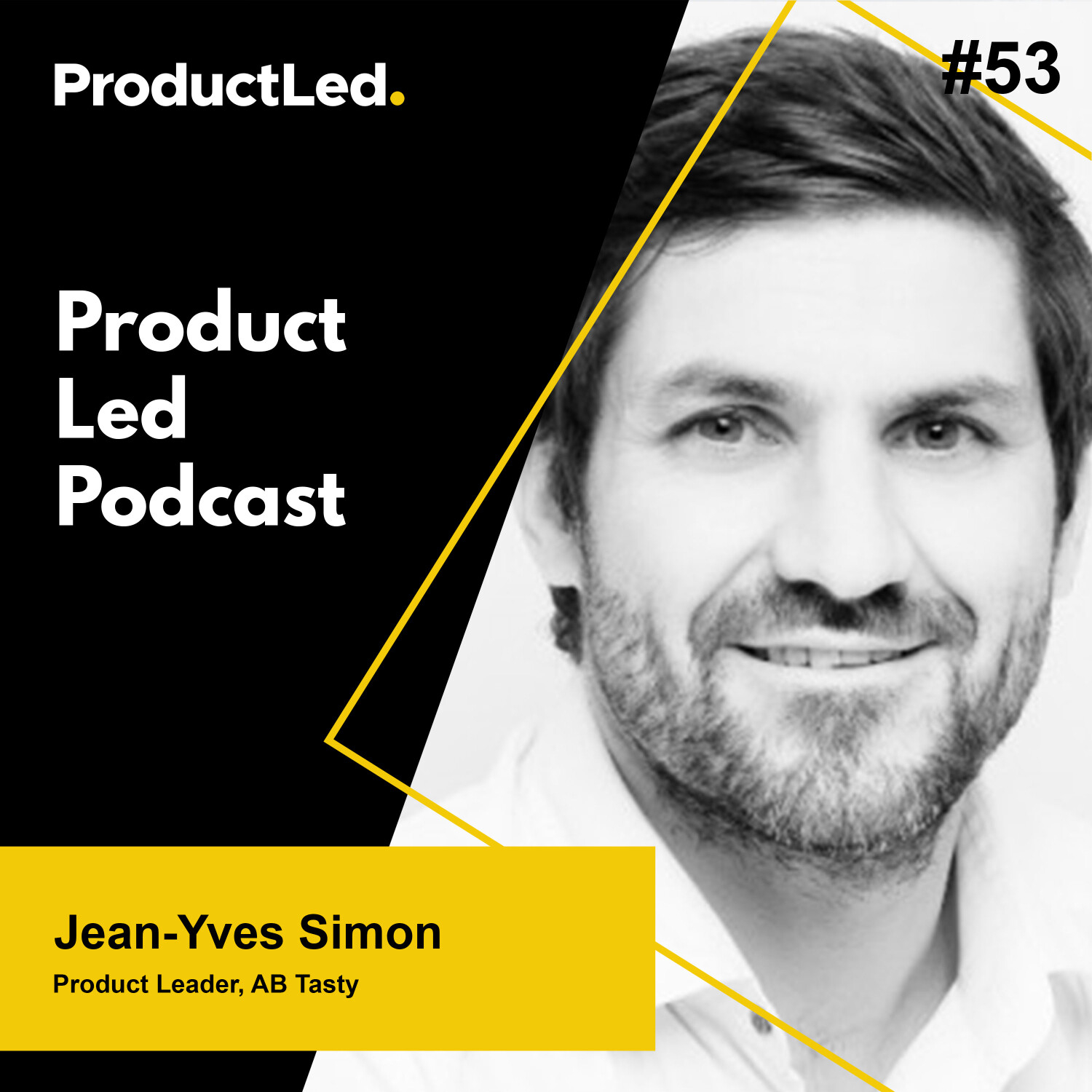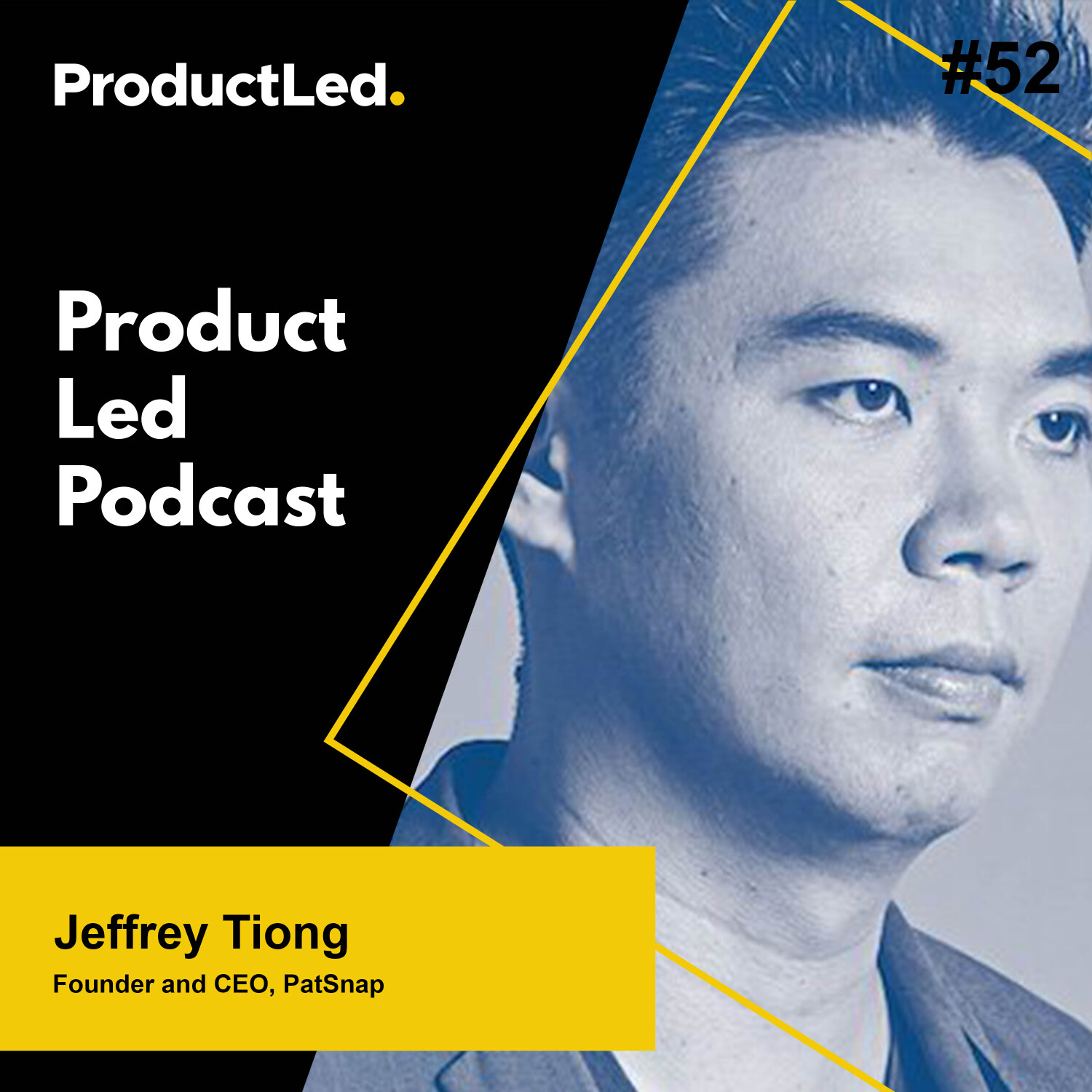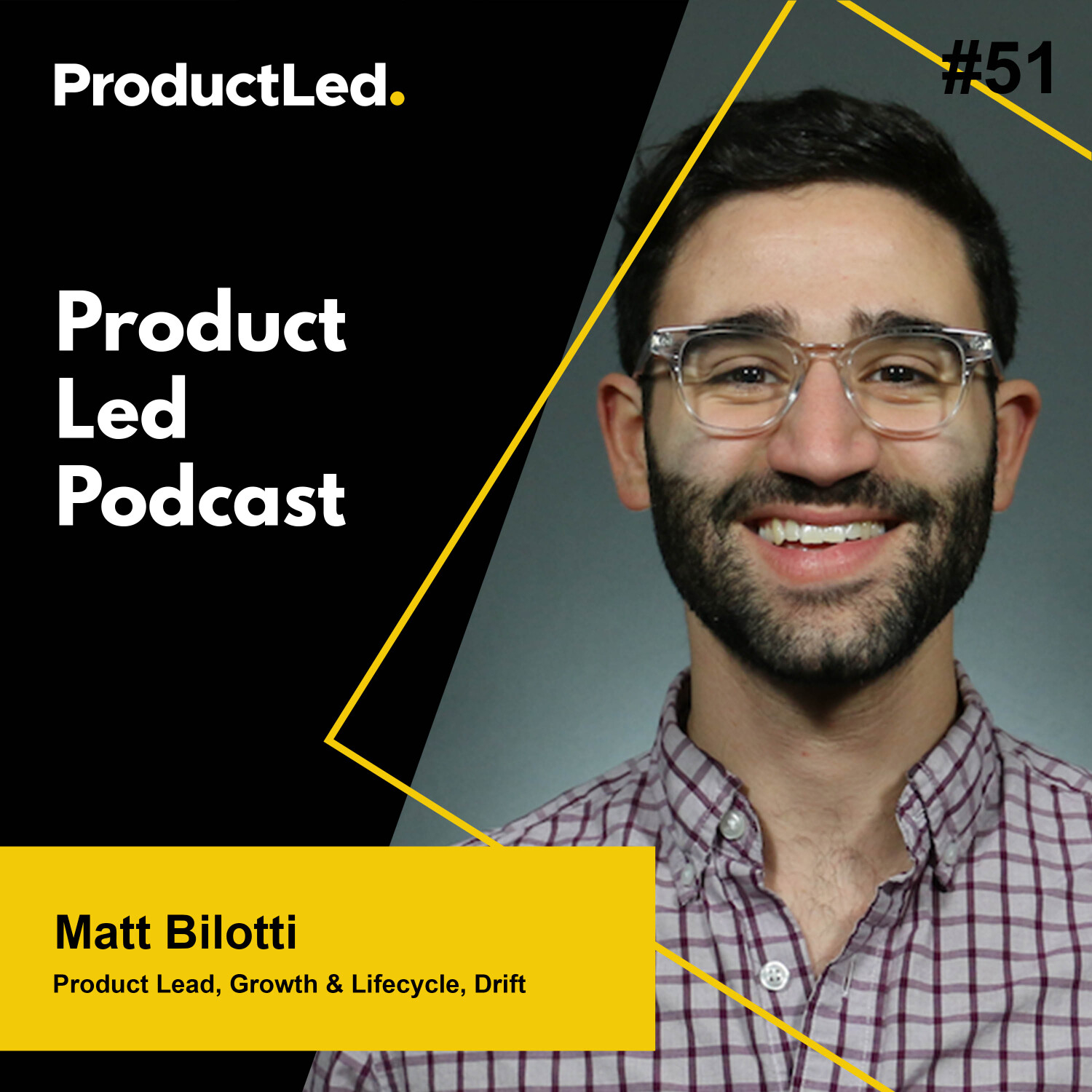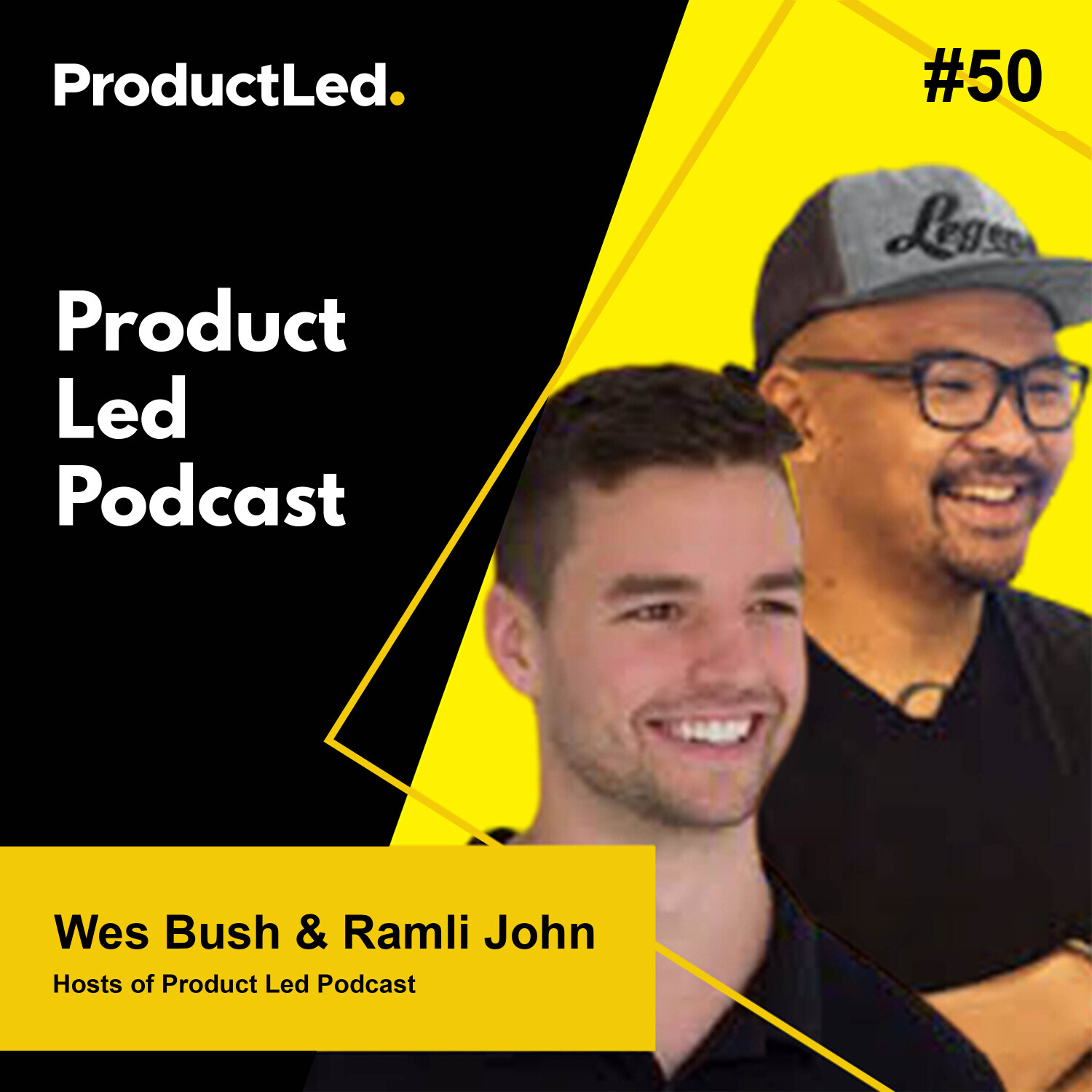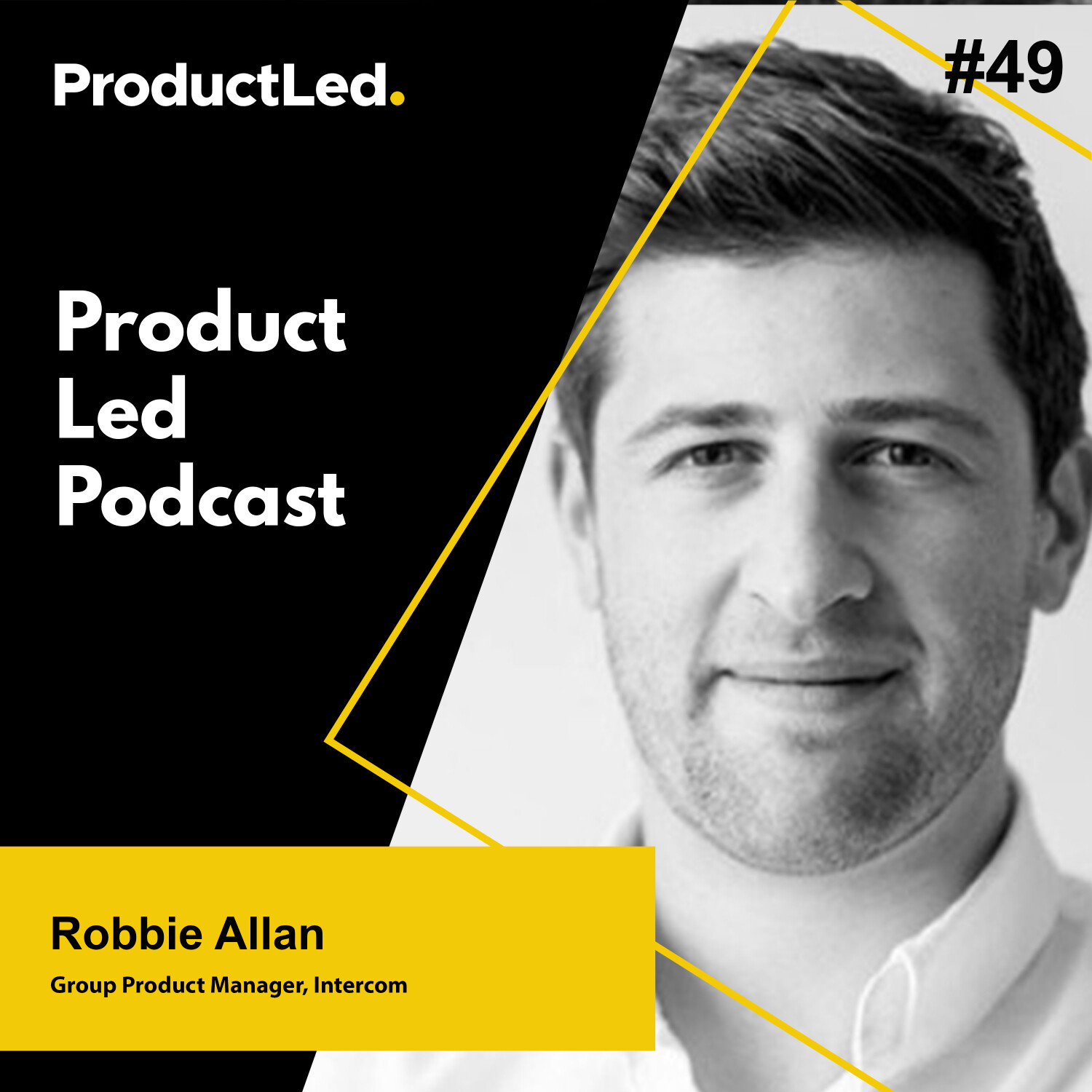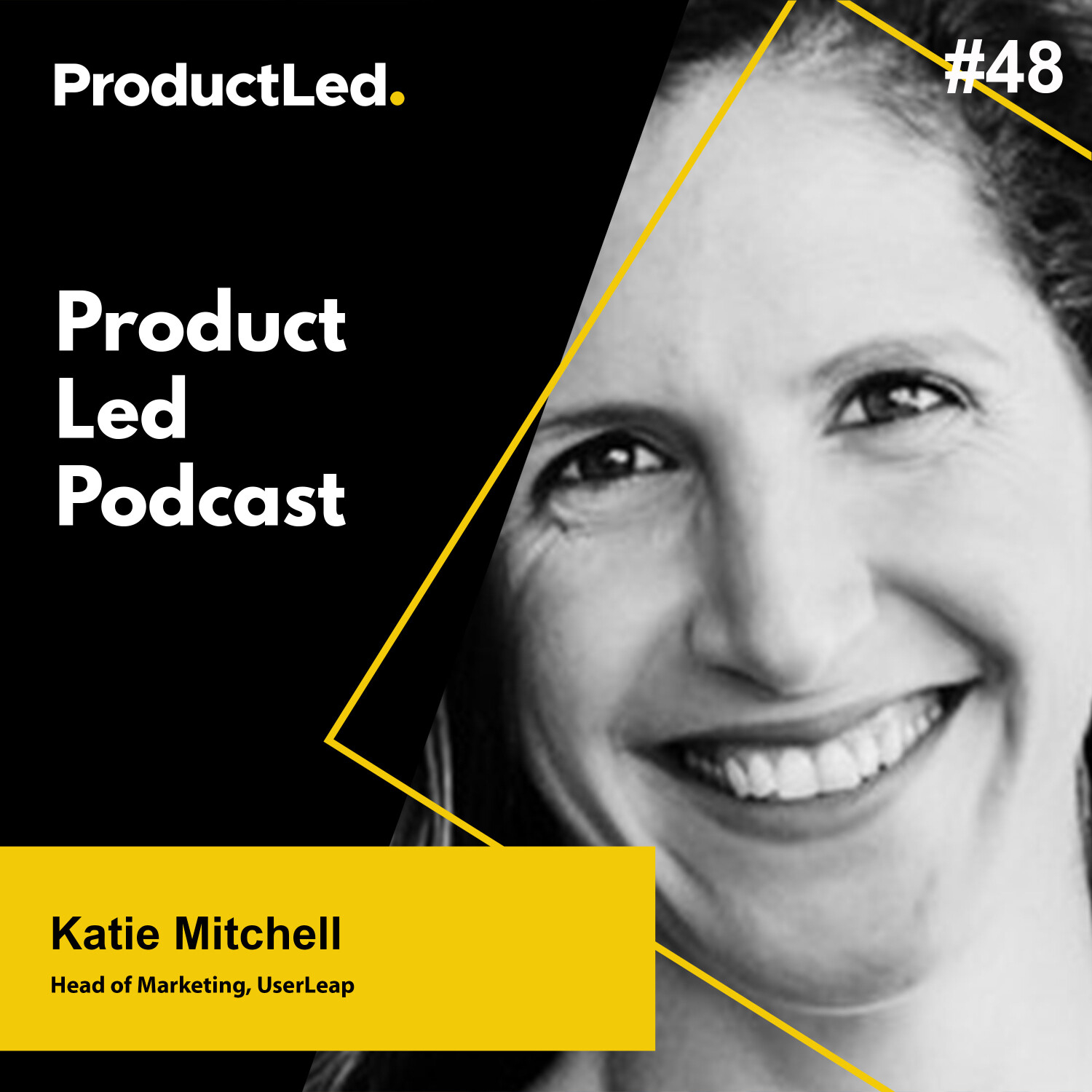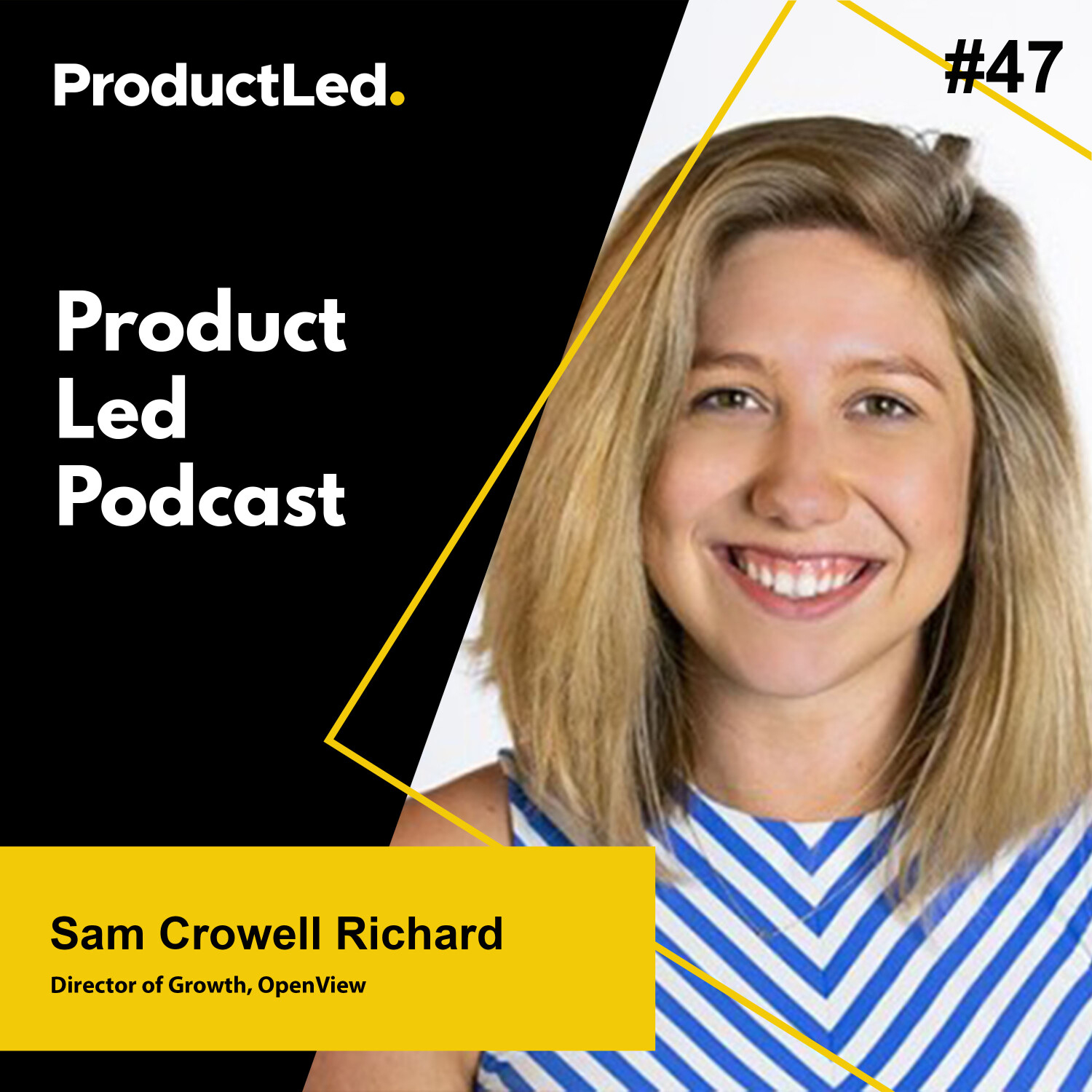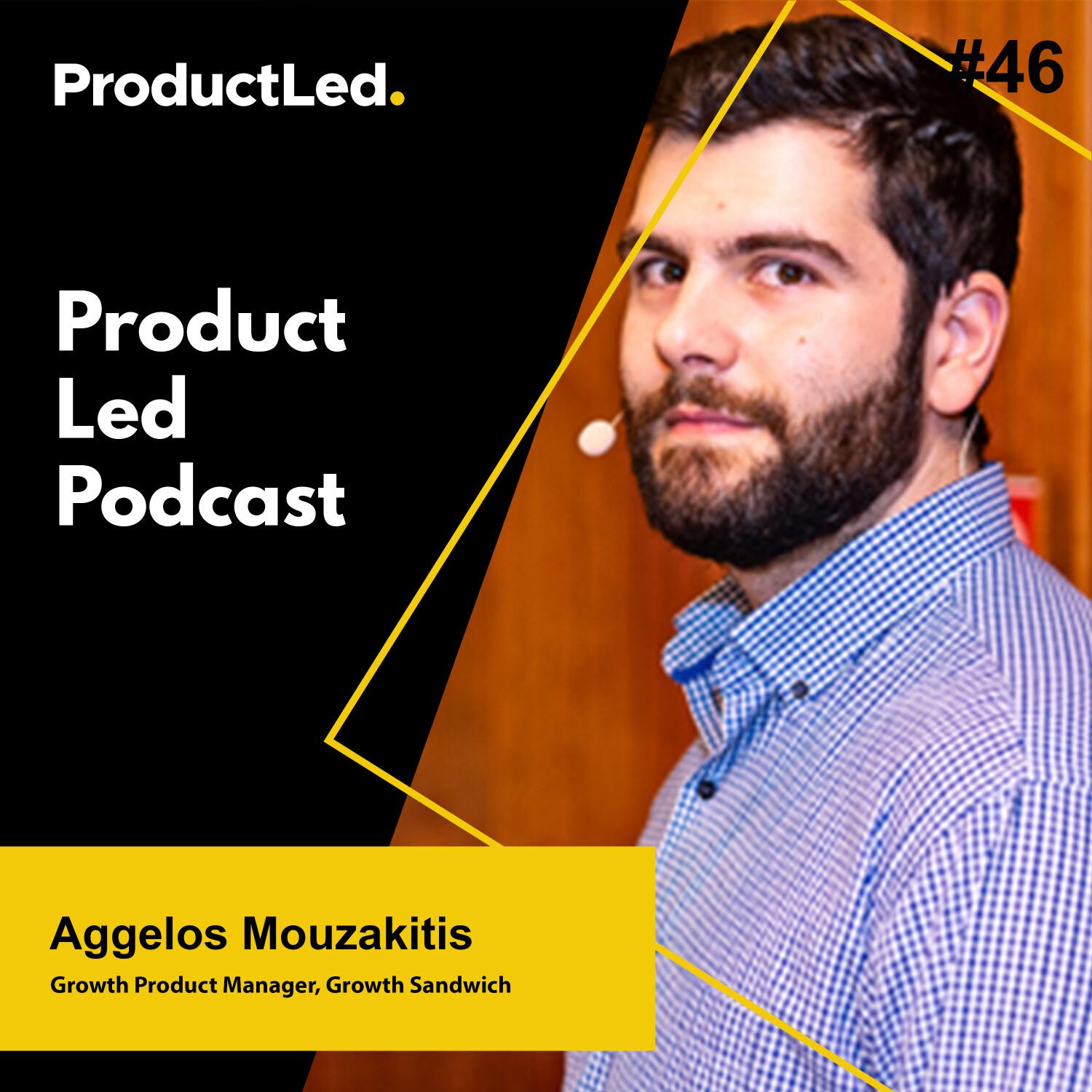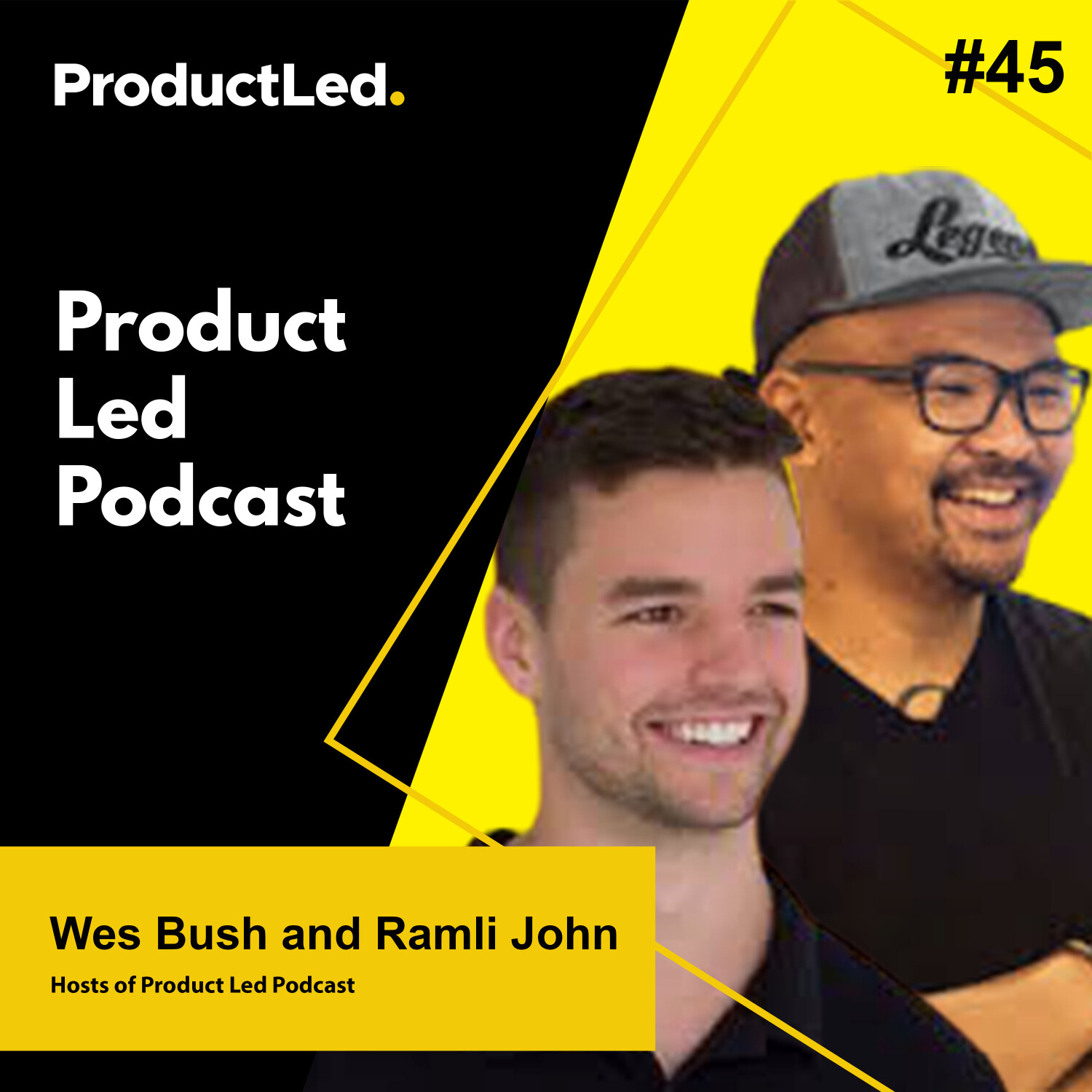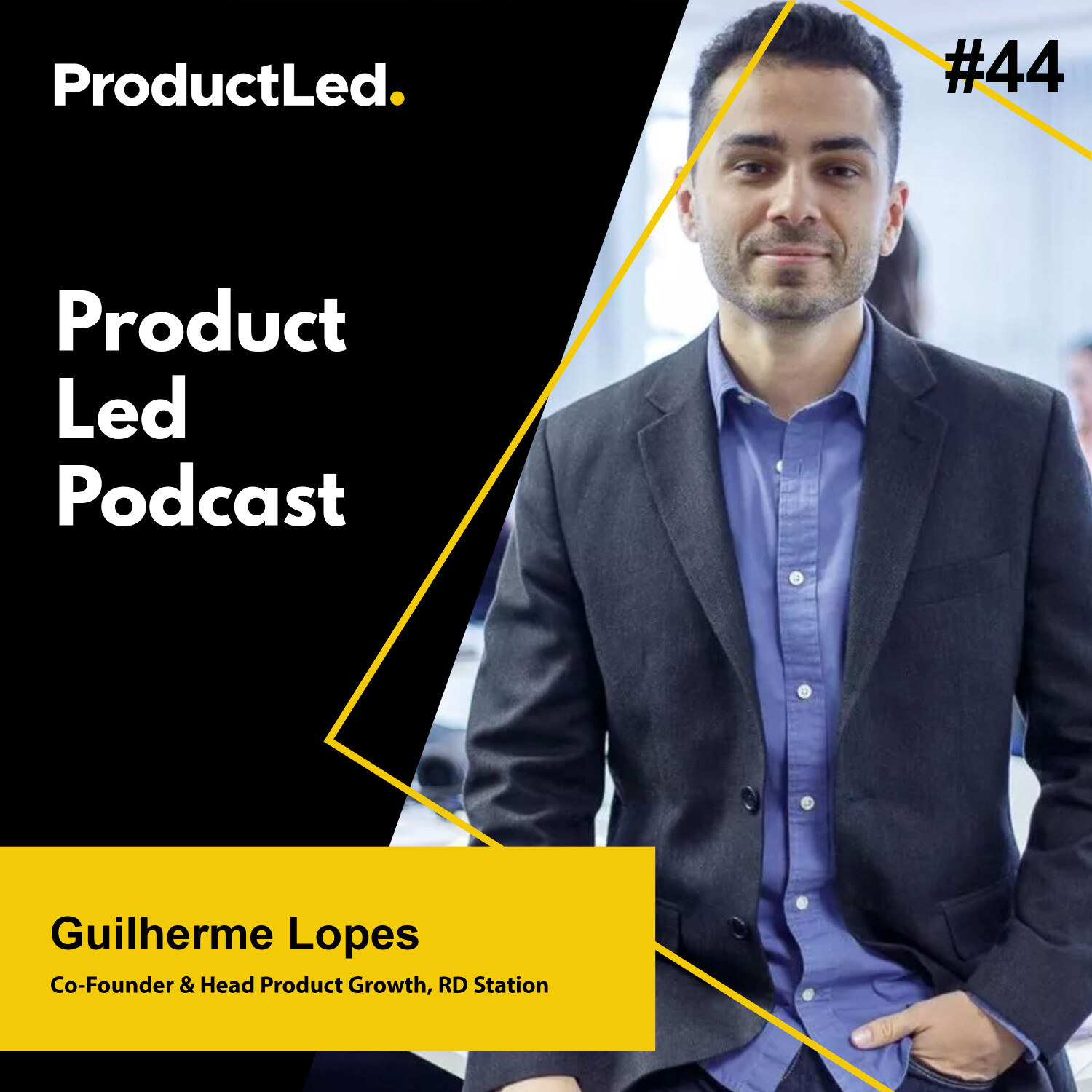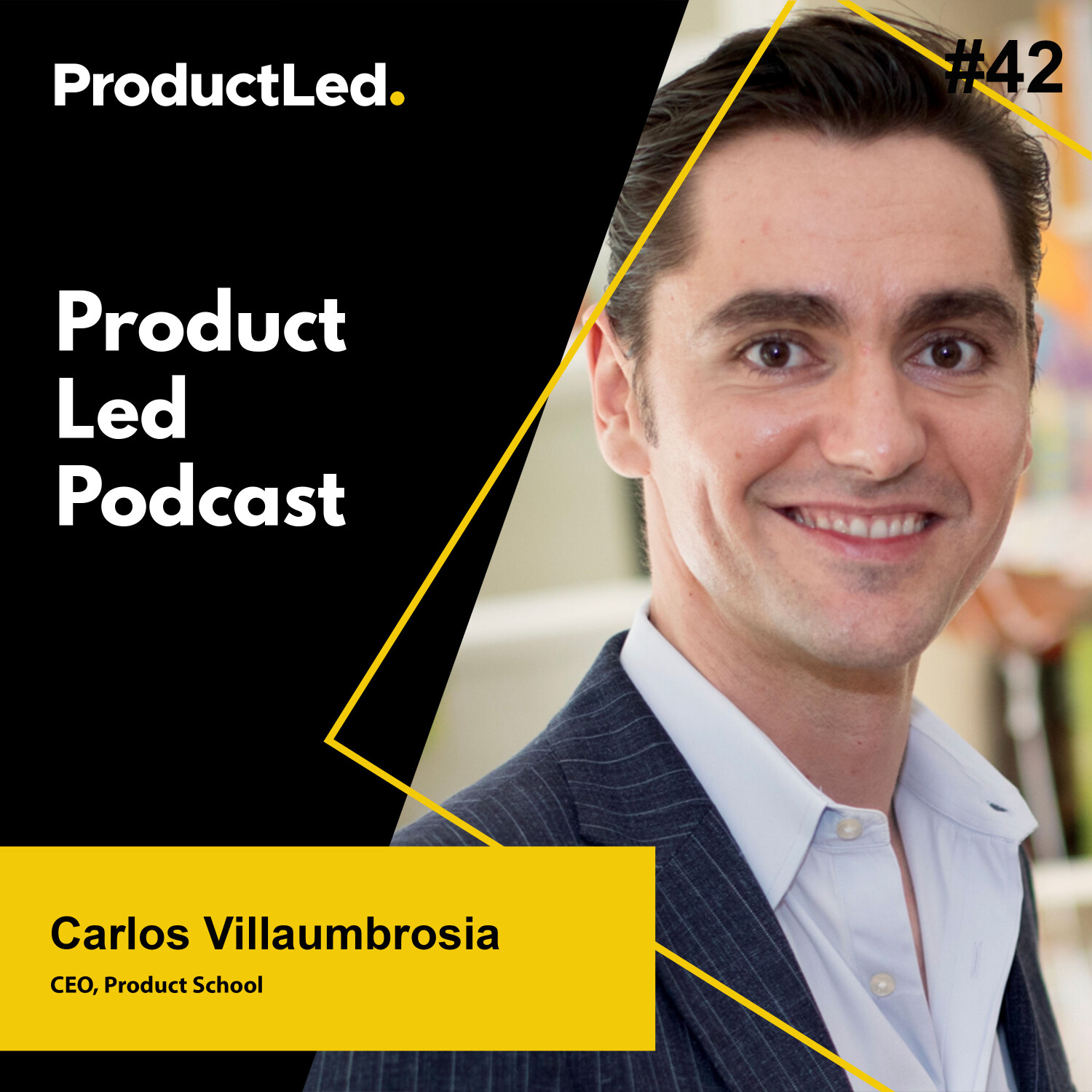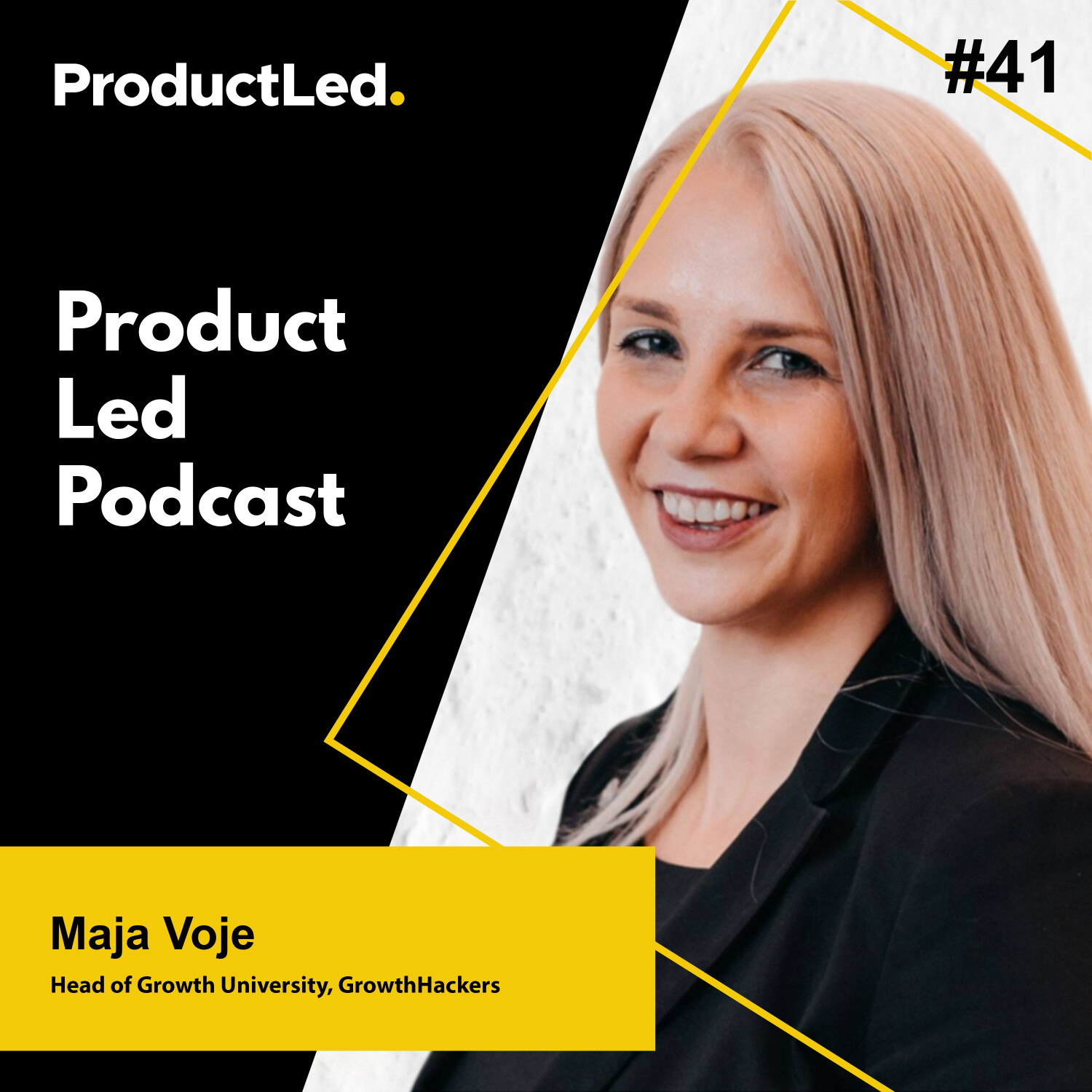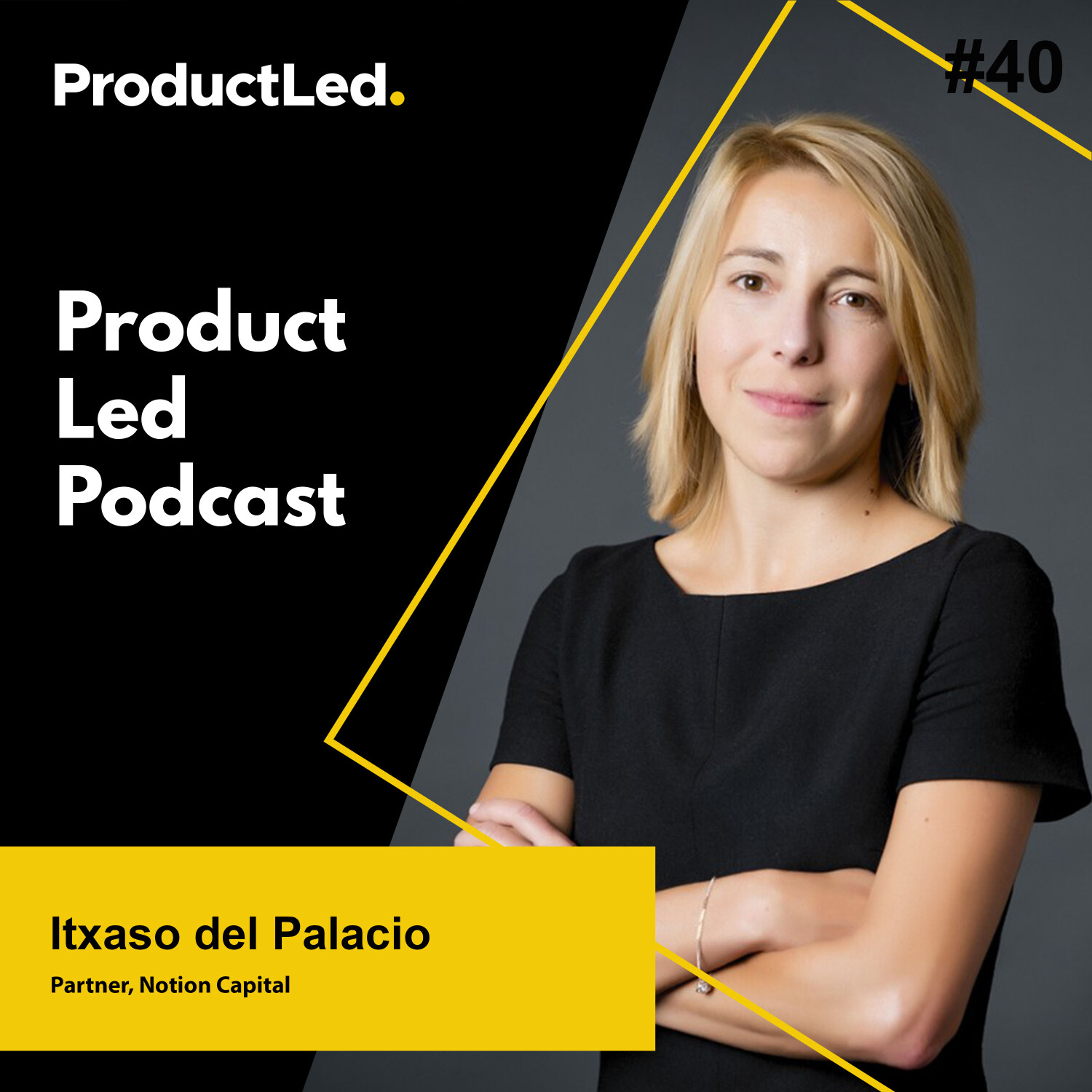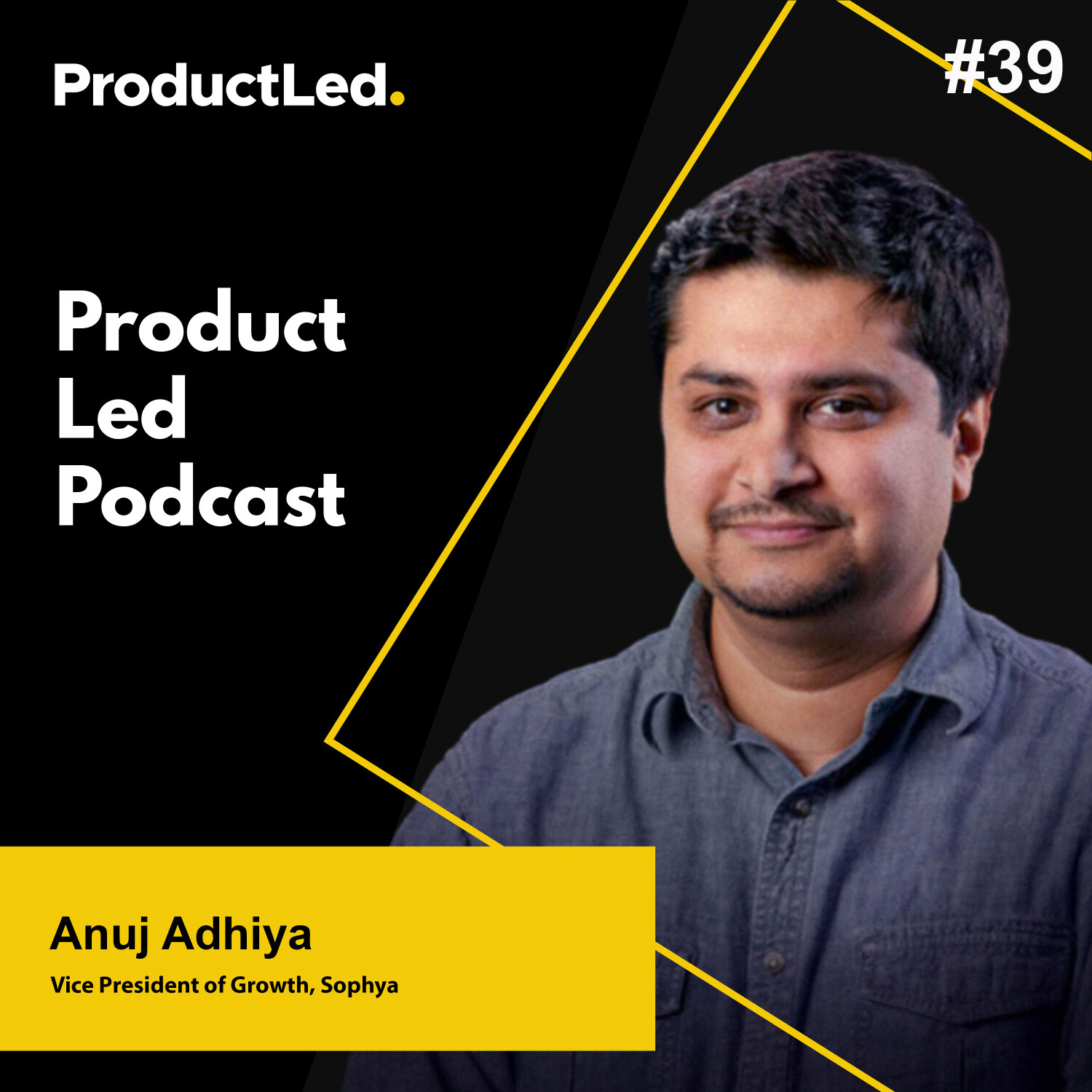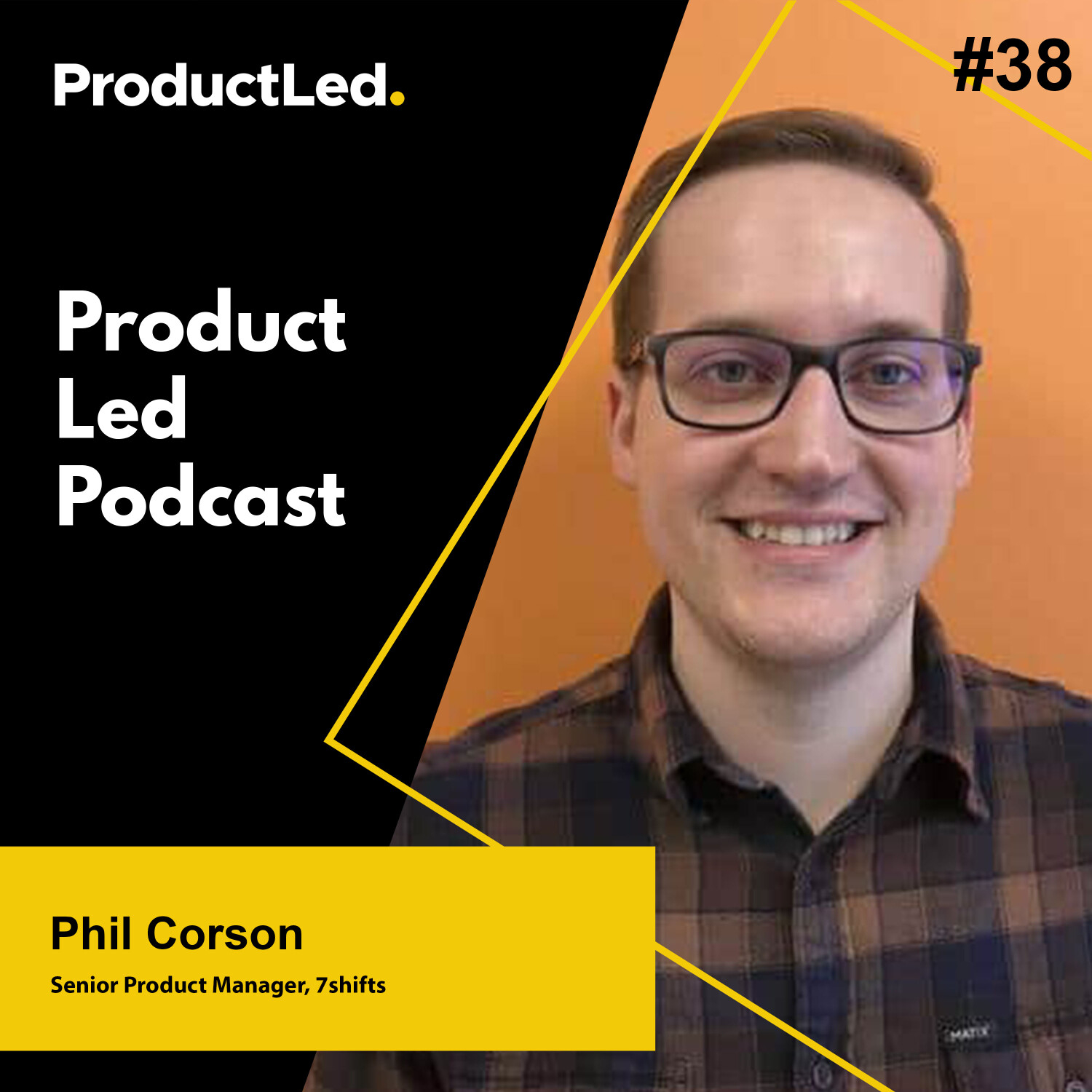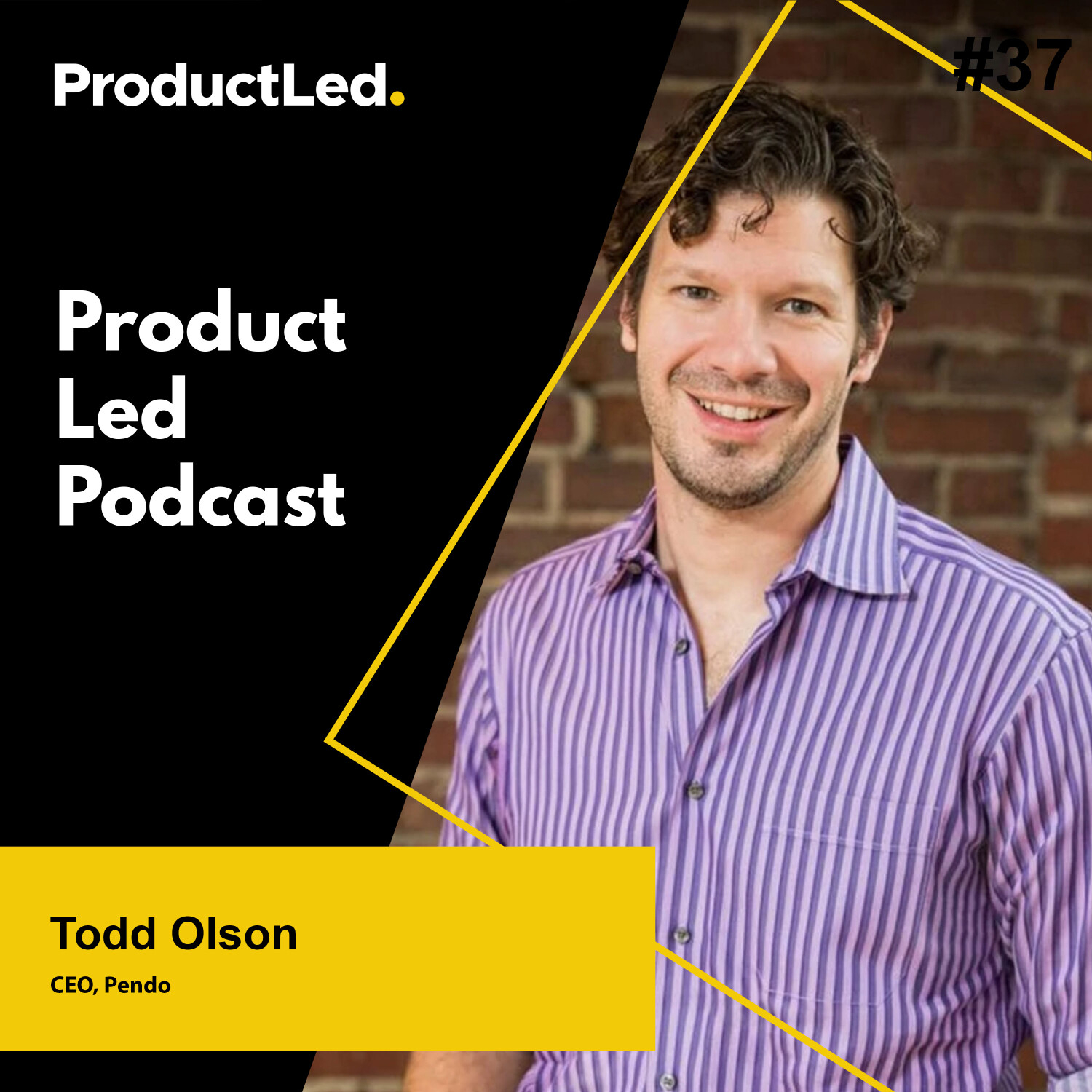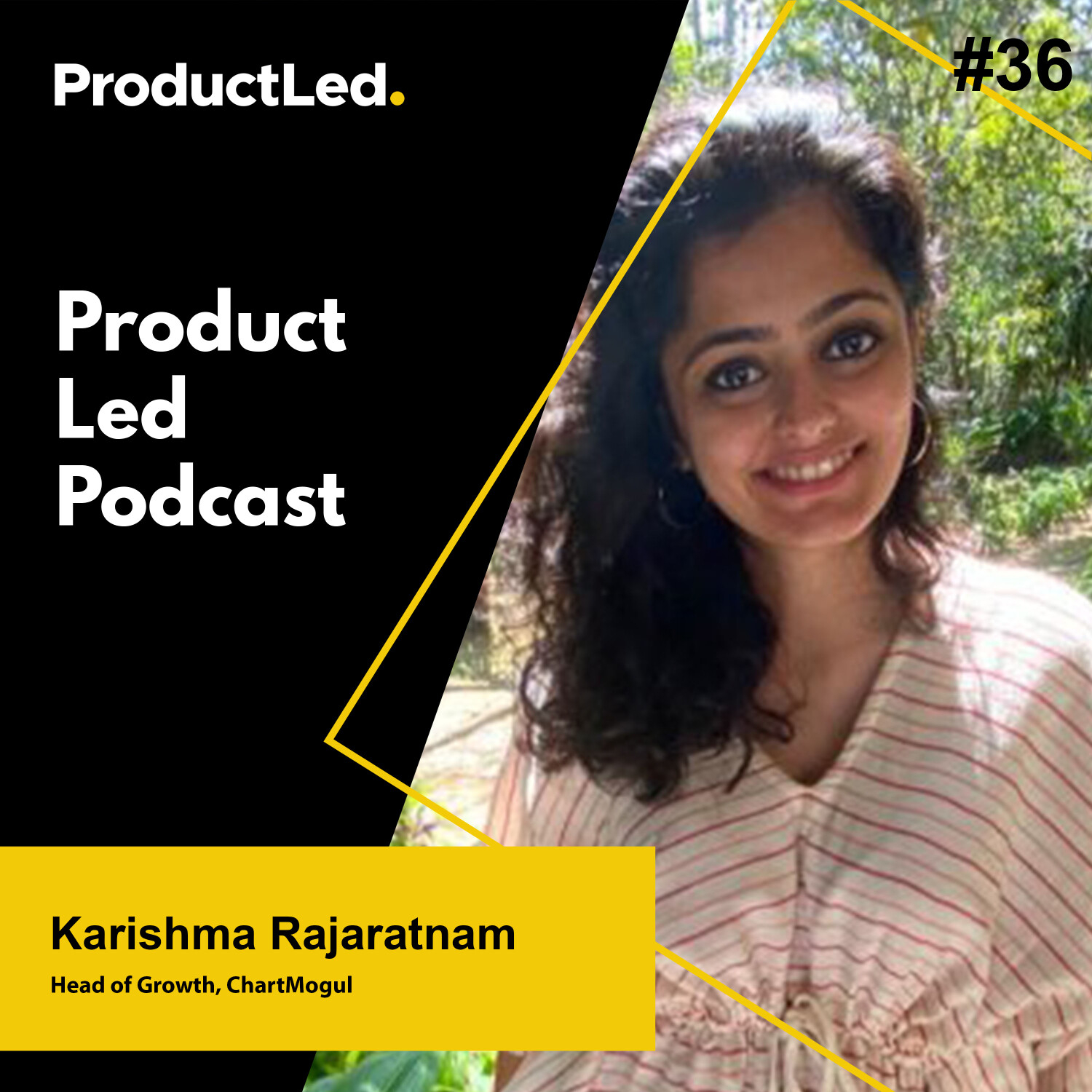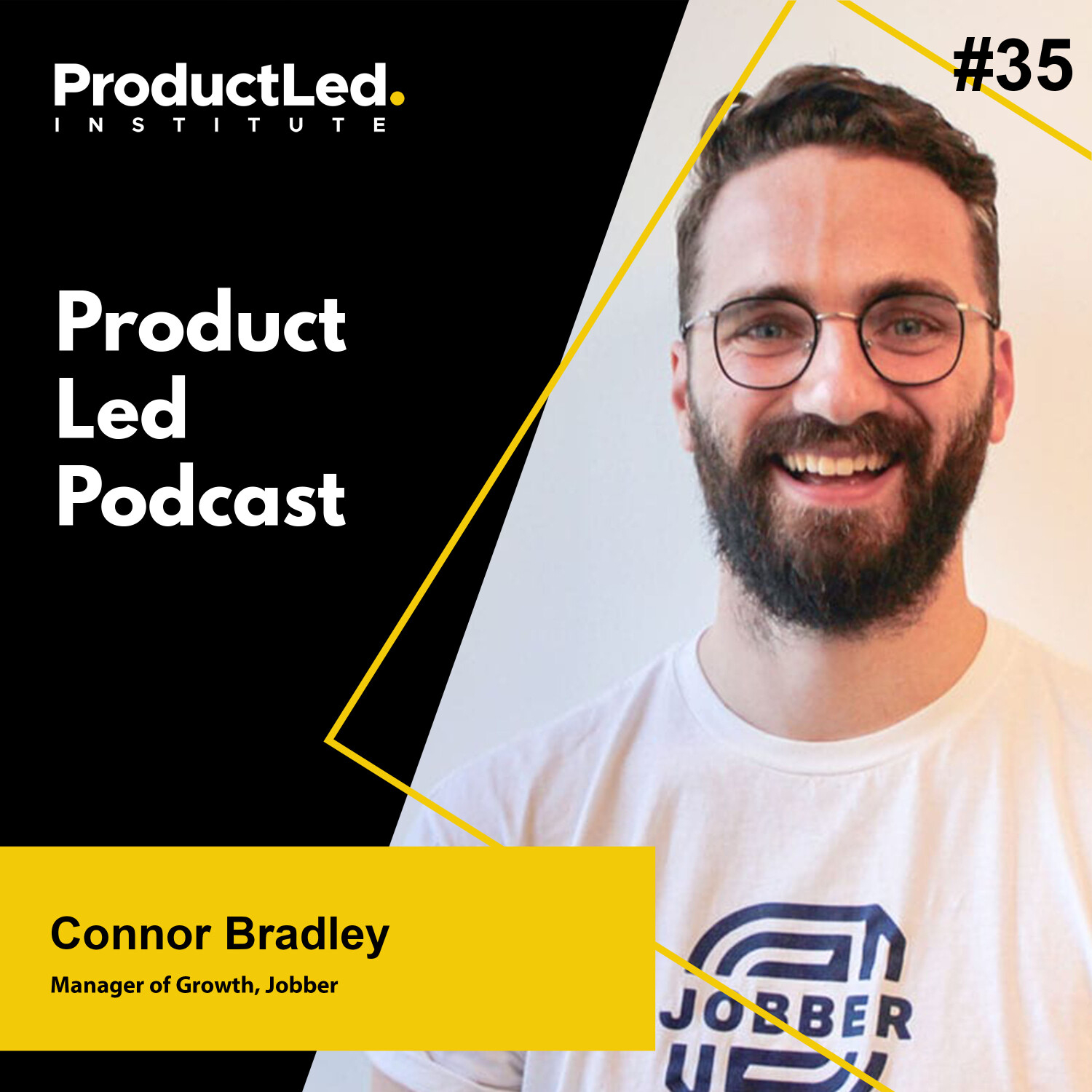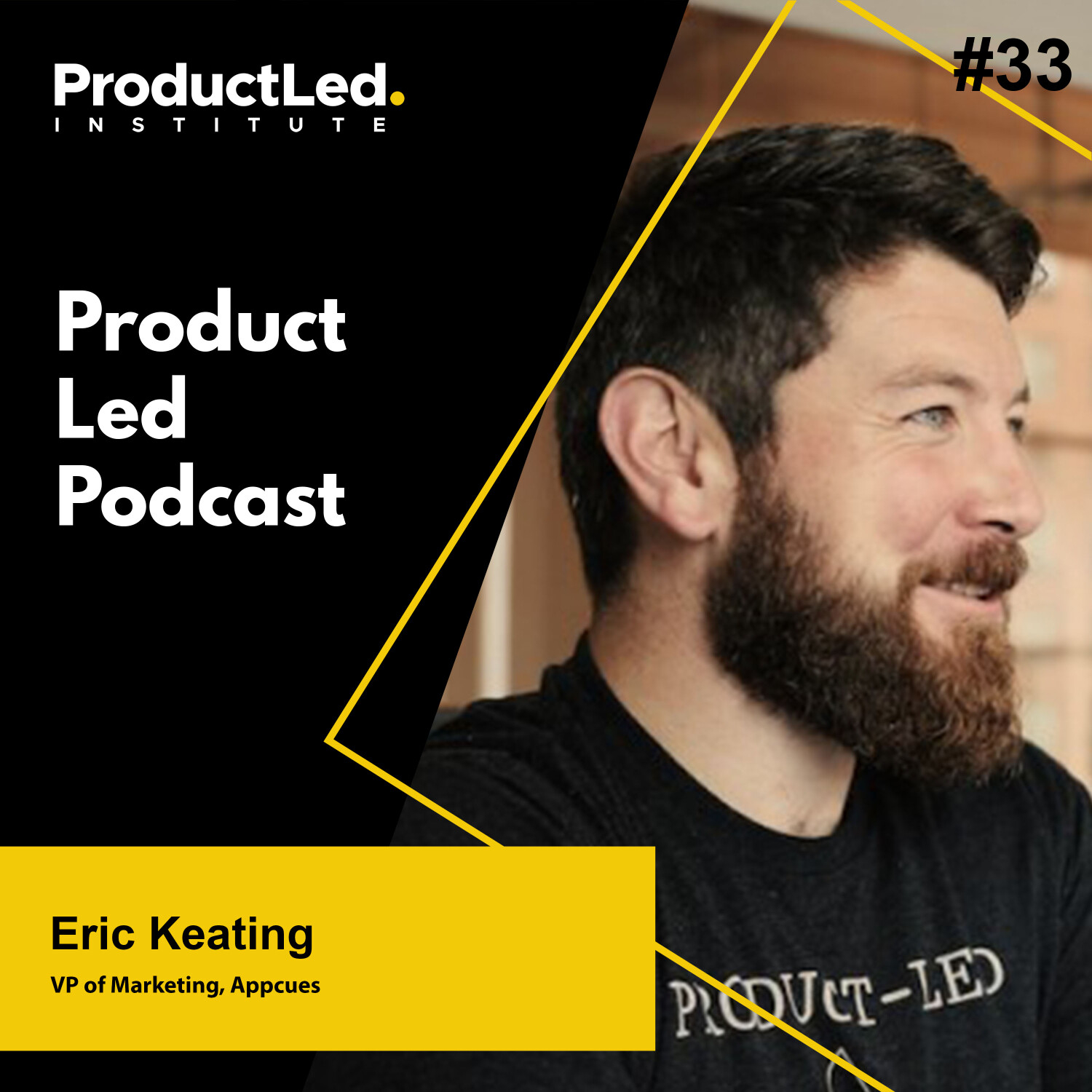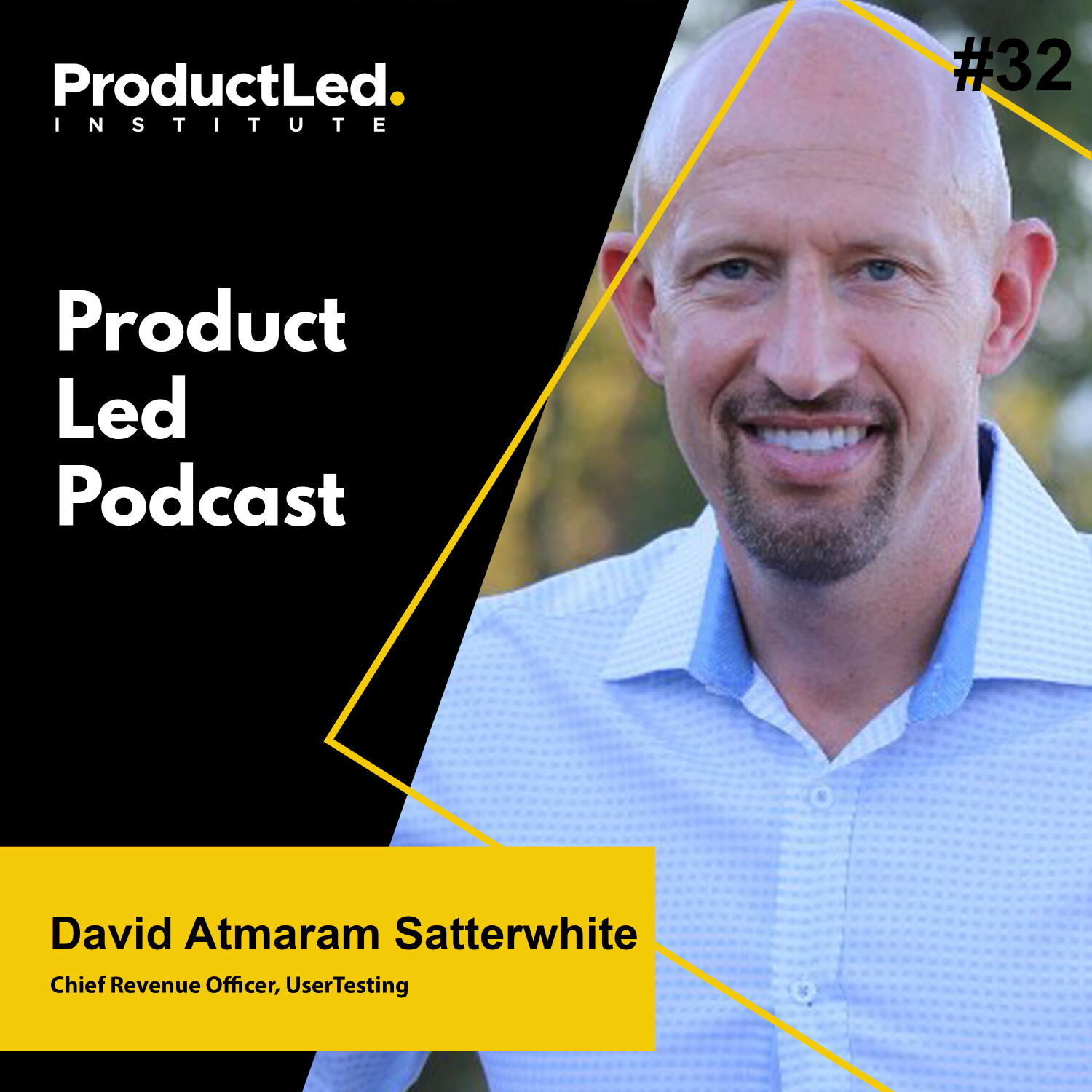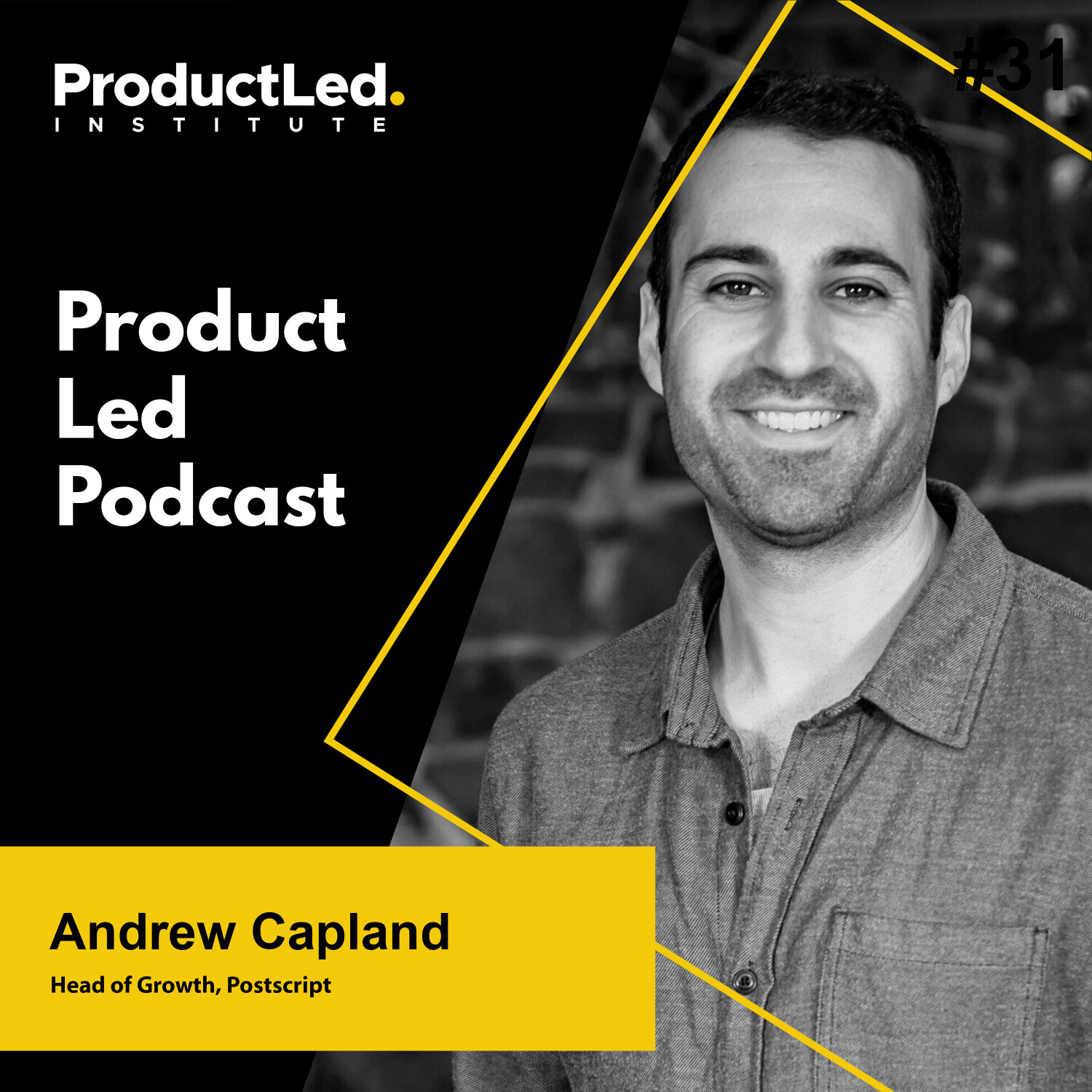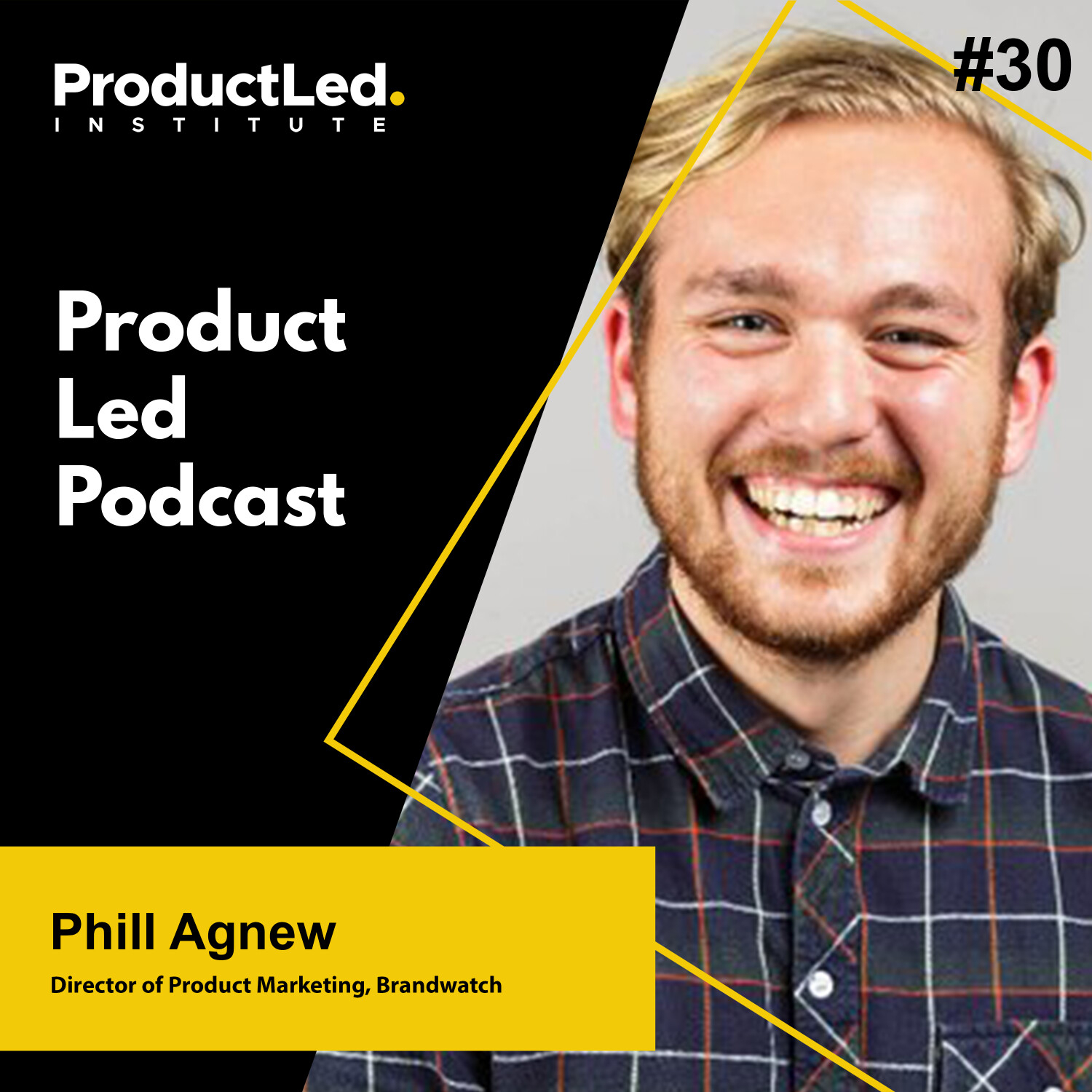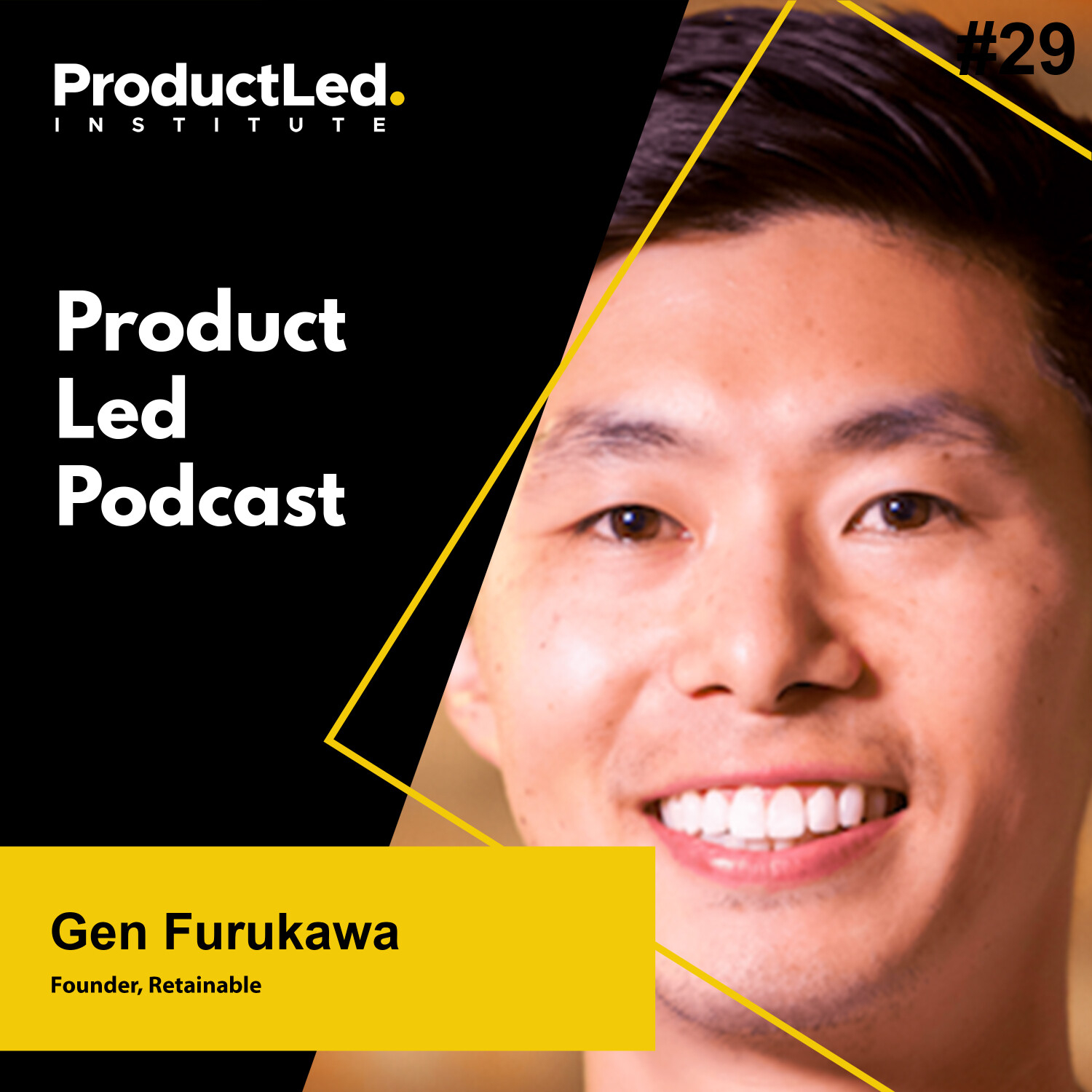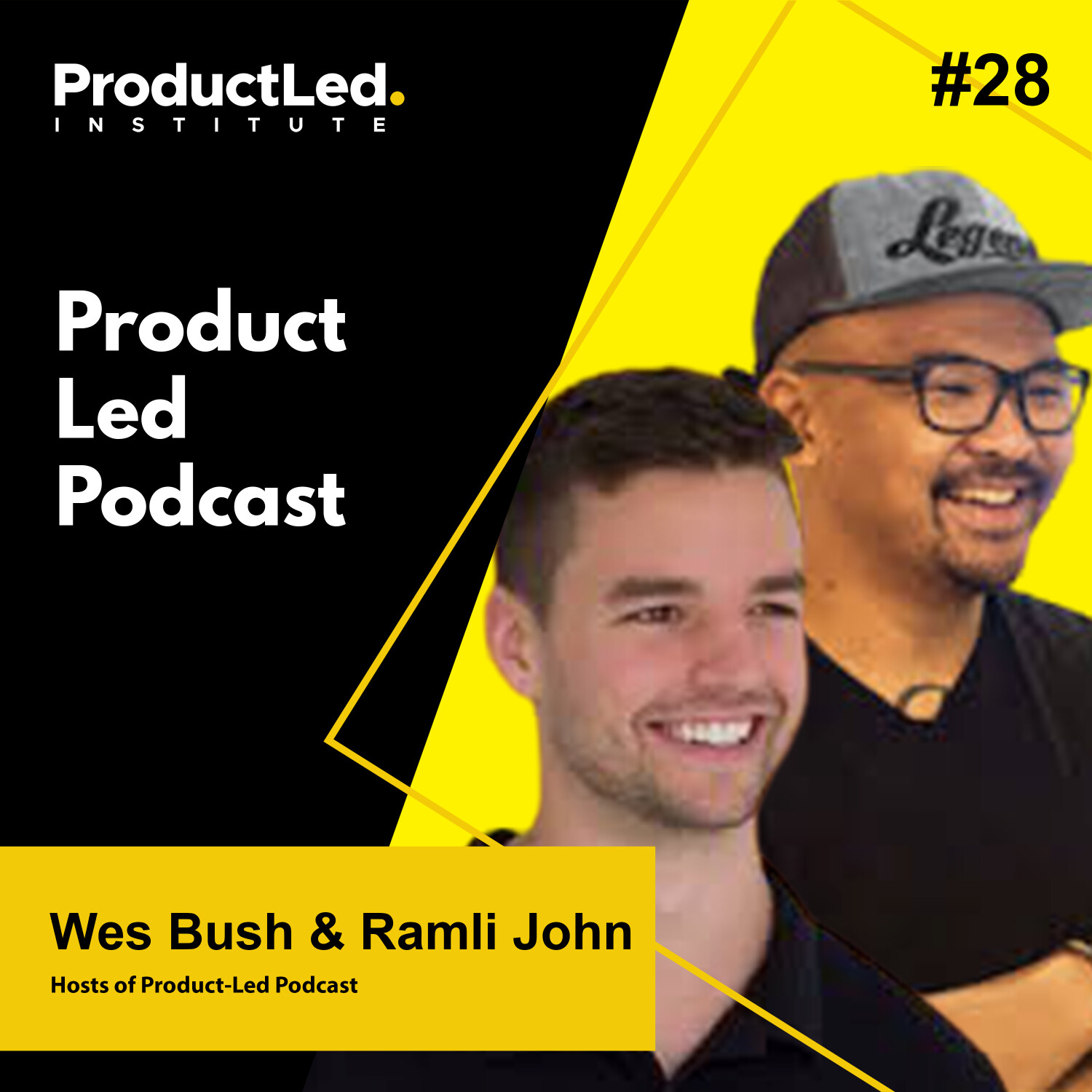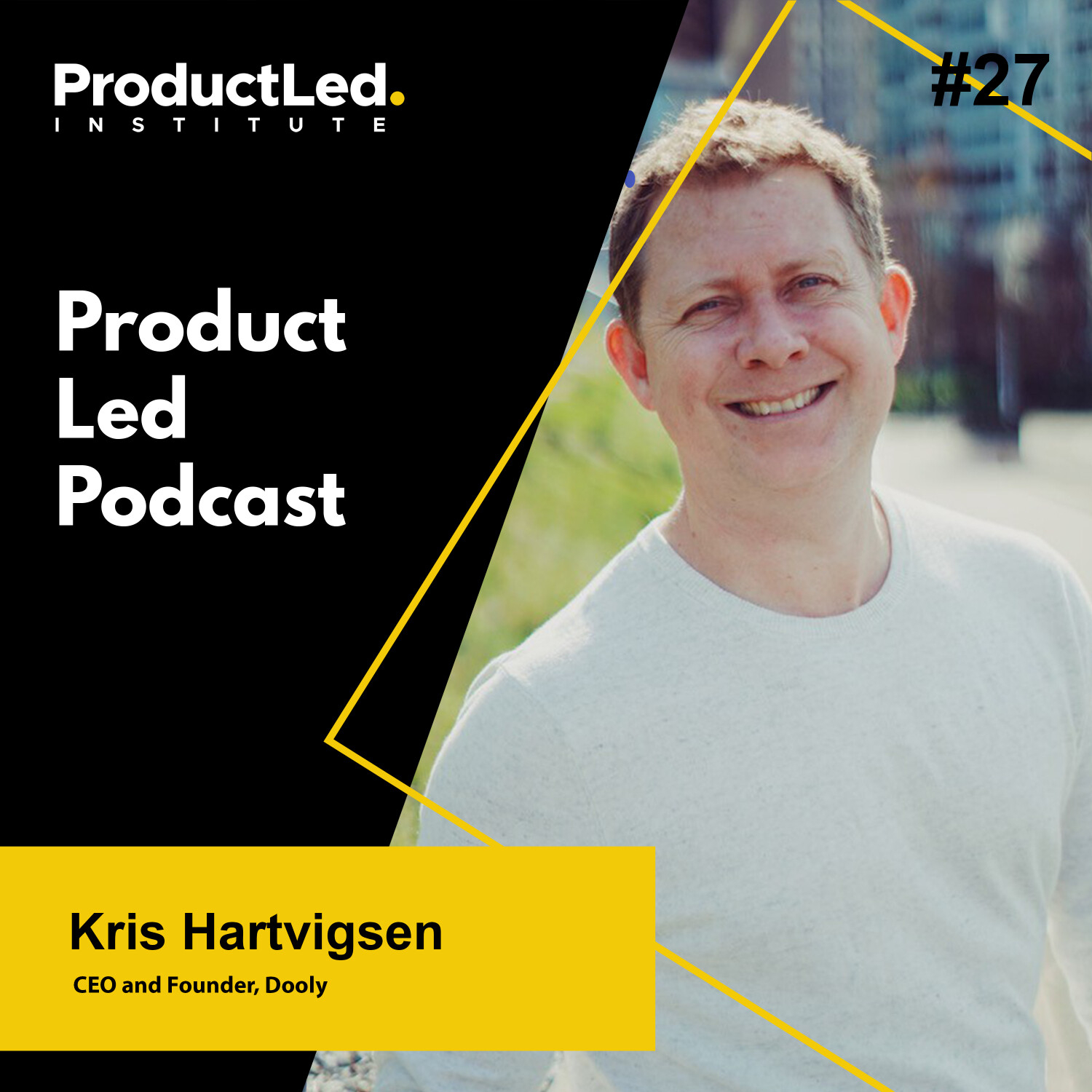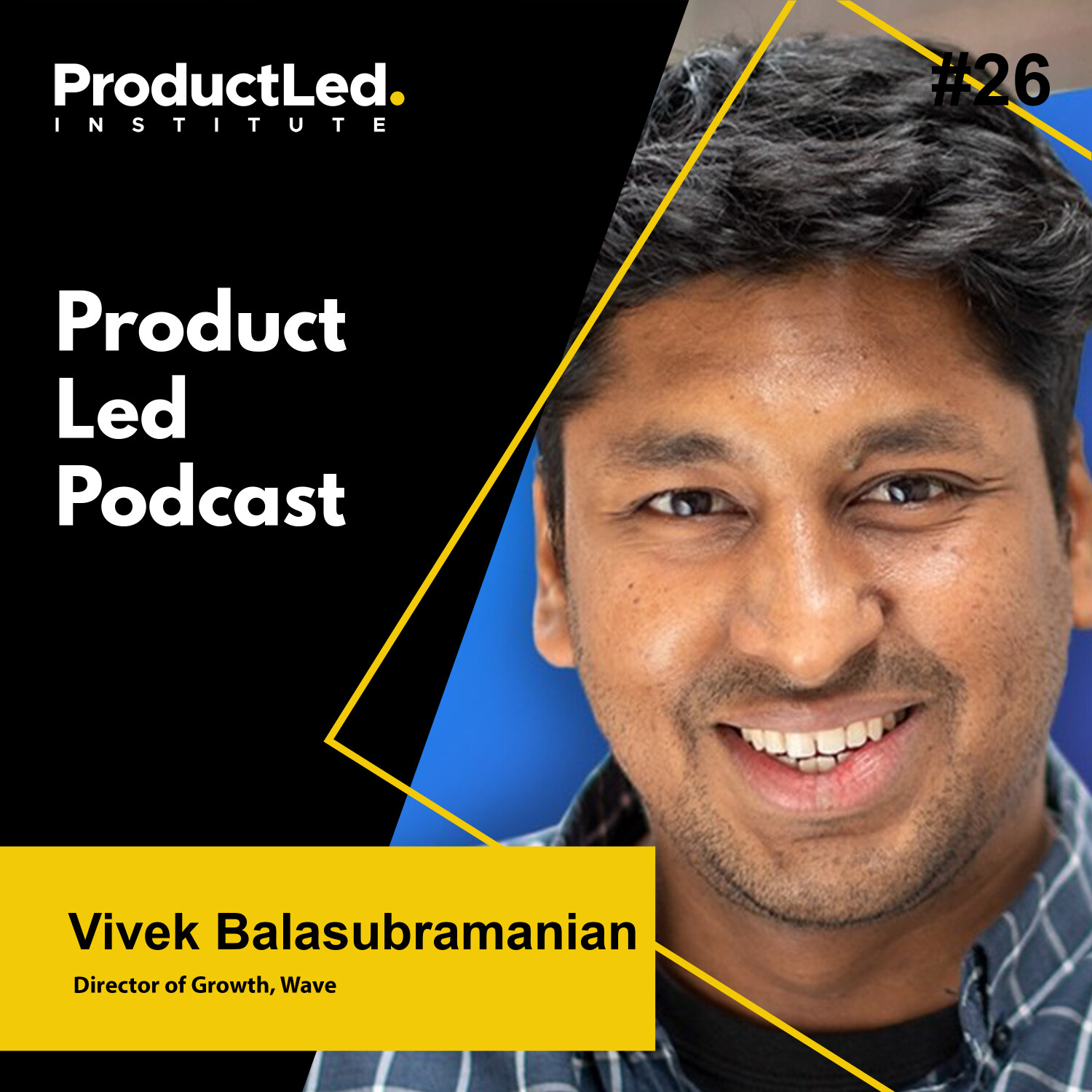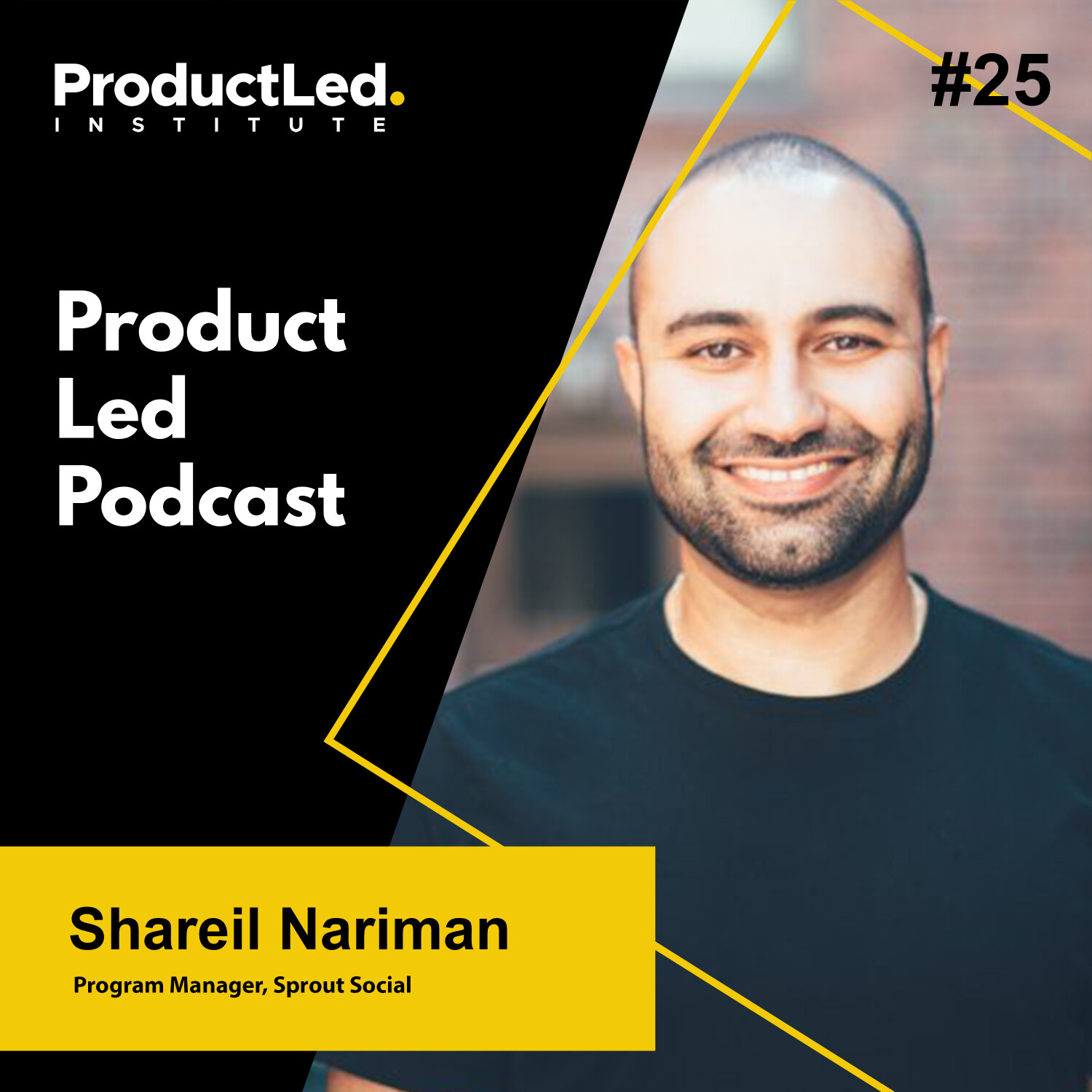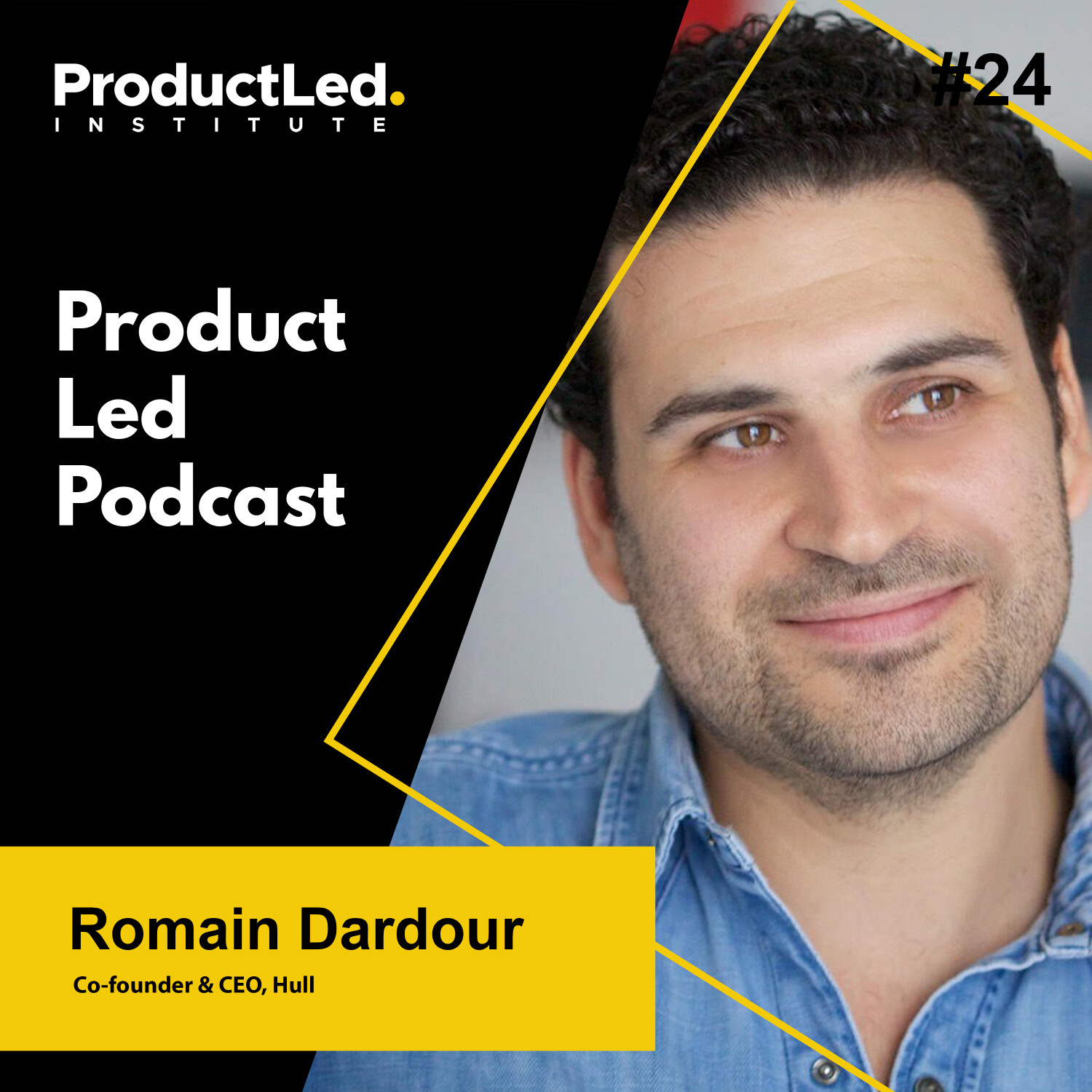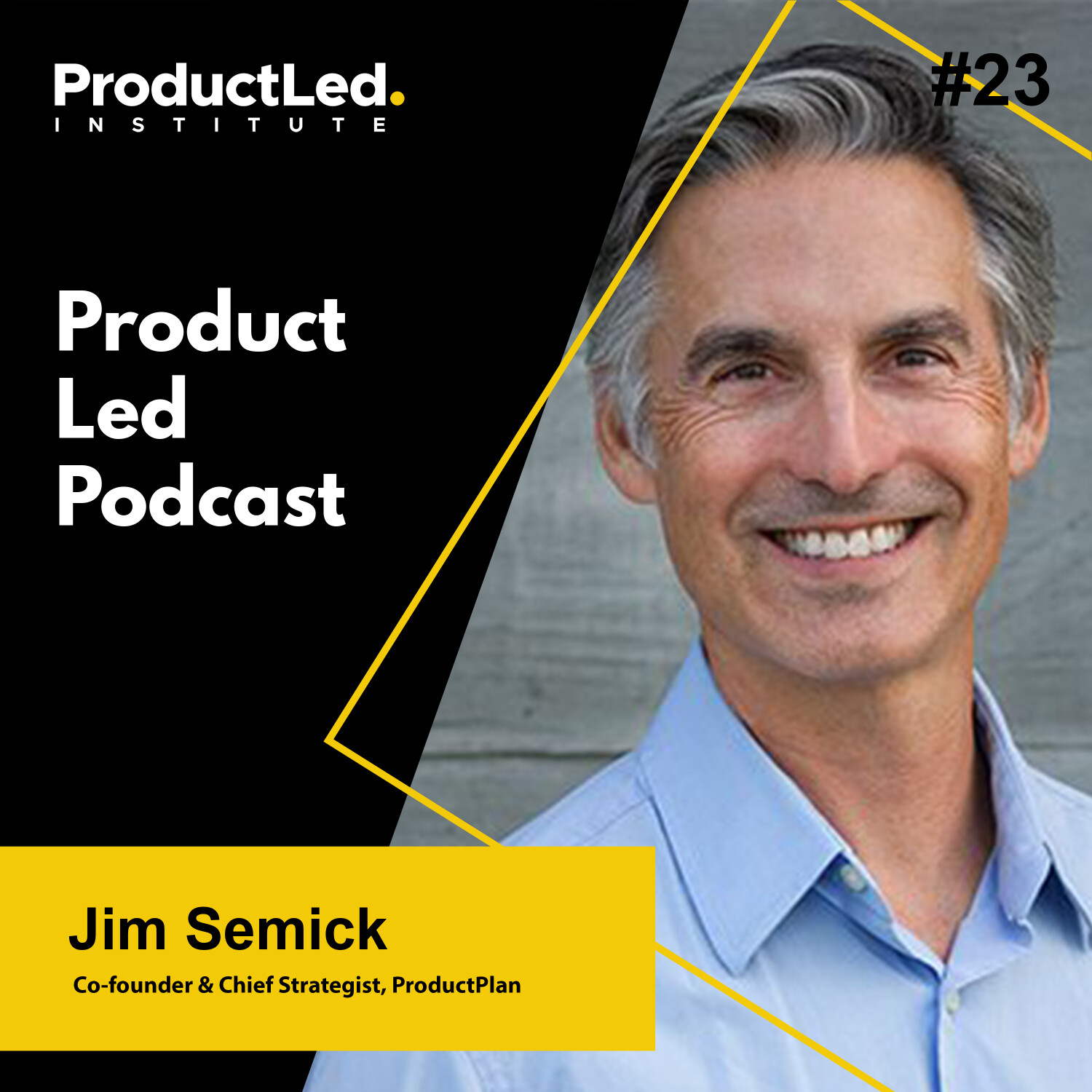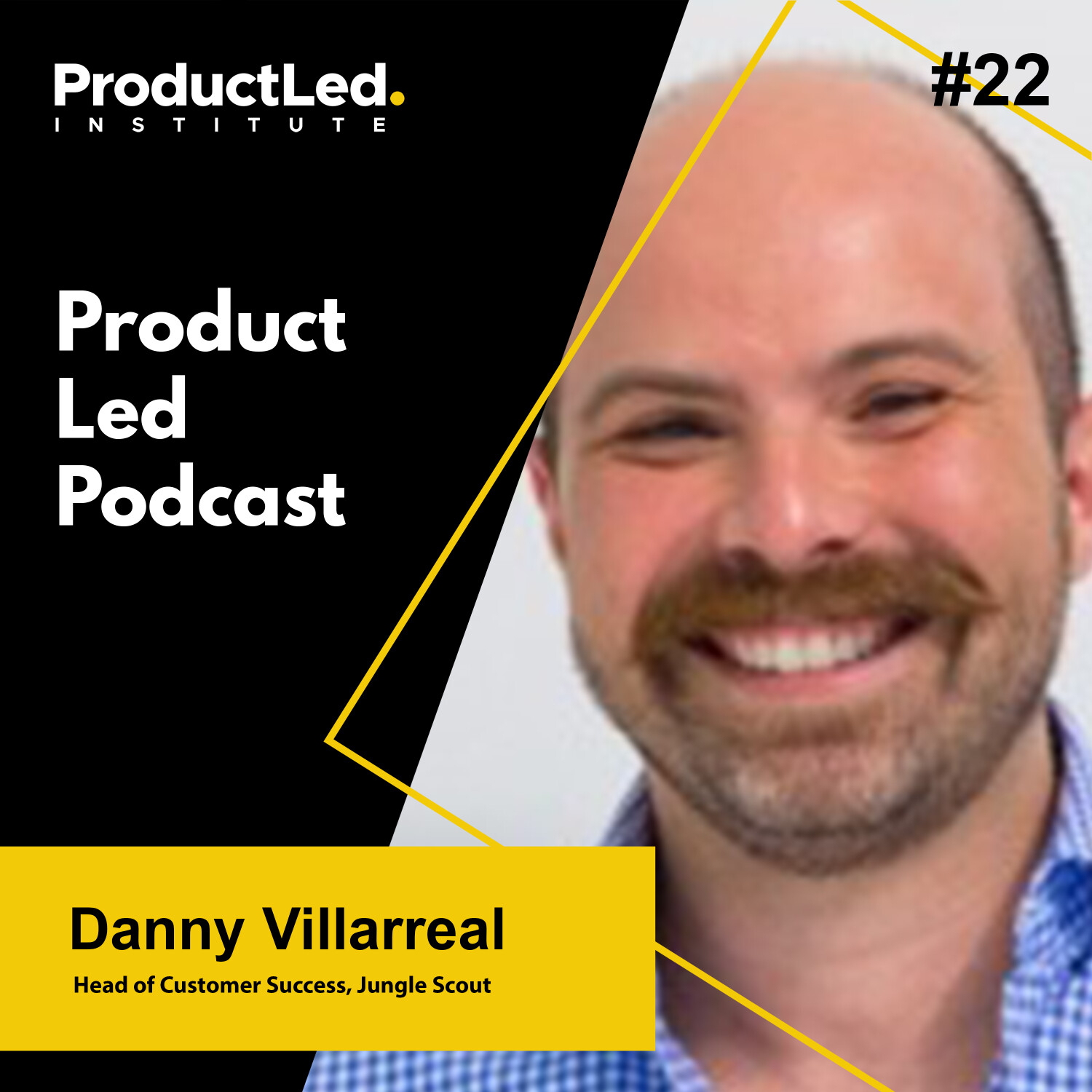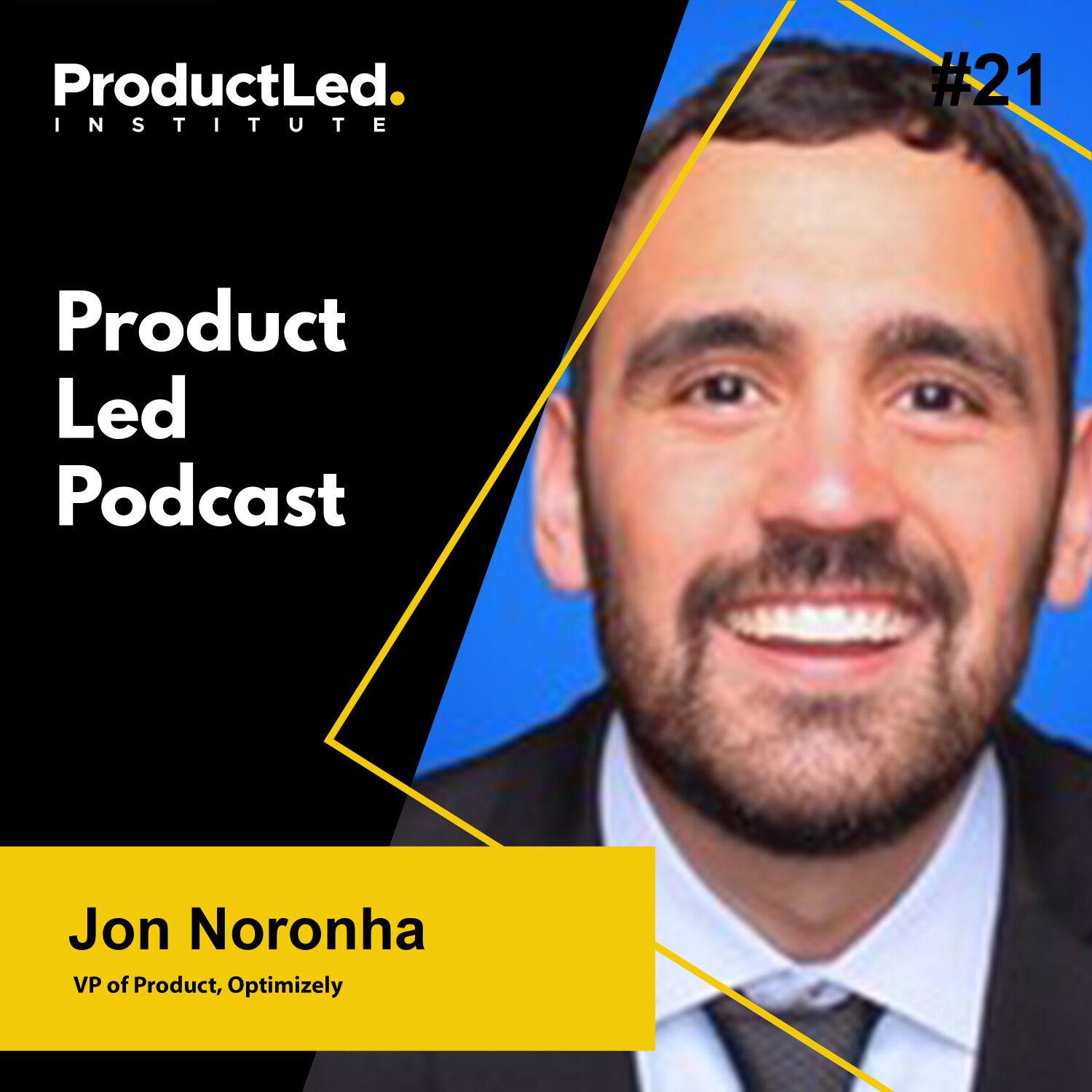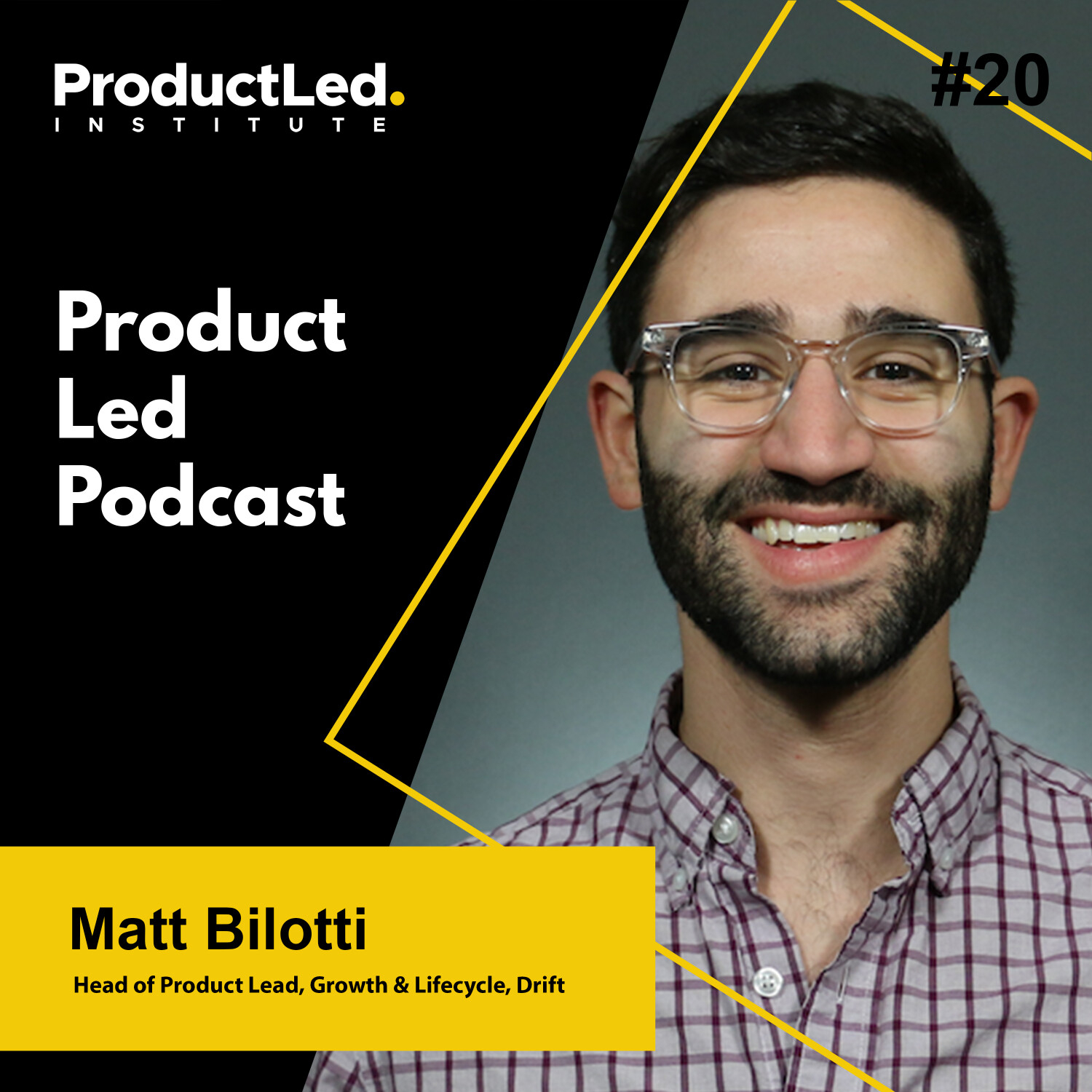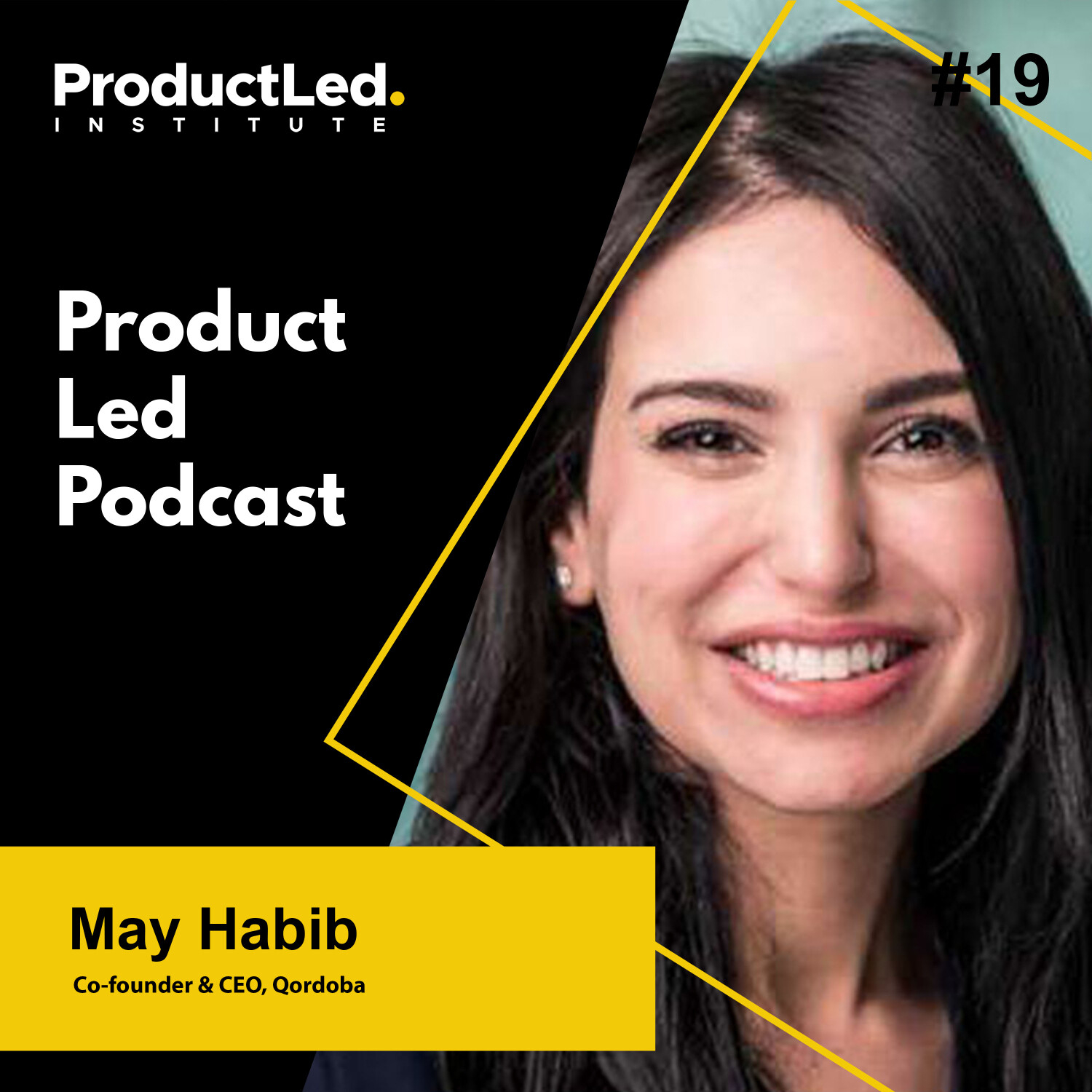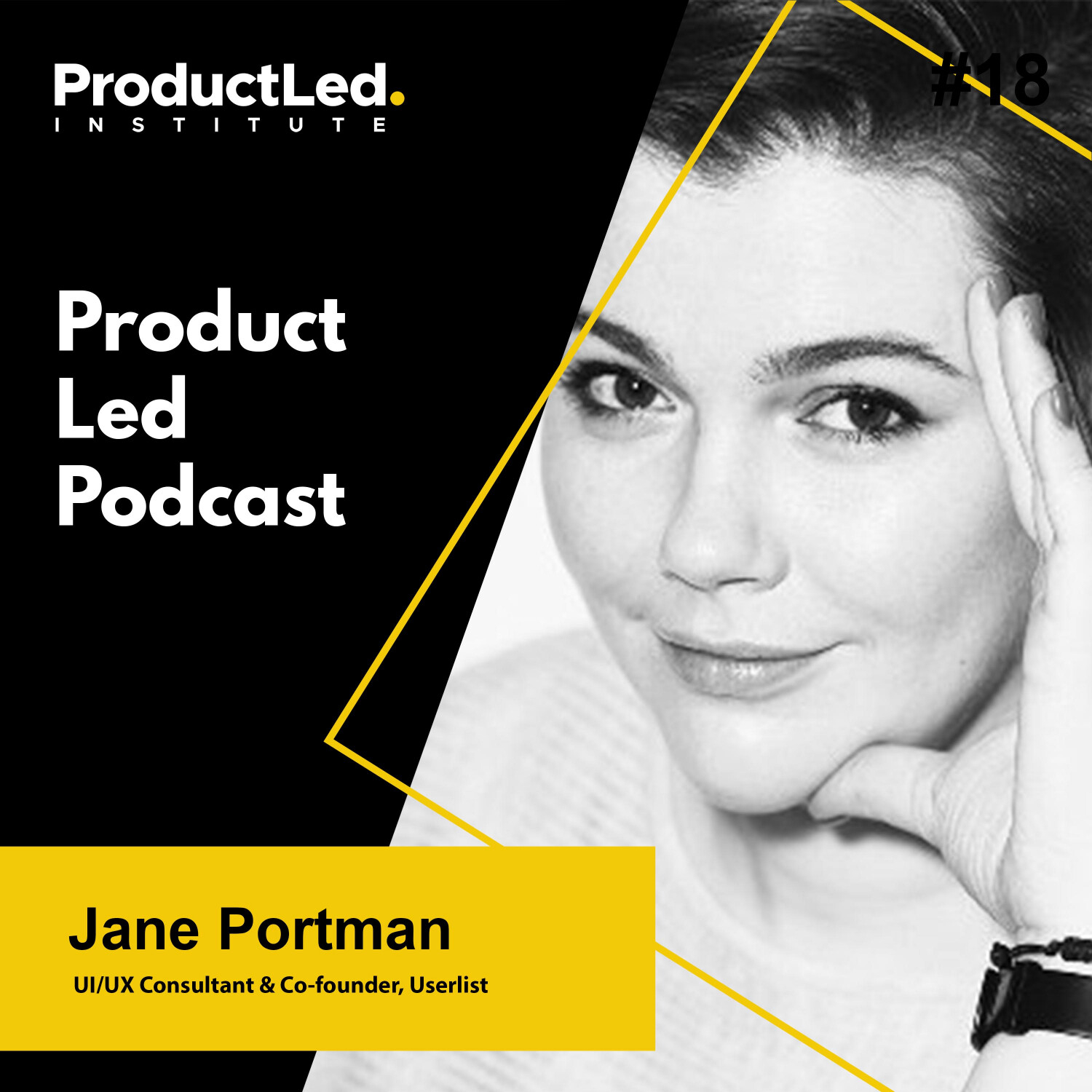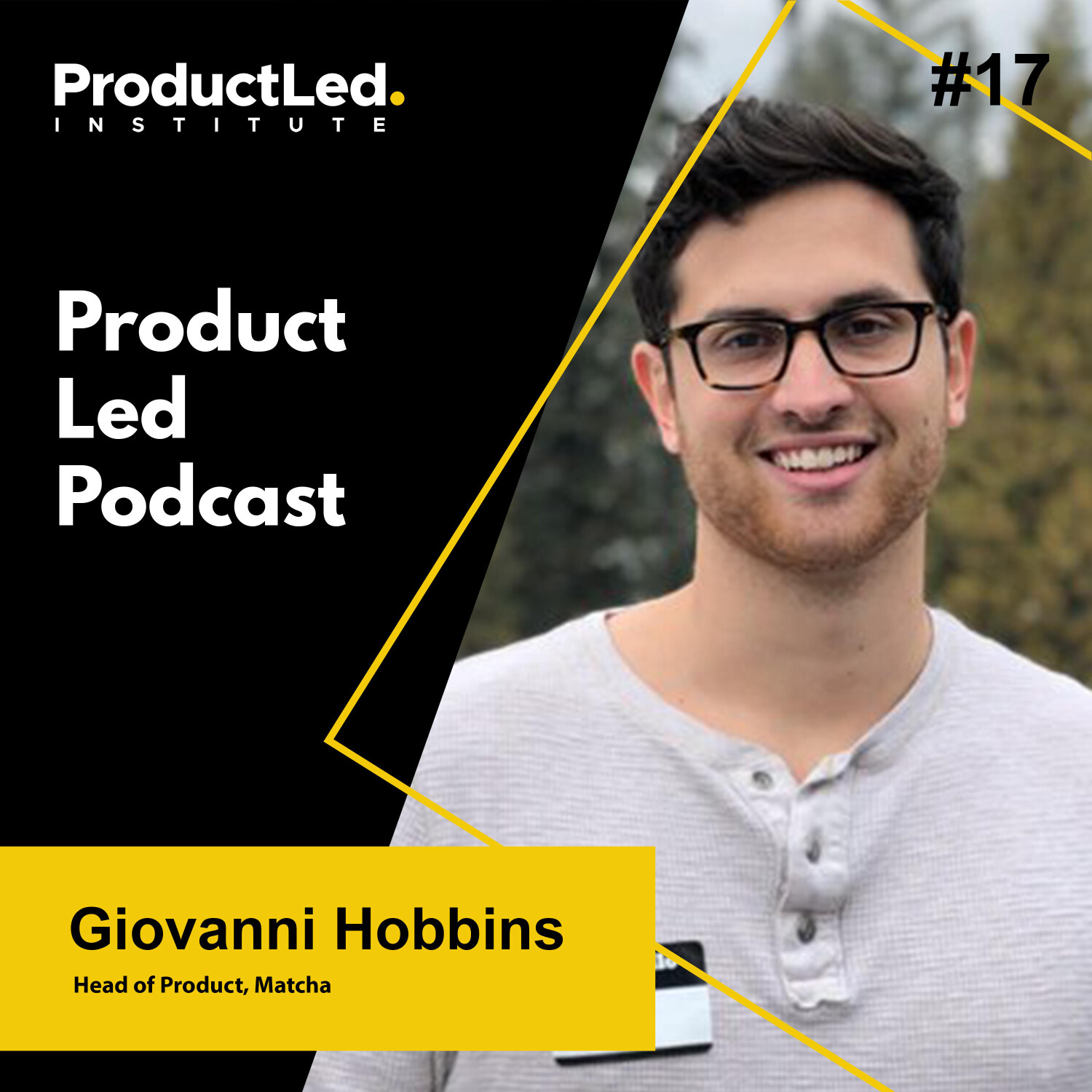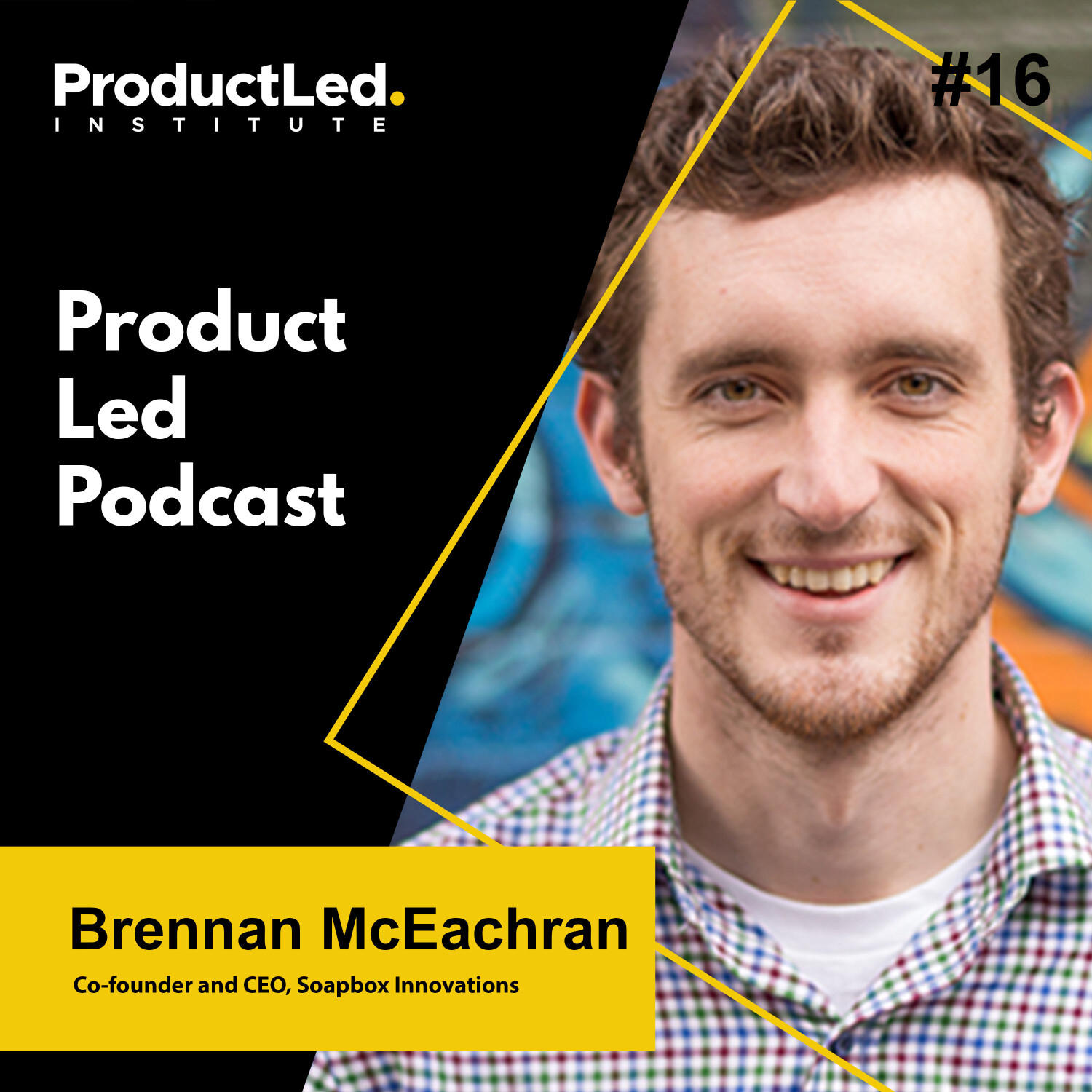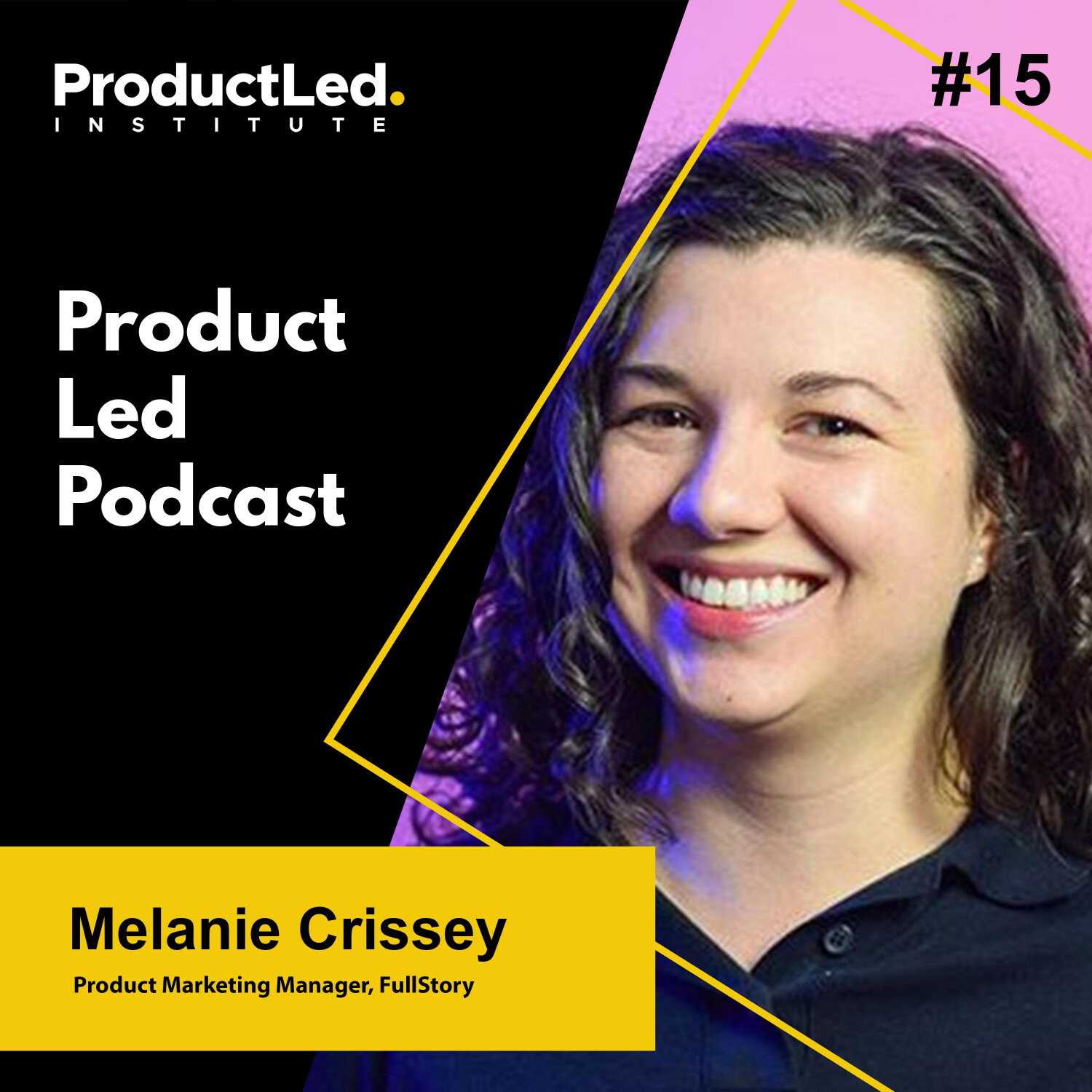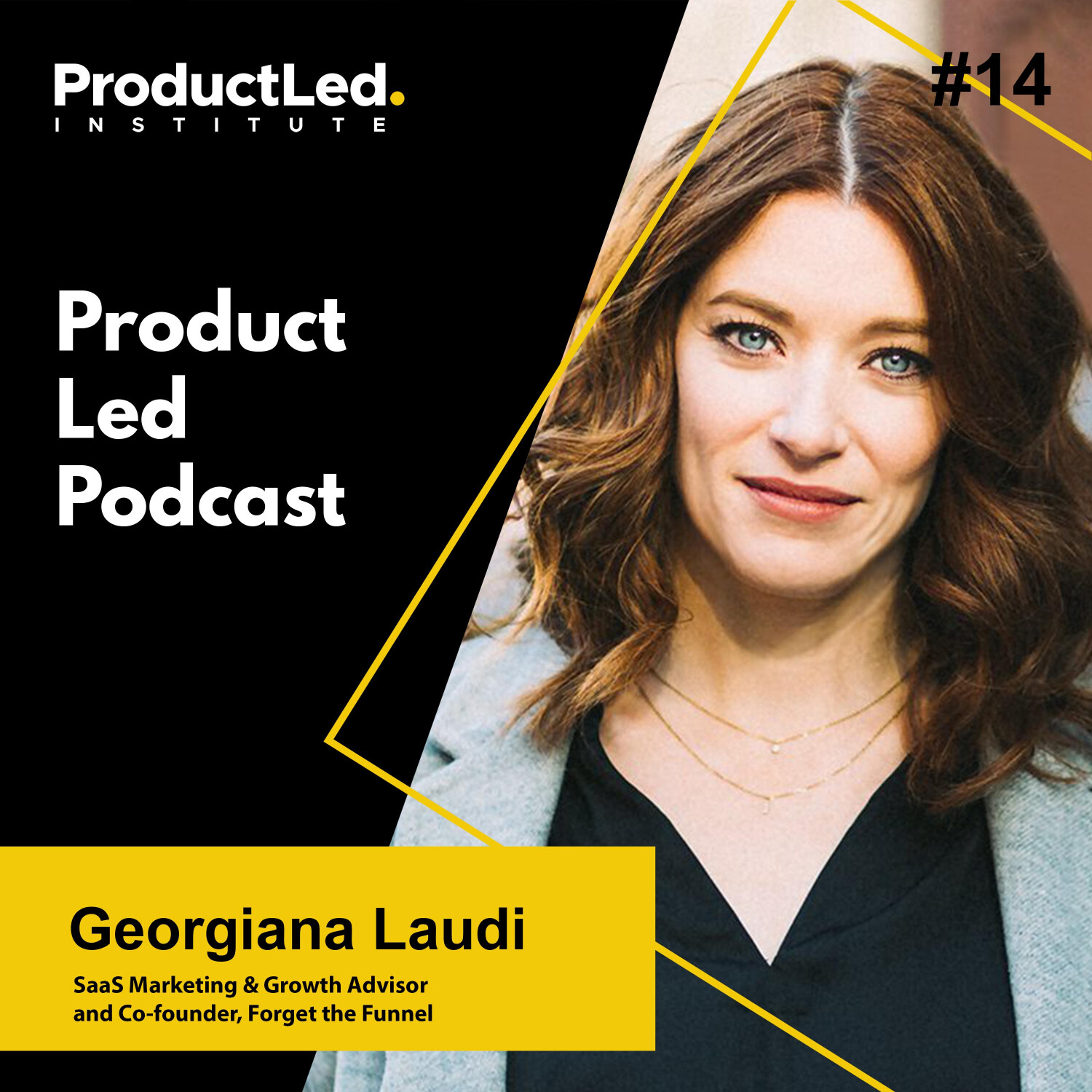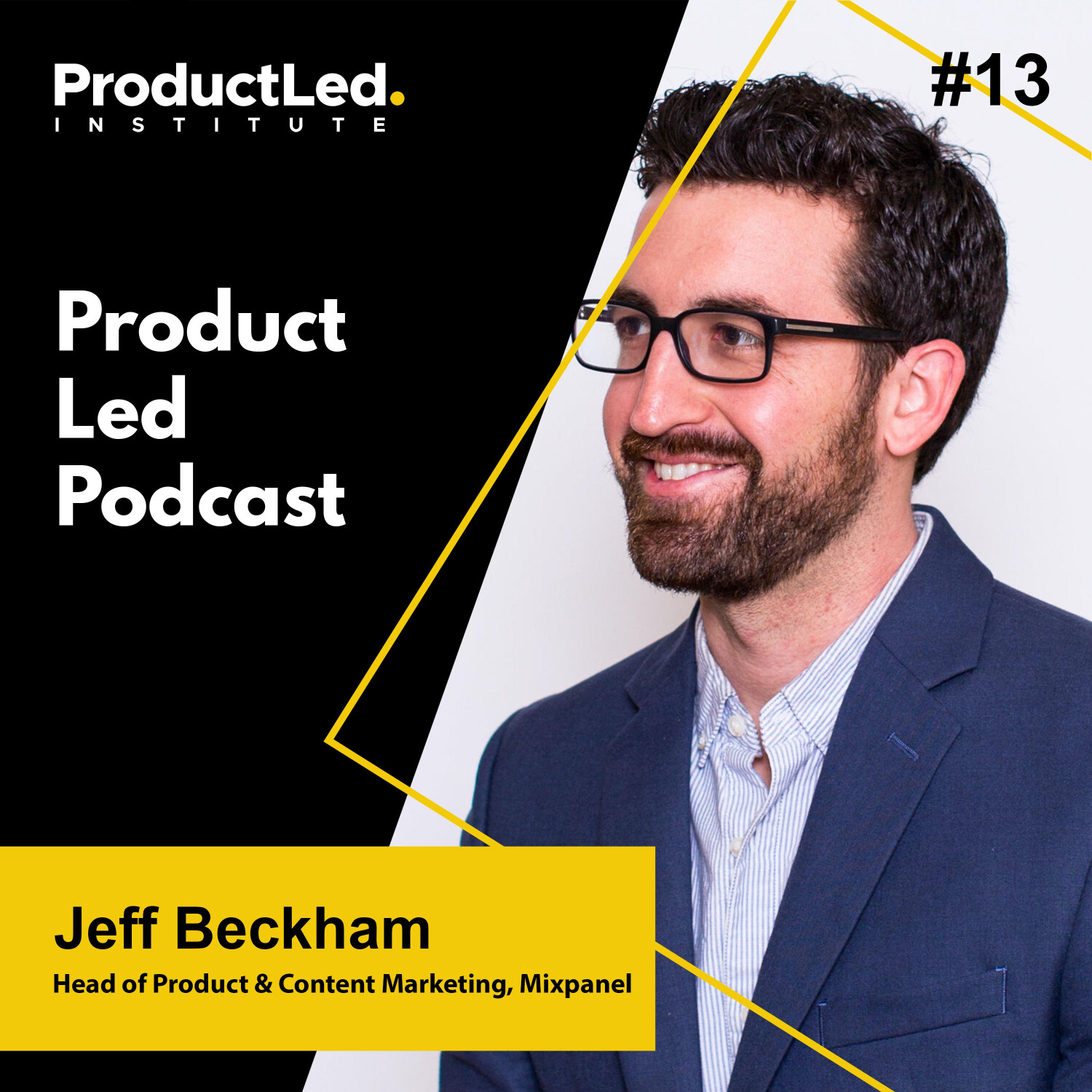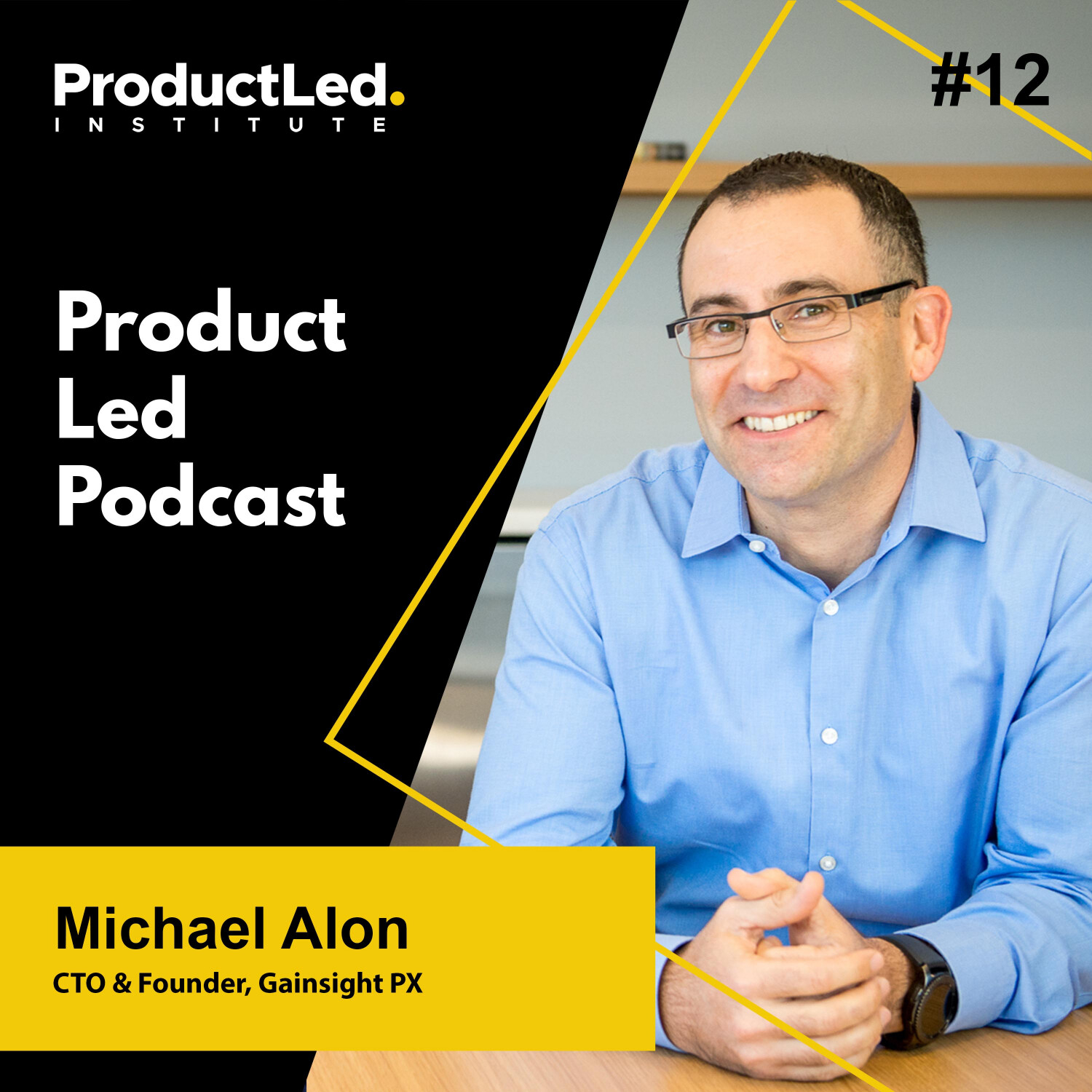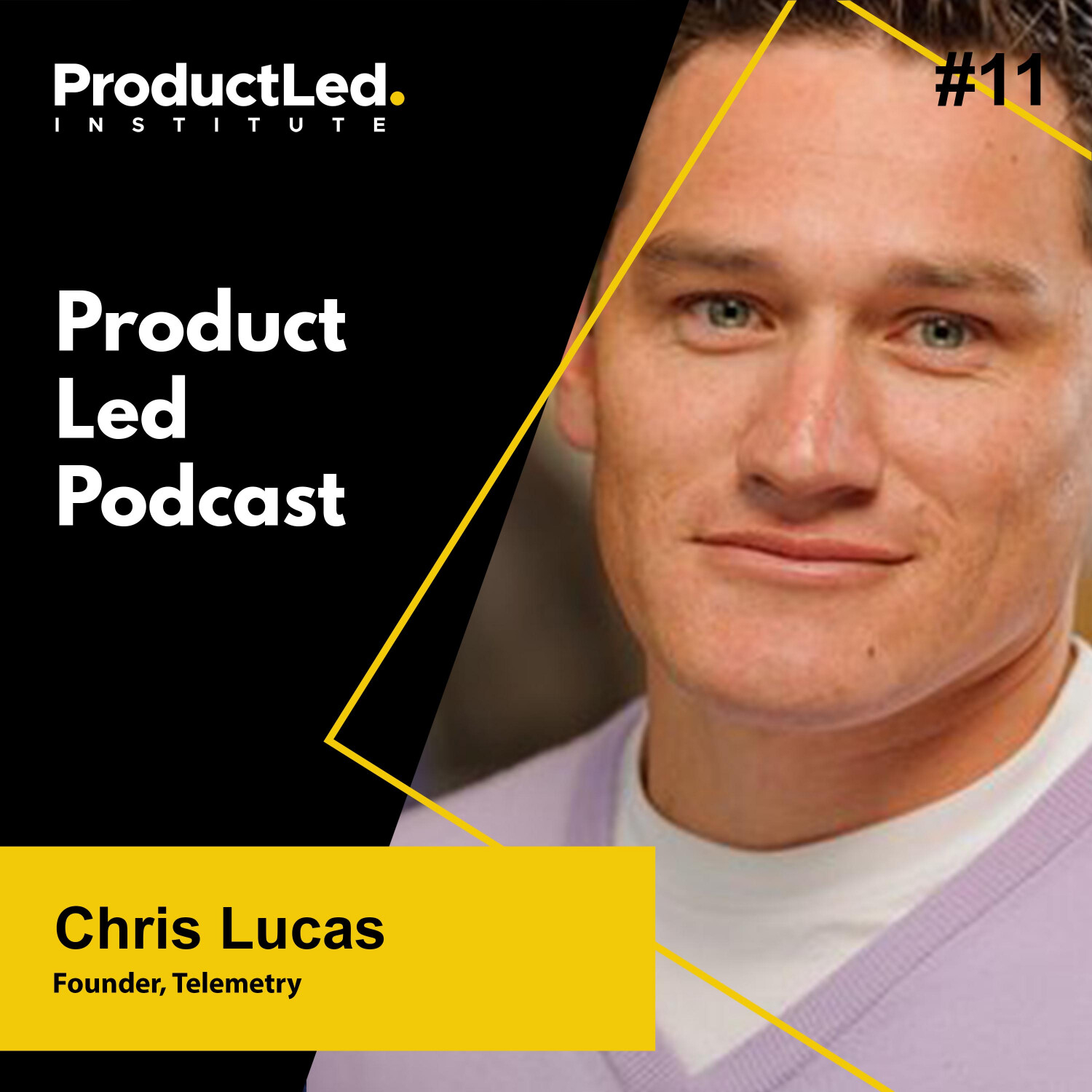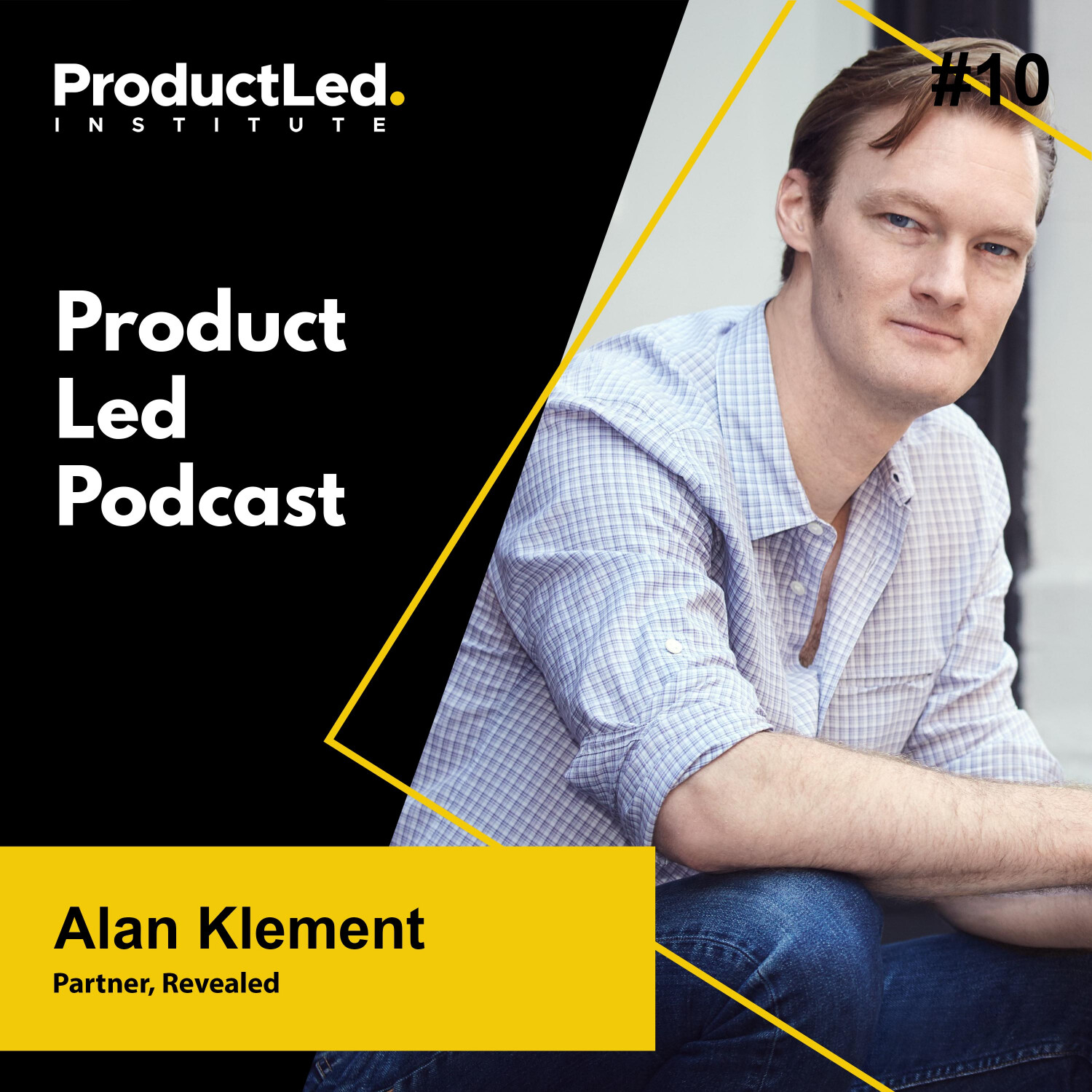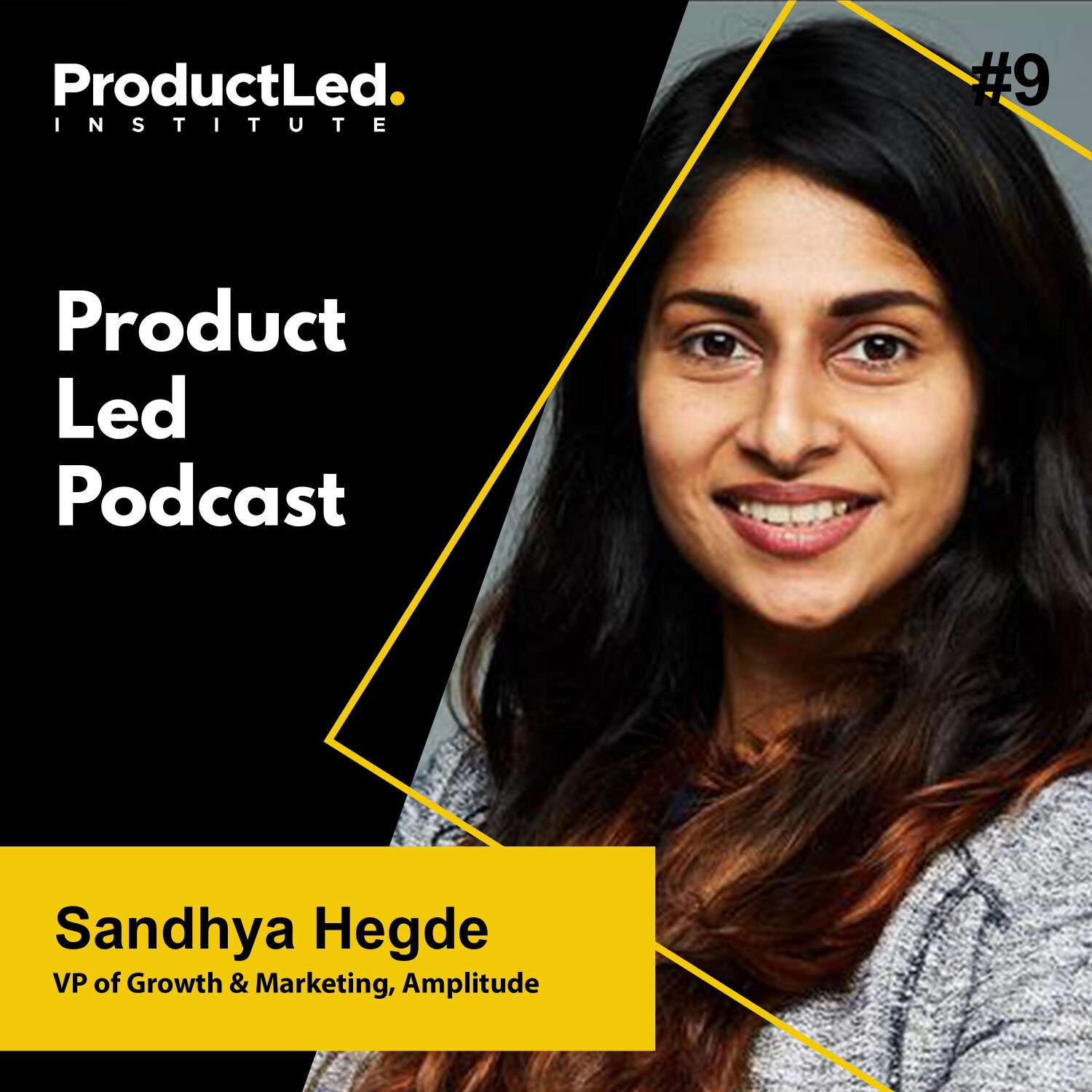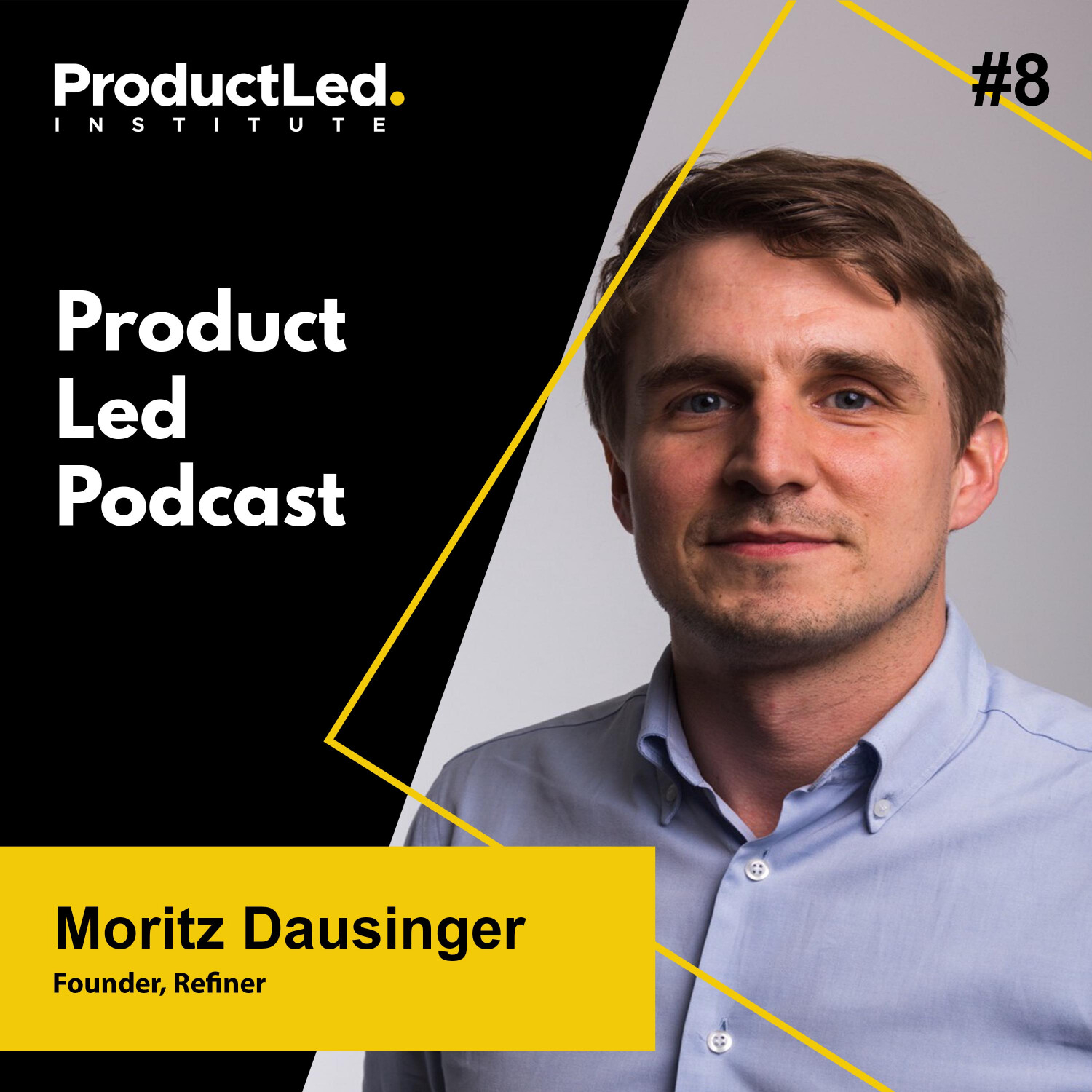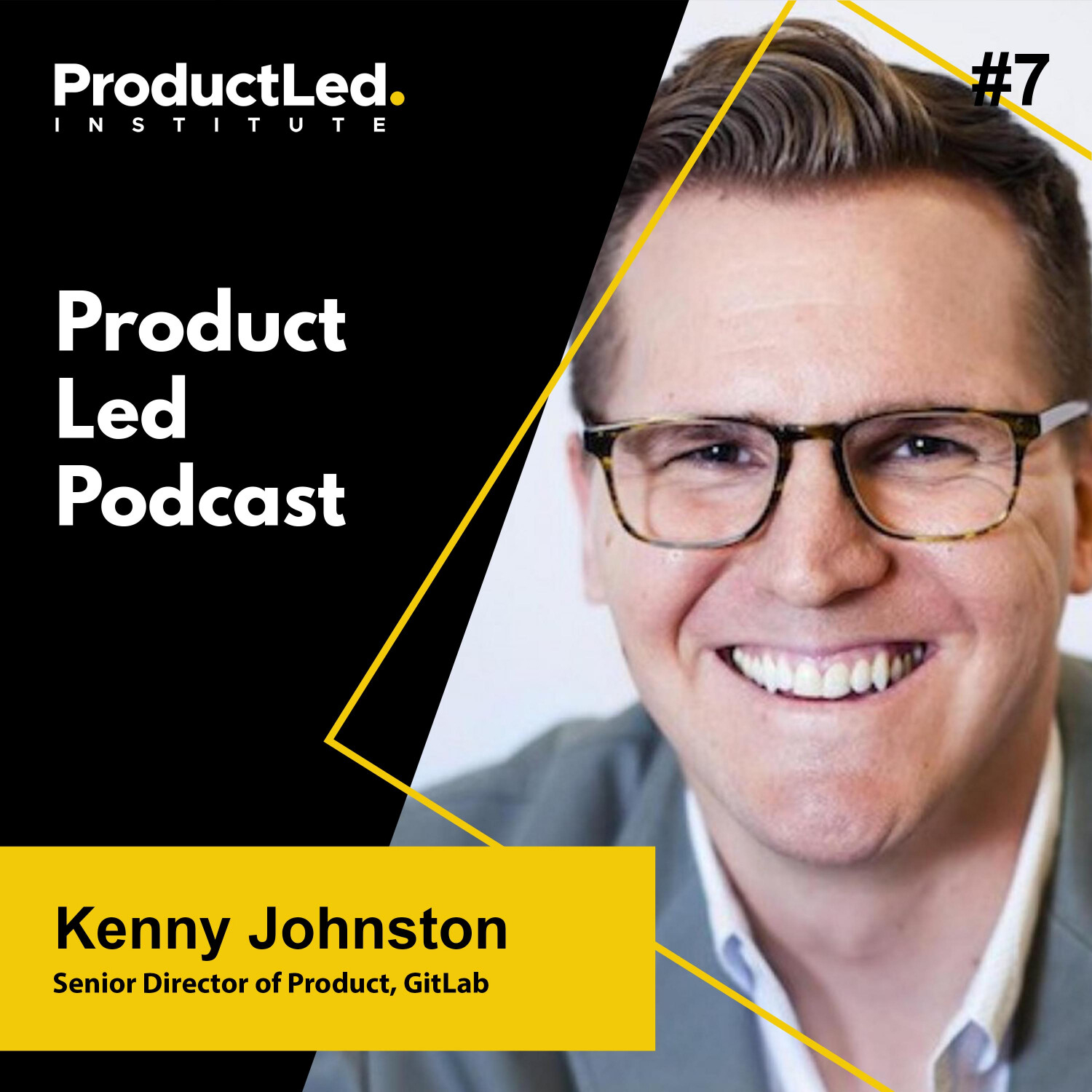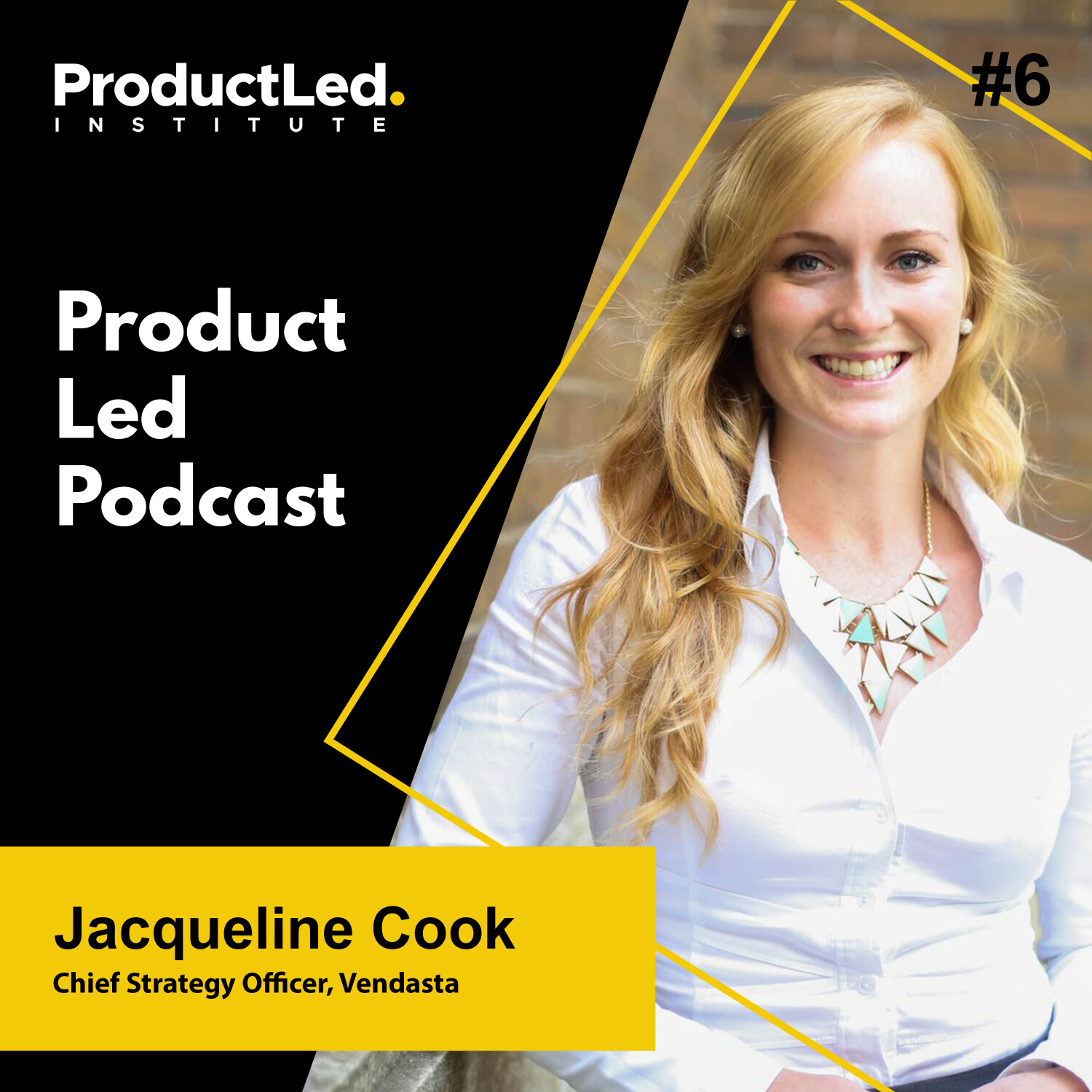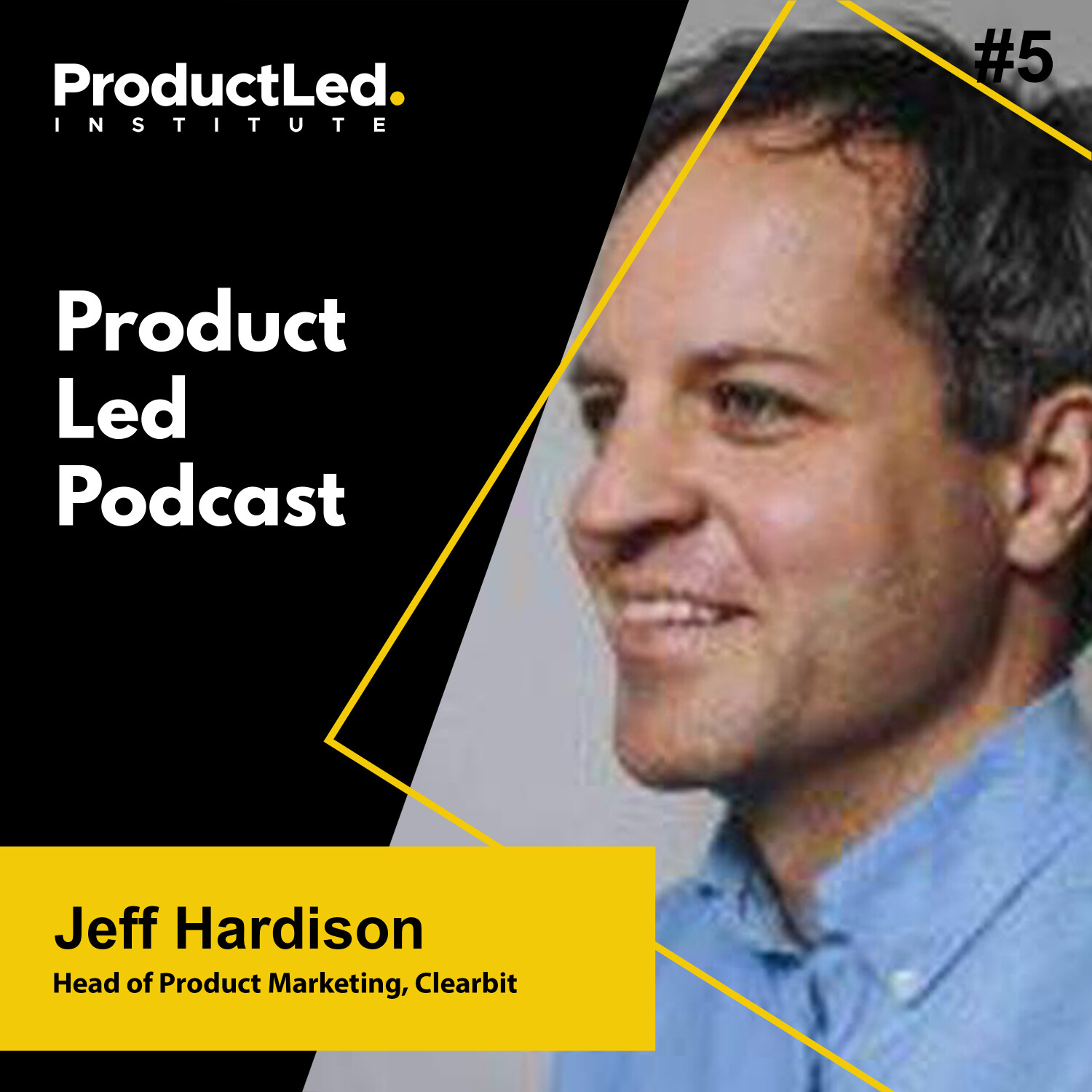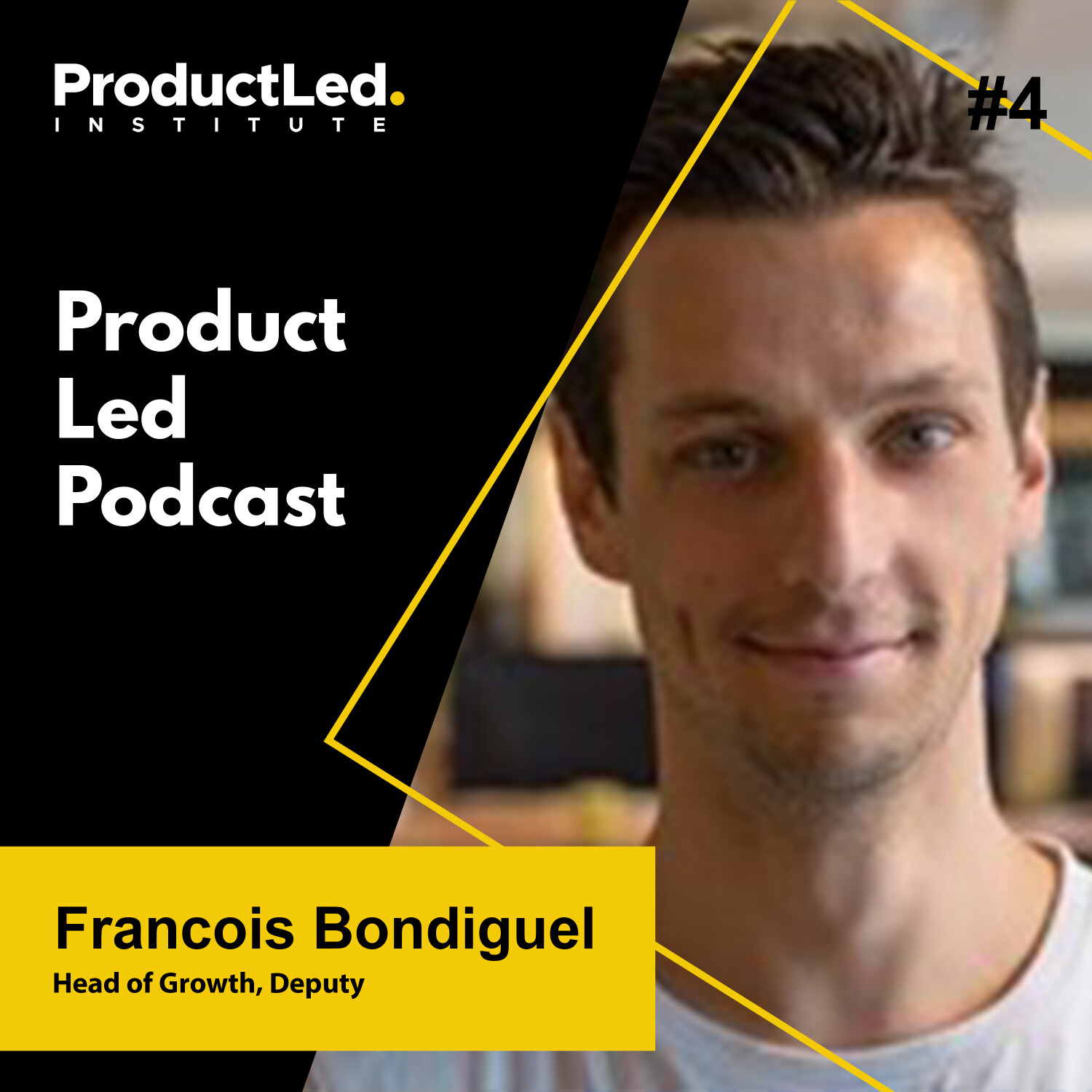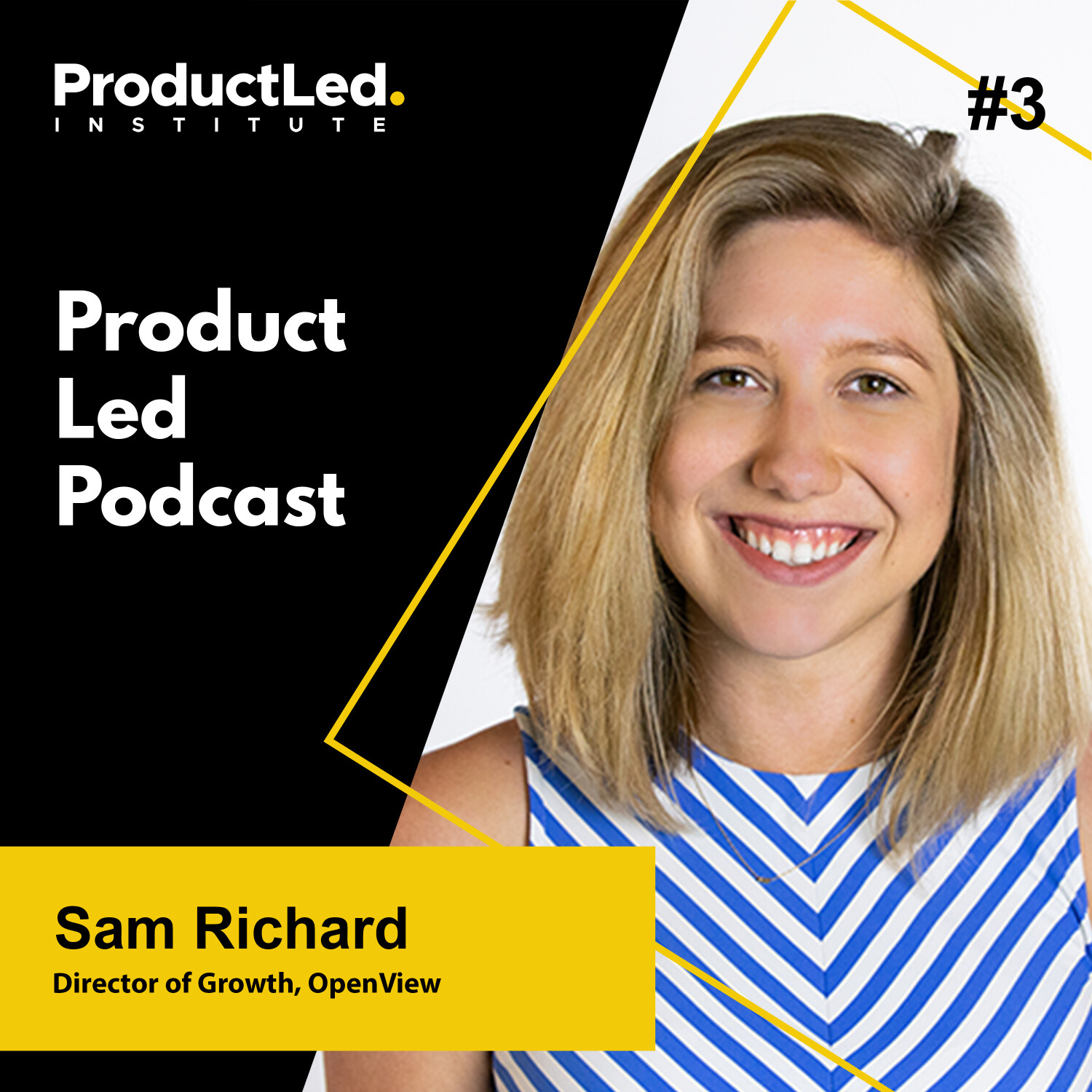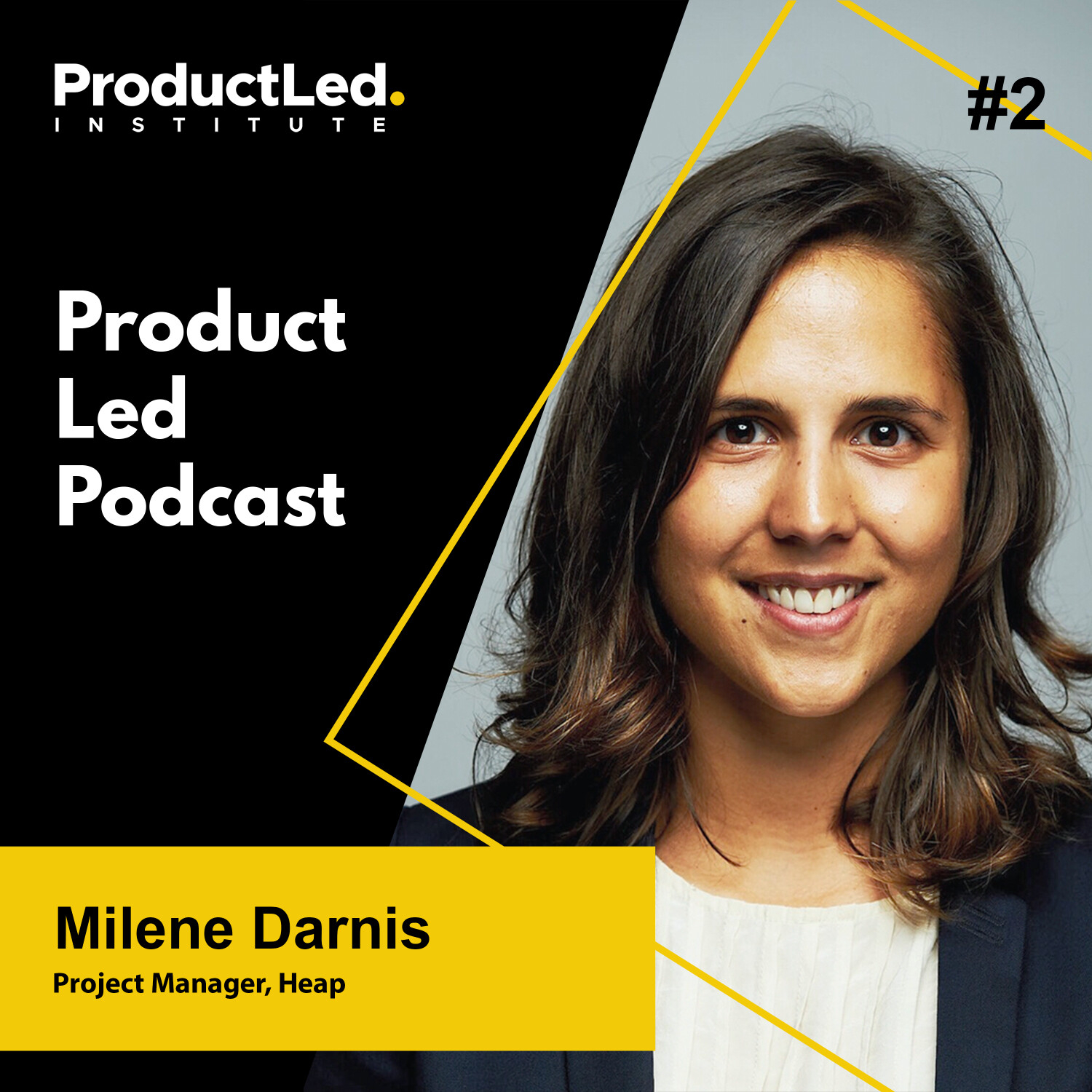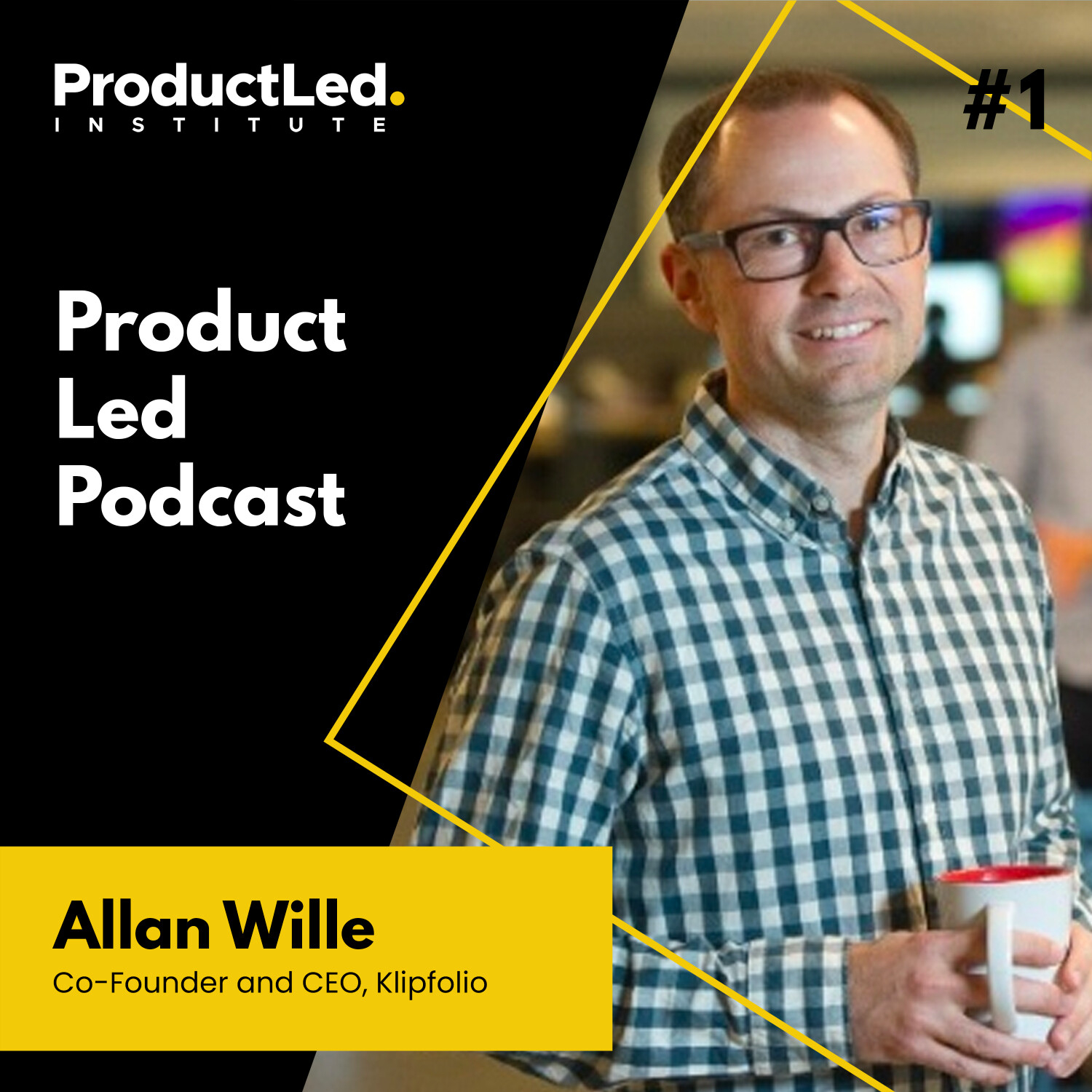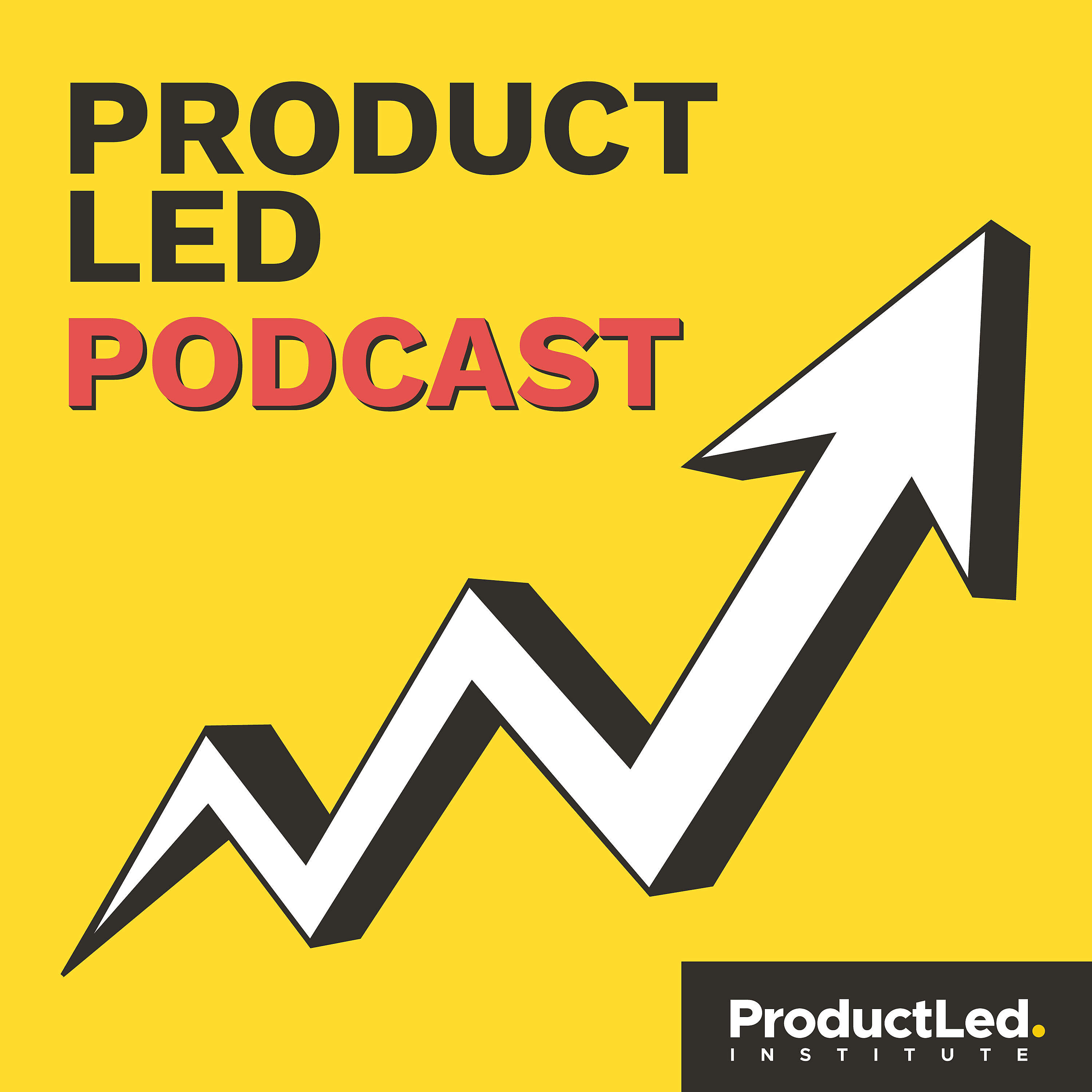Product-Led Podcast
The Product-Led Podcast is a weekly interview series with both product-led growth leaders and practitioners who have real knowledge to share on what it takes to use their product to grow a business.
David Rostan is Head of Revenue (Sales & Marketing) at Stonly in New York. Stonly is a company that created a unique widget to build interactive guides to lead clients’ customers to activation, issue resolution, and success on their terms. He has previously worked with fascinating product-led companies such as Calendly as VP for sales and marketing and Dashly as Head of organic and product marketing. These companies are known for effectively scaling that improved their onboarding experiences. In this episode, David will talk about the topic at hand -- how to use customer intent to build product onboarding that scales.
Show Notes
[01:19] How David got fascinated in customer intent and product onboarding and scales
[03:45] The importance of tailoring onboarding for different user intent for him
[05:51] His view on the differences of customer intent at different stages
[07:59] What customer intent is for him
[10:59] On ‘asking’ as the first step to meaningfully understand customer intent
[14:39] On testing and seeing what resonates as the second step
[17:27] On identifying the pattern, replicate successes, and observe as the last steps
[23:13] What he does best to scale the business right now
[26:23] His favorite companies using user intent
[29:12] What intent signals he looks for to ensure success for clients
[31:36] The results of the experiments he had on user intent to scale onboarding
[35:27] On how to further use customer intent to scale and deliver superb onboarding experiences
[37:53] Ways on building the empathy muscle for him
[40:26] Where to find out more about David
About David Rostan
David Rostan is a marketing bigshot with a track record of starting up and expanding mobile products and applications on the web in Fortune 100 and start-up environments. He has outstanding experience in leading all aspects of marketing strategy, such as but not limited to customer acquisition, product innovation, customer research, branding, and data analytics, to accomplish business objectives. He has accomplished so much as an entrepreneur. He has launched 3 SaaS applications and grew them via online and offline sales and marketing channels. He specializes in the following fields: digital marketing and strategy, customer acquisition and channel prioritization, customer development and market research, technology innovation and product management, team building or hiring, strategic planning (OKRs), and leadership.
Profile
Mario Araujo is the current Director of Product Growth at OutSystems. The company is a complete full-stack application development platform that allows users to rapidly create and deploy critical applications that evolve with its business. He has been with OutSystems since 2005 and has gradually climbed up the ladder of success in the company. As the lead of Product Growth, he plays a vital role in connecting with customers for insight and feedback. Mario will dig deep into creating a product-led movement inside a sales-led company in this episode.
Show Notes
[01:13] What Outsystem does and Mario’s essential role in Product Growth
[04:15] His thought process in improving the way of doing things in OutSystems
[06:45] How he managed to sell the idea and motivate people all together
[09:27] His thoughts looking back to the free version of OutSystems
[12:50] What he did after getting the buy-in from the CEO
[13:30] The importance of looking at the data to prioritize issues to resolve
[16:23] The risks he thinks about in transitioning
[20:28] How he relayed the risks and opportunities to people in the company
[25:38] How he managed to get dedication on the motion internally and how it worked
[33:44] What he could have done differently reckoning the mistakes in the past
[39:04] Where to find more information on Mario
About Mario Araujo
Mario Araujo is a software engineer who has worked in various prestigious companies before OutSystems, such as Siemens. He started as a consultant on the Professional Services in 2005 and climbed up the company’s ladder until he got the opportunity to be the Director of Product Growth in 2019. Mario has also taught in some universities in Portugal, handling the subject of Software Development Methodologies. He is passionate about software, product strategy, product marketing, and growth.
Profile
Matheus Mello is the Growth and Product Manager at Productboard, a product management system that helps product managers understand what customers need, prioritize what to build next, and rally everyone around the roadmap. In this episode, Matheus will talk about Product-Led experimentation -- running Product-Led experiments in your company through having a clearly defined system. Furthermore, he will share seven worth-noting lessons from his five years of experience in doing Product-Led experimentations.
Show Notes
[02:15] What experiment Matheus finds most exciting and coolest
[05:53] What he thinks works and what does not in B2B that applies to B2C
[08:48] How he comes up with experimentation ideas
[12:32] The mistakes he thinks companies make in the context of growth experimentation
[16:27] His recommendations for companies on starting experimentation
[19:53] Going deep into how good friction is in improving onboarding conversion
[24:05] The importance of getting the whole organization involved in thinking about experimentations
[26:47] His bits of advice for companies on growth experimentation
[28:24] Where to find more about Matheus and Productboard
About Matheus Mello
Matheus Mello is a product management and growth professional who is passionate about building valuable and outcome-driven products. He has impressive experiences in leading growth and experimentation teams, B2B and B2C SaaS, CRO, activation, monetization, and retention. Matheus has accomplished so much in his career. Among these are: assisted organizations forge and grow marketing and product experimentation processes, he made generating more than 100Million dollars worth of Annual Recurring Revenue (ARR) possible with successful growth experiments, he made utility products the best performing the first-purchase category of Avast in 2018, and has product managed physical and digital products globally.
Profile
This show is memorable as Product-Led Podcast turns one! A great year of featuring world-class product leaders and learning how they grow their business through the product. Get excited as Ramli and Wes make this episode special in celebration of its first anniversary. With that, both will be sharing the Top Three big year-worth of learnings from the podcast. Listen until the end to know what surprise awaits the listeners as PLP’s way of saying thank you!
Show Notes
[01:21] Wes’ biggest takeaways around the podcast
[02:30] Ramli on recalling podcasts on empathy
[04:00] Wes’ takeaway on on-going optimization
[05:23] The triple-A model in Wes’ book
[06:01] Ramli’s takeaway on the importance of working as a team
[09:06] Making PLP better throughout the year and their requests from the listeners
[10:28] PLP’s surprise for the listeners
[11:16] Wes’ thank you message for the listeners
About Product-Led Podcast
The Product-Led Podcast is available on all of your favorite mobile apps so you can listen wherever and whenever. Click below and subscribe on:
Understanding your customers and providing the best experience for them on product experimentation is quite a trend nowadays. Companies are now shifting to Experience Optimization.
In this episode, Jean-Yves Simon will talk about how organizations use experimentation today. With this, he will talk on Experience Optimization and go beyond Conversion Rate Optimization (CRO). He will also tell us about the kind of technology that you can use to do CRO tests and how customer success in the era of PLG is becoming more product-focused.
Learn today’s trend in the industry! This episode will help PLG practitioners to make better their business through Experience Optimization. Do not miss this episode!
Show Notes
[01:36] JY on building his carer with AB Tasty
[02:11] His view on experience optimization as part of the product development life cycle
[03:14] His opinion on what PLG companies need to put more experience in product experiments
[04:21] Tools he recommends to have a whole experience optimization in companies
[06:20] What the whole experience optimization looks like vs traditional optimization for him
[07:53] What the experience optimization team composition is and its functions for him
[09:46] His important advice on looking at side KPIs and customer success to PLG practitioners
About Jean-Yves Simon
Jean-Yves Simon is a product leader who specializes in SaaS with deep expertise in MarTech and AdTech platforms & Apps, including Display, Email and Data platforms. He is the current Senior Vice President for Products at AB Tasty.
Profile
The pandemic remains to be a global concern. At this challenging time, digital companies are forced into making shifts from sales led to product led to stay in business. However, this is not an easy shift to do. But this did not stop PatSnap from doing it.
In this episode, Jeffrey will talk about how the pandemic triggered the company to make the shift and what obstacles the company encountered throughout the process. He will also share how the company made the shift and how they handled the hurdles along the way. Through the shifting, the company also formed its PLG Team. Jeffrey will put more sense on the team’s purpose and its mechanics, as well as the adjustments they made to make way for the product-led transition.
This episode will give listeners an idea of what it is like to shift gears from being a sales-led company to a product-led one. Great advice from Jefferey awaits the listeners. Do not miss this episode!
Show Notes
[00:50] What triggered PatSnap product-led journey
[02:33] Their obstacles in shifting and how they handled them
[04:21] The Top-Down approach adjustments they made from shifting
[05:56] What Jeffrey thinks is the right move that the company did
[07:16] How they prepared for implementing the shift to PLG
[09:03] PatSnap’s PLG Team
[11:22] The experiments that the company did along with the shift
[12:09] What did not go well in the course of implementing the shift
[13:35] His bits of advice to companies on becoming or implementing product-led
About Jeffrey Tiong
Jeffrey Tiong is the founder and CEO at PatSnap, a fast-growing Innovation big data SaaS companies, that invests over trillions of dollars for Research and Development (R&D) worldwide. The company’s mission is to help R&D thought leaders globally improve by providing a suite of R&D analytic and management tools for businesses, universities, start-ups and research organizations.
Profile
In a tech company, the road to success is to scale up. After successfully creating a super product and having a base of happy users, the next option is optimizing growth by scaling it up. With this, it is necessary to have a growth team plan and conduct a series of growth tests to scale product usage.
In this episode, Matt will talk about his experiences in working on growth in Drift and Hubspot. He will also talk about how it has helped him evolve with the team to work with various departments and handle multiple roles and functions. He will also share his learnings based on his mistakes and his realizations on what he needs to do to make things better for the company in the future.
This episode will help those who are starting with growth. Listen and get your takeaways from Matt.
Show Notes
[00:50] About Matt and what he does
[01:59] On being a product person with a growth mindset
[02:23] How he started doing growth roles with Drift
[06:06] His story on the 0 to 1 moments early on
[08:49] On the reality of Drift starting with a not-so-clean data
[11:41] Working with Hubspot and his takeaways
[14:05] The importance of focusing on the value for users and the problem at hand
[16:04] On growth team goals and its pressures
[18:29] How he sees the growth version of Hubspot and Drift’s first version
[21:11] How the team and projects at Drift evolved over time
[23:33] How his role changes over time with growth at Drift
[25:18] How the other angle of growth type work influenced him on what he does
[26:51] What skills he focused on to be successful in his role and achieving plans
[28:35] His learning moments
[30:55] What he could have done differently, working on growth, to bring people on the loop
[33:18] About his Growth Podcast
About Matt Bilotti
Matt Bilotti is the Product Lead, Growth & Lifecycle at Drift. Being with Drift for five and a half years, he has watched the company grow from earning $0 to $107M in revenue. He has worked across departments, roles, and functions with his core footing in product-based roles. He wrote a book with David Cancel entitled Burndown: A Better Way To Build Products and he has the Growth Podcast for Drift.
Link
Profile
- Matt Bilotti on LinkedIn
- Matt Bilotti on Twitter
- Matt Bilotti Personal Website
- Growth with Matt Bilotti
In this special episode, Wes and Ramli will introduce a new and unique product to support companies or teams in climbing up the ladder of success in handling their Product-Led business: the Product-Led Pro Accelerator Program. This program uses a nonlinear approach to learning. It helps in transitioning or scaling up a Product-Led business and being successful through learning from the experts.
Learn more about the program as Wes and Ramli will answer these questions: Who are the target participants/audiences? What are the benefits for those who will be joining the enriching program? What are the four components of the program cycle and other features of the program?
If this is what you need in your business, then, this is an episode that you do not want to miss!
Show Notes
[00:31] The 6-weeks Product-Led Pro Accelerator Program
[03:51] What companies need to consider in joining the program
[05:13] The target participants/audiences of the program
[06:39] What big groups or teams joining the program awaits
[09:01] What makes the program unique
[10:01] The Interactive learning component of the program
[11:18] The “seeing what drives results” component of the program
[12:29] The “doing what best works” component of the program
[13:03] The review component to complete the program cycle
[13:30] Other features of the program in the future
Profile
- Wes Bush on LinkedIn
- Ramli John on LinkedIn
- Product-Led Pro
- Email Address: courses@productled.com
- Wes Bush's Email Address: wes@productled.com
- Ramli's Email Address: ramli@productled.com
Robbie Allan is the Group Product Manager at Intercom, the only suite of customer messaging products designed to drive growth at every stage of the customer lifecycle—acquisition, support, and engagement. In this episode, Robbie talked about the importance of user onboarding for companies, how jobs-to-be-done can affect user onboarding, and his aha moment.
Show Notes
[03:55] How long he’s working at Intercom and how he got started in his current role
[05:30] The importance of user onboarding for companies
[08:54] Why most companies get onboarding wrong
[12:27] His suggestion for teams who want to improve their onboarding
[14:37] Who should own onboarding
[18:18] How jobs to be done can affect user onboarding
[23:24] How the four forces come into play
[27:05] What to do when there are multiple jobs-to-be-done
[30:30] His aha moment
[32:39] When the initial onboarding is done
[37:44] His advice to podcast listeners
[41:03] Where people can find out more about him and Intercom
About Robbie Allan
Robbie Allan is a seasoned SaaS product leader with a top-tier strategy background. He also has world-class B2B SaaS experience and a passion for sales and marketing. Currently, he is the Group Product Manager at Intercom, the business manager loved by businesses and customers alike. Today, over 30,000 businesses use Intercom to connect with over a billion people worldwide!
Profile
Katie Mitchell is Head of Marketing at UserLeap, the platform designed for modern user research. Also hailed as the first continuous research platform, UserLeap uses artificial intelligence to help UX researchers and product managers obtain quantitative insights at scale so they can make informed product decisions in just hours. In this episode, Katie talked about her primary responsibilities, their marketing plans for 2021, and her advice to those who want to go product-led.
Show Notes
[00:44] Her main responsibilities right now
[04:07] Difference in her roles and responsibilities
[06:47] He definition of PQL
[08:29] What has been working in terms of her transition into becoming product-led
[13:16] What their plans are for 2021 in terms of marketing
[15:26] The role of salespeople in their product-led journey
[19:20] Her advice to those who want to go product-led
[20:16] Where people can find out more about her and UserLeap
About Katie Mitchell
Katie Mitchell is a curious problem solver and a DC-based marketer. She is also the Head of Marketing at UserLeap. For over a decade, she has worked at various SaaS-based companies across B2B and B2C. She helps them elevate their brands and accelerate their growth. Before that, she has worked with large consumer brands like Campbell’s Soup Company, PBS, and BB&T Bank.
Profile
Sam Crowell Richard is the director of the growth team at OpenView, an expansion stage venture firm that helps turn software companies into market leaders. At OpenView, she has helped accelerate top line growth by establishing processes and best practices that support product-led growth. In this episode, Sam talked about the challenges she faced, the kind of problems she loves to work on, and the most important skills she thinks are needed to succeed in growth.
Show Notes
[02:35] What OpenView is and how her role fits in there
[04:01] The skillset that has helped her get to this point
[05:32] The foundation of her skillset
[13:20] What happened when she led the marketing team
[18:37] Challenges she faced when she took on project strategy
[20:41] How she learned how to crossover into the product realm
[26:28] What the vibe is at OpenView
[31:40] Favorite type of problems she loves to work on
[33:22] Trends she has noticed
[35:37] The most important skills needed to be successful in growth
[36:57] Common traps she’s seeing
[38:00] Skills she’s working on right now
[39:24] How she knows if she’s making progress
About Sam Richard
Sam Richard is the director of growth at OpenView. She works closely with portfolio leadership teams to determine and implement powerful and impactful growth strategies. Sam also takes care of onboarding and retention optimization, funnel optimization, and channel/partner strategy. Before joining OpenView, Sam worked as the director of growth and engagement at Dispatch.
Profile
Aggelos Mouzakitis is a product-led growth mentor at GrowthMentor. He is also the growth product manager at Growth Sandwich, a very prominent customer-led growth agency that helps B2B SaaS companies work through deep customer empathy and win/loss data. In this episode, Aggelos shared what the value gap is, how he fixes it, and what he recommends so companies don’t have to deal with value gap.
Show Notes
[01:05] Favorite road trip he’s been to
[01:56] How he became the growth product manager at Growth Sandwich
[03:29] What value gap is
[06:37] How he fixes the value gap
[15:44] What to do when a product is used for something completely different
[19:30] How big the value gap problem is
[21:32] What businesses that don’t have the value gap problem are doing right
[22:48] What he’ll recommend to companies so they won’t have to deal with value gap
[22:56] One or two pieces of advice he’d like to give to those who would like to go product-led
[28:11] His call to action
About Aggelos Mouzakitis
Aggelos Mouzakitis’s background is 40% marketer and 60% product manager. He is obsessed with user research and jobs-to-be-done and is one of the very few people certified in the framework. He founded Growth Sandwich in 2017 and has worked with more than 100 SaaS companies. He has also trained thousands in person and through his online courses.
Links
Profile
The importance of planning in business cannot be overstated. Having a plan can help create focus and unite employees towards a common goal. It also helps ensure time is managed efficiently, resources are allocated accordingly, and the business is prepared for any uncertainties.
If there are two people who knows (and believes) in the importance of planning, it’s Wes and Ramli. In fact, they’ve dedicated today’s episode mainly to planning. In today’s show, Wes and Ramli shared what success looks like next year, their theme for 2021, and their takeaways in terms of planning.
You’ll learn a lot of great insights on planning from today’s episode so don’t forget to tune in!
Show Notes
[02:00] What success looks like next year
[03:07] Ramli’s 2020 review
[05:50] One of their strengths as a business
[06:20] Ramli’s surprise for the listeners
[08:58] Their theme for next year
[17:26] Ramli’s thoughts on planning
[20:17] The importance of breaking goals into quarterly goals
[23:00] Ramli’s takeaways in terms of planning
[24:44] Understanding the brain dump part
Guilherme Lopes is the co-founder and customer success executive at RD Station, the largest SaaS company in Latin America. RD Station helps businesses increase their efficiency and sell more using their marketing and sales tools. With RD Station, you can capture contacts and connect pages, create personalized journeys, and identify the best opportunities. In this episode, Guilherme discussed what prompted them to go product led, what their journey has been like, and what he’ll do differently as it relates to the whole transition.
Show Notes
[03:03] His background and what he’s been up to
[05:10] Their main impetus to go product led
[08:20] Pros and cons of the sales led approach
[13:35] What their journey to product led has been like
[21:17] Ways he built influence to get more people to think about product led
[24:34] Areas of resistance he encountered and how he addressed it
[27:05] How they structure their pricing
[30:32] How they get more teams to get into thinking product led
[33:36] The main reason behind having a low touch and high touch sales teams
[45:17] What he’ll do differently as it relates to the whole transition
[46:52] Biggest difficulty in getting the light version to launch with confidence and how they addressed it
About Guilherme Lopes
Guilherme Lopes has been building apps since 2005. In 2011, they saw this gap in the South American market and decided to build RD Station. RD Station is now the largest SaaS company in Latin America. By combining their marketing and sales products with people who care about results, they have been supporting businesses from plan to execution.
Profile
- Guilherme Lopes on LinkedIn
- RD Station Website
- Email Address: glopes@rdstation.com
Suneet Bhatt is the president and board chair at Boldr, a purpose-driven outsourcing company that provides clients and partners with high-quality and custom solutions. Boldr provides data management, customer experience, and sales enablement solutions. In this episode, Suneet shared how he approaches growth, how his growth journey started and what it was like, and his advice for those who would like to stand out.
Show Notes
[02:56] What he did prior to joining the start-up world
[05:28] How he approaches growth
[08:21] How his growth journey started and what it was like
[15:49] How he was able to pick companies that allows making mistakes
[21:40] Point where he starts to think about moving to other companies
[31:25] His advice for those who would like to stand out
About Suneet Bhatt
Suneet Bhatt is the president and board chair of Boldr, a purpose-driven outsourcing company that provides customer experience, data management, and sales enablement solutions. He was also the chief growth officer at Help Scout where he raised $6.2 million. Suneet is also the co-founder of Dream Village, a for profit social enterprise that’s dedicated to elevating the work of extraordinary and amazing nonprofit organizations.
Profile
Carlos Villaumbrosia is the founder of Product School, a global leader in product management training. It has an impressive community of over one million product professionals. In this episode, Carlos shared the soft and hard skills great product managers should possess, when’s the right time to hire a product manager, and good UX design resources he’d like to recommend.
Show Notes
[00:38] How his product led journey started
[04:12] What a project manager does
[05:40] Difference between the role of product managers in a sales-led organization and a product-led one
[06:38] How to influence people without being bossy
[07:33] Soft skills great product managers should have
[08:59] Hard skills great product managers should have
[12:07] UX design resources he’d like to recommend
[13:42] When’s a good time to hire a product manager
[15:14] His advice to product managers so they don’t mess up
[16:42] His thoughts on revenue goals
[19:18] Advice he’d like to give
[20:32] Where people can find out more about him
About Carlos Villaumbrosia
Carlos Villaumbrosia is an entrepreneur with over a decade of experience building digital products and global companies. He founded Product School in 2014. Product School is the global leader in product management training. All of Product School’s instructors are real world product leaders from top Silicon Valley companies such as Google, Netflix, Airbnb, PayPal, Uber, and Amazon.
Profile
Maja Voje is the founder, growth advisor, best-selling instructor, and head of Growth University. Also dubbed as a growth marketing and digital transformation expert, Maja uses the “real world, real results” approach to empower teams and organizations. Maja has also managed digital projects for world-class companies like Rocket Internet and Google. In this episode, Maja shared the story behind her workshops, her prioritization framework, and how she makes sure team are executing their ideas.
Show Notes
[03:01] The story behind her workshops
[05:01] How she runs her workshops
[12:31] The ideal people who should be a part of her workshops
[14:58] Time she gives people to gather data before the actual workshop happens
[18:30] What an agenda of the workshop looks like
[24:24] Her system for voting so the results are not biased
[25:02] Her prioritization framework to make sure experiments are ordered accordingly
[29:02] A good number of ideas that comes out of her workshop
[30:45] How teams can ensure they are executing their ideas
[32:29] Advice she’ll give to the listeners
[34:30] What she wants listeners to do
About Maja Voje
Maja Voje is a globally-recognized digital transformation and growth marketing expert who has managed Rocket Internet and Google’s digital initiatives. She is also a co-instructor in the world’s best-selling online growth hacking course, used by the likes of booking.com, IBM, and Tesla. Maja has also helped raise €20 million in growth capital and has worked with many international companies based in Belgium, Netherlands, Slovenia, and the United States.
Profile
Itxaso del Palacio is a partner at Notion Capital, a venture capital firm that invests in software companies with disruptive technologies in AI and ML, Business SaaS, cloud infrastructure, security, and productivity and communications, among others. Before Notion, she has been investing in software companies in Europe for over a decade. In this episode, Itxaso shared her definition of product-led growth, her thoughts on free trial, and the reason product-led is thriving despite the pandemic.
Show Notes
[00:48] What she does for work and for fun
[02:58] One physical activity she’d do for the rest of her life
[04:59] Her definition of product-led growth
[06:18] Different keys of success to implementing a great product-led strategy
[09:51] Her thoughts on free or free trial
[16:57] What a good time to value is
[19:39] Why product-led is thriving during the pandemic
[23:32] Her advice to enterprises that want to launch a product-led product
About Itxaso del Palacio
For almost two decades now, Itxaso del Palacio has worked with startups in Silicon Valley, London, Spain, and Latin America. She is also a partner at Notion Capital, an early stage investor in European SaaS, enterprise tech, and cloud. Itxaso holds a prestigious Kauffman Fellowship and is well connected to the global network of fellow investors. Itxaso holds a PhD in entrepreneurship and is an engineer by background.
Links
Profile
Anuj Adhiya is an experienced growth manager, startup mentor, and author of the book “Growth Hacking for Dummies.” Also known as the “Growth Guy,” Anuj was also the former director of engagement and analytics at Growth Hackers and the category lead at The Predictive Index. Currently, he is a core member at Underscore VC and the vice president of growth at Sophya. In this episode, Anuj shared how he transitioned from support to marketing and growth, how his journey in Growth Hackers started, and the skills he thinks are critical to become a successful growth leader.
Show Notes
[05:32] What his first job was
[06:59] How he transitioned from a support role into marketing and growth
[08:52] Kind of things Sean Ellis was evangelizing when he discovered him on Twitter
[12:10] How his journey in Growth Hackers started
[20:09] How he eventually applied the things he learned
[31:10] The most important skills he thinks are critical to be successful as a growth leader
[37:02] His advice to those who would like to build their growth skillsets
[42:37] Where people can find him
[43:35] What’s next for him
About Anuj Adhiya
Anuj Adhiya is a seasoned growth manager, startup mentor, and author of the book “Growth Hacking for Dummies.” He is also the vice president of growth at Sophya. Also hailed at the “Growth Guy,” Anuj is also a seasoned growth marketer with a demonstrated history of implementing principles that result in authentic growth. He is also highly skilled when it comes to extracting insights and growth from quantitative and qualitative data, community engagement, and continuous improvement.
Links
Profile
Phil Corson is the senior product manager at 7shifts, an intuitive employee scheduling and management software that’s designed for the restaurant industry. Many restaurant managers have been using the software to minimize the time spent on management logistics and to reduce labor cost. 7shifts also comes with free mobile apps (Android and iOS) to ensure managers and employees have everything at their fingertips. In this episode, Phil shared what their product-led journey has been like, how their shift to product-led happened, and his advice to product-led companies when it comes to PQL.
Show Notes
[02:50] What their product-led journey has been like so far
[04:15] How their to product-led happened
[07:08] Some of the benefits of the product-led team defining PQL
[09:06] Who gathered the data to figure out what tier 1 lead is
[09:47] How their team iterate on the definition of PQL
[17:38] The threshold when a lead becomes valuable for them
[19:18] Changes he’d like to see
[21:00] What he’ll tell himself a year ago if he can go back in time
[21:32] The journey behind the buy-in
[23:59] His advice to product-led companies when it comes to PQL
[25:54] Where people can find him online
About Phil Corson
Phil Corson is the senior product manager and the team lead of the product led growth team at 7shifts. Phil has over 5 years of experience in B2B SaaS and product management. He is passionate about solving problems and bringing value to customers. Phil also has a proven track record for creating million-dollar software products for various industries.
Profile
Todd Olson is the CEO and founder of Pendo, a product cloud that provides user insight, user communication, and user guidance for digital product teams. Driven by their mission to improve the world’s experiences with software, Pendo combines powerful product usage analytics with feedback, communication, user guidance, and planning tools to offer an integrated and complete integrated platform for digital product teams. In this episode, Todd talked about the role of sales in a product-led organization, what people need to keep in mind when it comes to freemiums, and the metrics product-led organizations should look at.
Show Notes
[00:35] The story behind the writing of his book
[01:51] How becoming product-led has changed things for different teams
[03:11] How becoming product-led changed things for the engineering team
[04:17] What he’ll tell organizations that want to become product-led
[08:18] The role of sales in a product led organization
[10:22] What people need to think about when it comes to freemium
[12:15] What he meant when he said “product is the new marketing”
[14:06] Metrics product-led organizations should look at
[17:22] How things have changed in terms of delivering products in a product-led organization
[18:30] What product ops is and how it fits into a product-led organization
[19:47] Advice he’d give to those who want to shift to product-led
[20:38] Where people can find him online
About Todd Olson
Todd Olson is the CEO, founder, and the brilliant mind behind Pendo, a product cloud that helps drive software adoption, which leads to more effective employees and happier customers. Some of Pendo’s clients include the world’s leading digital enterprises and software companies including Salesforce, Zendesk, LabCorp, Okta, and Verizon.
Profile
Karishma Rajaratnam is the head of growth at ChartMogul, the world’s first subscription data platform is designed to help make consolidate and clean billing data easy. ChartMogul can help businesses understand the dynamics of their business and see where they need to focus their efforts. In this episode, Karishma talked about the marketing channels they have tapped, how they work seamlessly with their sales team, and how the sales team deals with warm outbounds.
Show Notes
[02:19] What ChartMogul is
[03:14] What their primary focus is right now
[03:59] How they work with the sales team
[06:30] Tasks their sales team are currently handling
[07:38] Marketing channels they have tapped
[10:55] What her functions are
[12:42] How they work seamlessly with their sales team
[13:47] How often they get together with the sales team
[15:10] How the company’s sales functions has evolved
[15:15] Their basic version of a PQL
[18:08] How the sales team deals with warm outbounds
[19:04] Tools they use to segment the experiences
[20:47] Piece of advice she would like to give to product-led companies
[22:30] Where people can find out more
About Karishma Rajaratnam
Karishma Rajaratnam is a brilliant marketer passionate about growing the SaaS business. She is also the head of growth at ChartMogul where she leads the acquisition, onboarding, and engagement. She is also in charge of partner marketing, content and customer marketing, and product marketing and GTM. Karishma is also advisor to early-stage founders and works with startups like TechStars, SaasBoomi, and Co.labs.
Profile
Connor Bradley is the manager of growth at Jobber, an award-winning software that ’s designed to help small home service businesses organize their entire operations, from managing their crews, scheduling jobs, to invoicing customers and collecting payments. In this episode, Connor talked about their growth journey at Jobber, how it started, how they got the buy-in of the engineers, and their future plans.
Show Notes
[01:00] High-level overview of Jobber and how his role fits in
[02:12] How long he’s been at Jobber
[02:46] How his growth journey started
[04:29] How they navigated the lifecycle journey for the first time
[08:24] What their agreement was
[09:39] What the first version of growth at Jobber was like
[10:40] First couple of projects they had10:40 First couple of projects they had
[18:10] Some mistakes they would have wanted to avoid
[19:38] How they’ve honed their growth skillset over the years
[21:40] How he got the buy-in of the engineers
[24:12] Other things that have helped them along the way
[28:50] What’s next for him at Jobber
[29:42] Hobby he has picked up during quarantine
About Connor Bradley
Connor Bradley manages growth at Jobber, a field service management software that is customizable to fit your process. At Jobber, he manages a team of designers and engineers who are constantly experimenting to validate ideas that are tied to growth. With an extensive experience in SaaS, he constantly provides guidance in terms of driving top-of-funnel leads and moving opportunities through to ACV revenue.
Links
Profile
If you want to grow your SaaS product through product-led storytelling, today’s guest can show you the way. Victor Eduoh has been developing authority-building stories that are designed to capture, engage, and turn prospects into product-qualified leads, trial users, and customers.
In this episode, Victor shared the importance of product-led storytelling, how it fits into the different marketing funnels, and how businesses can create better stories for product-led storytelling.
Show Notes
[01:34] What product-led storytelling is and why product-led companies should care about it
[03:18] How product-led storytelling fits into the different marketing funnels
[06:02] How product-led storytelling differs from conventional content marketing
[10:21] How people can create better stories for product-led storytelling
[14:20] What the next step should be after content and empathy
[18:50] Common mistakes companies make
[23:57] Businesses that are doing a great job with product-led storytelling
[28:20] His piece of advice when it comes to product-led storytelling
[31:34] Where people can find him online
About Victor Eduoh
Victor Eduoh is a master copywriter and a product-led SaaS content strategist. His consulting firm helps SaaS brands grow by creating a bespoke and ROI-focused content marketing for them. In addition, he helps companies stand out and acquire new customers using two unique and research-backed frameworks: The SaaS Topic Clusters’ Strategy, and Product-Led Storytelling.
Links
Profile
Eric Keating is the VP of marketing at Appcues, a platform that converts new users into raving fans with personalized and automated onboarding, surveys, announcements, and product tours. In this episode, Eric shared his thoughts on removing friction, the most common misconception about product-led, and where Appcues fits into the whole system.
Show Notes
[04:51] The first time he heard about the concept of product-led
[07:04] Why the product-led concept has gained so much traction
[09:44] The most common misconception about product-led
[13:39] How to decide if freemium or free trial is right for your business
[15:33] How they decided whether to go for usage or the 7-day trial
[19:30] When should sales intervene in the free trial or freemium experience
[22:24] His thoughts on removing friction
[24:12] Why enterprise businesses are adopting the product-led strategy
[26:17] His advice for large enterprise companies that want to try product-led
[28:19] Types of businesses that might not benefit from product-led growth
[30:49] How Appcues fits into the whole system
[34:45] His advice for those who want to try product-led
[36:24] Where people can find out more about him and Appcues
About Eric Keating
Eric Keating is the VP of marketing at Appcues. He is also a team builder, company steward, and go-to-strategist. At Appcues, they also developed the Product-Led Platforms so delivering exceptional user experiences at scale is easier. Appcues also aims to help companies deliver product experiences that create scalable business growth and happier customers.
Links
Profile
David Atmaram Satterwhite is the chief revenue officer at UserTesting, an on-demand human insights platform that help companies make accurate customer-centric decisions at every level and at the speed their business demands. In this episode, David shared what their product led journey has been like, the importance of ensuring the whole process is seamless, and why they decided to offer free trial.
Show Notes
[02:00] What UserTesting is
[04:35] What their product led journey has been like
[07:00] Why they decided to offer free trial
[08:20] What is required to launch free trial
[09:55] Why people need to apply for the free trial
[10:19] What they’re looking to implement to offer that touch less free trial experience
[12:31] The UserTesting team’s WHY
[15:29] The importance of ensuring the whole process is seamless
[17:19] Key requirements for teams that are considering product led
[20:20] His advice to enterprise or sales teams that want to transition to product led
[22:50] Where people can find out more about him and UserTesting
About David Atmaram Satterwhite
David Atmaram Satterwhite is passionate about building and leading teams. He also loves bringing great solutions and technology to the market and earning the loyalty of customers. For almost two decades now, David has been the executive in charge of revenue for companies like Good Technology, PubNub, newScale, and UserTesting.
Links
Profile
While the concept of a growth leader is new, it is something Andrew Capland knows like the back of his hand. Andrew is the head of growth at Postcript, the SMS marketing product for growing Shopify stores. In this episode, Andrew shared his thoughts on mentorship, the top skills growth people have, and the biggest challenge one experiences when making a transition.
Show Notes
[02:42] How he got into growth
[06:36] Top skills growth people have
[09:00] How he learns how to learn
[12:42] Landmines people that are new in a company should look at
[13:53] How to know when to move on to the next job or next opportunity
[15:54] Impactful books he has taken to heart
[17:25] Biggest challenge when making a transition
[19:07] His thoughts on mentorship
[22:38] How he started giving back
[25:15] His advice to his younger self/others in terms of growth
[27:05] How he gets over the fear of failing
[28:15] Where people can find out more about him
About Andrew Capland
Andrew Capland is the head of Growth at Postsciript, an SMS marketing product for growing Shopify stores. He is also the founder of Delivering Value where he coaches growth marketers and product growth managers. Andrew has spent more than a decade working in the SaaS marketing tech. While he has handled many roles, he specializes in growth.
Links
Books
- Radical Candor: Be a Kick-Ass Boss Without Losing Your Humanity
- Leadership and Self Deception: Getting Out of the Box by the Arbinger Institute
- Eleven Rings: The Soul of Success by Phil Jackson
Profile
If you are interested in the psychology behind good product marketing, consider this episode a must hear! Today’s guest is Phill Agnew, the director of product marketing at Brandwatch, the world’s leading social intelligence company. In this episode, Phill shares the importance of behavioral psychology, how brands can avoid the herd mentality, and his thoughts on the use of the scarcity method/principle in marketing.
Show Notes
[02:15] What a lot of studies on consumer psychology suggest
[02:57] What Brandwatch is and what he does as director of product marketing
[03:50] How he fell into the role
[04:50] Why most product marketers don’t understand the customers very well
[06:39] The importance of behavioral psychology
[08:47] What he meant by distinctiveness
[12:30] How brands can avoid the herd mentality
[16:15] What being distinct really is all about
[18:35] What anchoring is and a few examples of anchoring
[23:36] How anchoring can be applied to online businesses
[31:00] His thoughts on the use of the scarcity method in marketing
[33:40] His one (or two) piece of advice for marketers
[36:27] Where people can find him
About Phill Agnew
Phill Agnew is the director of product marketing at Brandwatch. Phill’s experience is in product marketing and he specializes in consumer behavior. Phill is also the host of Nudge Podcast, the only podcast dedicated to consumer psychology. Phill is also a keen writer and an avid public speaker with interests in brand development, product marketing, and entrepreneurialism.
Links
- Nike
- Unilever
- Johnson & Johnson
- Ford
- Crystler
- Land Rover
- Burger King
- Four Seasons Hotel
- Hilton Hotels and Resorts
- Snickers
- Supreme
- KFC
- Drift
- Nudge Podcast
- Product Marketing Summit
- The Ikea Effect
- FOMO (Fear of Missing Out)
- The Herd Mentality
- Scarcity Marketing
Books
- Born to Run: A Hidden Tribe, Superathletes, and the Greatest Race the World Has Never Seen by Christopher McDougall
- Thinking, Fast and Slow by Daniel Kahneman
- Messengers: Who We Listen To, Who We Don’t, and Why by Stephen Martin and Joseph Marks
Profile
Today’s guest is Gen Furukawa, the founder of Retainable. Retainable is an amazing platform designed to help businesses grow stronger by reducing employee turnover, increasing retention, and driving employee advocacy. In this episode, Gen shares his approach to marketing, how he started building products, and his thoughts on paid campaigns.
Show Notes
[02:28] How he started building products and what his journey has been like
[05:53] His approach to marketing
[07:49] How he prioritizes who to reach out to first
[10:35] An example of a LinkedIn strategy that works
[14:47] Strategies he has seen that does not work for early stage startup marketing
[18:04] Few things that really worked in Jungle Scout in terms of traffic, leads, and customers
[21:10] Marketing stuff that didn’t work
[22:19] His thoughts on paid campaigns
[25:12] His piece of advice for founders of product-led businesses
[26:58] Groups he’s a part of
[28:35] Where people can find him online
About Gen Furukawa
Gen Furukawa is the founder of Retainable, an innovative platform that helps businesses grow stronger by increasing retention, driving employee advocacy, and reducing employee turnover. He is also the co-founder of Prehook, the perfect customer experience and recommendation engine. Gen is also the co-host of the podcast CartOverflow.com where he interviews interesting guests like service providers, operators, agencies, and SaaS folks.
Links
- Amazon
- Jungle Scout
- Shopify
- Chrome Extension
- Growth Marketing Today with Ramli John
- Product-Led Growth Collective
- Trends
Profile
Over the course of a few months, Wes Bush and Ramli John have been working on the Product-Led Certification Programs. In this episode, they discussed all you need to know about the programs.
Wes is the author of the bestselling book “Product-Led Growth: How to Build a Product that Sells Itself.” Wes is best known for challenging how SaaS leaders approach growth. Wes is also the founder of the Product-Led Institute and one of the hosts of the Product-led Summit podcast.
Ramli John is a Product-Led educator and consultant. He is also the host and founder of the “Growth Marketing Today” podcast, where he has interviewed experts like Hiten Shah, April Dunford, and Rand Fishkin. Ramli also helps SaaS companies optimize their retention rates and their user onboarding flow.
In this special episode, Wes and Ramli tackled all there is to know about their Product-Led Certification Program—the reason they split it into two, quick overviews of each program, and the benefits of applying as a team, among many others.
Show Notes
[01:28] Why they split the program into two
[03:59] A quick overview of the Product-Led Transformer Program
[06:24] A quick overview of Product Onboarding
[10:02] How they determine the right fit for the programs
[11:34] How their calls and mastermind sessions are typically structured
[11:59] Their program’s big differentiating factor
[12:36] What their “Expert Series” is all about
[14:00] The benefits of joining masterminds
[15:20] Estimated time people will spend on the program
[16:40] How the certification program is different from the book on Product-Led Growth
[18:04] The benefits of applying as a team
[23:39] Other things they want to touch on regarding the program
[25:15] How people can reach out to them if they have questions
Links
Profile
If you’re interested in product-led sales, you’ll definitely love this episode. Today’s guest is the founder and CEO of Dooly, hailed as the fastest way to update Salesforce, take sales notes, and effortlessly manage all deals so nothing slips through the cracks. Today's guest is no less than Dooly's founder and CEO, Kris Hartvigsen. In this episode, Kris shares how he transitioned from sales to founder of Dooly, how he sees product-led growth fuelling and helping enterprise sales, and what happens when a product qualified opportunity comes through.
Show Notes
[00:45] How his progression from sales to founder happened
[03:58] What Dooly is all about
[05:27] How he sees product-led growth fuelling and helping enterprise sales
[07:10] How he defines product-led sales
[08:55] What PQO stands for and what it’s all about
[09:15] Why 5 is the sweet spot for them
[11:58] Why they get sales involved relatively early
[13:00] What happens when a product qualified opportunity comes through
[15:51] What he’ll tell organizations that claim they are product-led
[16:59] What the hand off to the sales team looks like
[21:09] His advice to organizations that are transitioning to product-led
[23:13] Where people can find him online
About Kris Hartvigsen
Kris Hartvigsen is the CEO and founder of Dooly, a computer software that captures and actions customer conversations, solves challenges that affect customer-facing teams, and analyzes and acts on them. From administrative work like Salesforce updates to deal supporting tools, Dooly automates the sales process by moving information to and from the customer in real-time. Dooly was built with the users in mind and its end goal is simple: provide users with the freedom to sell.
Links
Profile
- Dooly
- Dooly on LinkedIn
- Dooly on Twitter
- Kris Hartvigsen on LinkedIn
- Dooly's Email Address: info@dooly.ai
Unifying product, growth, and marketing is no walk in the park but today’s guest makes it look easy. Vivek Balasubramanian is the director of growth at Wave, an award-winning financial software designed for entrepreneurs. In this episode, Vivek shares how he became the director of growth at Wave, what FAE means, how he got the executive team’s buy in, and the experiments they are currently conducting.
Show Notes
[01:03] What Wave is and what it does
[04:03] How he became the director of growth at Wave
[08:33] How he made sure the executive team knew what he was doing
[10:23] How he makes sure what he presents is predictable
[11:41] Metric he’s accountable for
[12:34] What FAE is and why is the aha moment not enough to define somebody as activated
[17:16] How the FAE for invoicing is related to the FAE for payments
[18:24] How people can figure out their first activation event for users
[20:21] How he got the executive team’s buy in
[22:04] How the product team has changed now that they’ve embraced the FAE framework
[26:02] Number of times they get together to review the metrics
[26:42] Changes and experiments they’ve implemented
[32:40] Interesting thing about data and metrics
[36:11] The experiment they are running
[37:47] How they figure out who needs guidance
[40:19] His advice for growth teams
[43:10] Where people can find him online
[43:43] Where people can find out more about Wave
About Vivek Balasubramanian
Vivek Balasubramanian is the director of growth at Wave, an award-winning financial services software company with more than 250 employees. They are serving entrepreneurs and freelancers around the world. As director of growth at Wave, Vivek is accountable for business activation, monetization, and retention. Some of his specialties include revenue and demand generation, funnel experiments, marketing data management, and leading functional teams.
Links
Profile
When it comes to optimizing the customer experience, today's guest is a pro. Shareil Nariman is Sprout Social’s program manager for customer onboarding and life cycle. Sprout Social is a software that helps organizations of all sizes become better marketers and create the world’s most beloved brands. In this episode, Shareil shared how the onboarding process at Sprout Social has evolved, what their onboarding experience looks like now, and his advice to marketers who want to improve their onboarding experience.
Show Notes
[00:41] What Sprout Social is
[02:01] What the onboarding was like before they improved it
[03:58] First few things they focused on when they improved the onboarding process
[07:38] What a successful onboarding looks like
[09:06] How they defined value for customer onboarding
[11:36] What their onboarding experience looks like now
[13:14] The evolution of their onboarding process
[14:43] What their webinar looks like
[16:17] Some of the things he optimized in the program
[18:23] What qualifies a customer to be reached out to for those one-on-one calls
[19:54] The mechanics of their onboarding guild
[21:15] Things he wished he knew about customer onboarding
[23:04 His advice for marketers who are looking to improve their customer onboarding
[24:34] Where people can find out more about him and Sprout Social
About Shareil Nariman
Shareil Nariman is Sprout Social’s program manager for customer onboading and customer lifecycle. He has spent the last 9 years exploring the customer experience to set people up for long-term success. He has also built programs, hired and managed teams, and worked closely with product organizations and marketing to ensure the customer experience is positive and consistent all throughout.
Links
Profile
Today’s accomplished guest is a self-taught entrepreneur who ran and grew a marketing agency for 10 years before starting Hull, a powerful customer data platform designed for high growth companies. Firms that use Hull orchestrate their marketing stacks and growth by collecting, enriching, and synchronizing customer data across all their services in real time. In this episode, Romain shared why they decided to offer free trial, the experiments they did and how it affected their marketing, and why they chose to offer free trial as opposed to other options.
Show Notes
[00:50] What Hull is and why he decided to start it in the first place
[04:11] Why they decided to offer free trial
[06:59] What the first attempt looked like for Hull
[11:55] How he identified the end value
[14:00] The main driver behind people not understanding their problems
[17:59] How the experiments they did affected how they market their product
[19:19] Why they opted to do free trial as opposed to freemium or some other hybrid model
[23:19] How they help people get to a conclusion faster
[27:46] What he’ll do differently if he’ll launch the free trial again
[31:20] His thoughts on free trial and product-led growth
[33:14] How he makes decisions
[37:10] Where people can find out more about Hull and what he’s up to
About Romain Dardour
Romain Dardour is an entrepreneur, self-taught developer, designer, and problem-solver. He is also the co-founder and CEO of Hull, a customer data platform that helps brands create meaningful relationships with their customers by understanding who they are, what they do, and revealing novel insights that can help them personalize experiences at scale.
Links
Profile
The entrepreneurial journey of today’s brilliant guest has been an interesting one—from product manager to founder and chief strategist of ProductPlan. ProductPlan is a roadmap software used by thousands of product teams at the world’s leading companies to power their product roadmaps. In this episode, Jim Semick shared what the journey of starting and scaling a product-led company has been like. He also covered other engrossing topics like product-market fit, the role of pricing, and how product management has changed over the years.
Show Notes
[00:33] Why he founded ProductPlan
[02:47] What his WHY was for starting the company
[05:18] How has product management changed over the years
[08:41] His market validation process
[13:00] His definition of product-market fit
[18:56] What the transition to self-service has been like
[21:18] The biggest challenge they have encountered
[24:20] One thing he’ll do differently knowing what he knows now
[27:07] The role of pricing in a product-led business
[28:56] When they decided to have someone in sales
[32:02] How they went about hiring their first sales person
[34:31] How they are different compared to the traditional sales-led companies
[36:50] How their compensation model has changed
[38:29] Where people can go to learn more about him and ProductPlan
About Jim Semick
Jim Semick is a mentor, speaker, and entrepreneur. He has also written books on Product Roadmaps, Product Leadership, and Product-Market Fit. Jim is also the co-founder and chief strategist of ProductPlan, the world’s leading roadmap software. ProductPlan makes roadmapping collaborative, transparent, and easy. Today, leading companies like PBS, Nike, Intuit, and Alaska Airlines has been relying on ProductPlan to guide their product decisions daily.
Links
Profile
Creating a great customer experience for Jungle Scout users has been challenging but Danny Villarreal makes it look easy! Danny is the director of customer success and experience at Jungle Scout, the all-in-one platform for selling on Amazon. Danny is responsible for the training, onboarding, adoption, and retention, among many others. In this episode, Danny shared how they addressed the challenges they encountered, the metrics they looked into, and his advice to other product-led companies to improve their onboarding and customer experience.
Show Notes
[00:42] What Jungle Scout is and what his role there is
[01:36] Challenges his team encountered when new users logged in for the first time
[03:26] How he figured out the aha moment for each of the segments that signed out
[05:23] How they customised the experience for the different types of personas that were logging in for the first time
[06:47] How they delivered the live instruction
[07:46] How big the calls were
[08:40] How they got hundreds of people to sign up
[11:06] What the structures of the calls look like
[13:46] Other aspects they’ve experimented to improve
[16:27] Metrics they took into account
[19:08] When their onboarding is completed
[20:32] When they realised the need to translate the onboarding experience for the Chinese market
[23:01] Results they got after they translated the onboarding for the Chinese market
[24:57] How they tweaked the onboarding for the Chinese market
[26:49] His advice for those product-led companies in terms of improving their customer experience and onboarding
[28:13] Where people can find out more about his work and Jungle Scout
About Danny Villarreal
Danny Villarreal is the director of customer success and experience at Jungle Scout, the all-in-one platform for finding, launching, and selling Amazon products. Trusted by 400,000 Amazon sellers, the platform also offers step-by-step guides and exclusive tutorials that teach you the ins and outs of Amazon.
Links
Profile
For today’s guest, a culture of experimentation is the key to agility. Jon Noronha is the VP of Product at Optimizely and he believes that to move faster, they need to experiment more. At Optimizely, Jon leads a team of product managers to determine new ways for companies to conduct experiments across apps, websites, and every level of the stack. In this episode, he talked about all the essentials of product experimentation—from the metrics to focus on down to building a culture of experimentation—he covered it all.
Show Notes
[00:43] How he became the VP of Product at Optimizely
[05:29] How they go about building a culture of experimentation
[07:33] Metrics teams should take into if they want to experiment
[10:37] How to figure out what metrics to focus on first
[12:10] Best practices around prioritising experiments
[14:42] How to run experiments when the traffic is not sufficient
[17:09] How to structure product experiments in a more scientific way
[20:46] His thoughts on the first principles of experimentation
[23:27] One of the most important things when it comes to democratising experimentation
[27:06] Where people can go to find out more about him
About Jon Noronha
Jon Noronha is the VP of Product at Optimizely, the world’s leading experimentation platform. Optimizely is designed to enable businesses to deliver continuous personalisation and experimentation across mobile apps, websites, and connected devices. Prior to joining Optimizely, Jon was the PM of Image Search at Microsoft. Jon has a Bachelor’s Degree in Computer Science from Harvard University.
Links
Profile
Hailed as the first conversational marketing platorm, Drift is also considered the new way businesses buy from businesses. In today’s show, Drift’s head of product lead, growth, and lifecycle shared how the platform built a product that acquires users. Matt Bilotti owns Drift’s entire self-service business unit and is responsible for retention and sales figures on a monthly, quarterly, and yearly basis. In this episode, Matt talked about the importance of market alignment, the metrics the product team focuses on, and his thoughts on product channel fit, among others.
Show Notes
[00:30] How things are in his end
[01:24] What Drift is
[02:16] Why market alignment is important
[04:32] How product co-owns the website with marketing and how it works
[07:32] How their team dynamics work
[09:15] On the metrics the product team focuses on
[13:18] How they’ve evolved into a more unified team
[15:38] What their quarterly planning looks like
[17:40] His thoughts on product channel fit
[23:00] His take on building APIs that people can build on top of
[24:39] The impact of having an end goal in their sign up process
[27:14] The purpose of the last two tasks
[28:46] Piece of advice he’d like to leave the listeners with
[31:06] How people can get in touch with him
About Matt Bilotti
Matt Bilotti is employee number 9 at Drift and he helped make the product a reality. From product manager, he’s now the head of product lead, growth, and lifecycle of the company. Drift is the first conversational marketing platform that emphasized the value of human connection and interaction. The brand is trusted by over 50,000+ businesses to create pipeline and drive revenue. Some of Drift’s valued clients include Smartling, Keap, ConnectWise, Aventri, and Marketo.
Links
- Drift
- Dropbox
- Airtable
- Spotify
- Duolingo
- Evernote
- TikTok
- Shopify
- Salesforce
- Brian Balfour Website
- Pareto Principle (80/20 Rule)
- How I Built This Podcast with Guy Raz
Profile
While making the transition to product-led growth can be very beneficial, it can also be tough. In today’s show, we talked to May Habib, Qordoba’s co-founder and CEO and found out what their experience has been like. Qordoba manages over 2 billion words every day for customers including Sephora, Conde Nast, GitHub, and the NBA. In this episode, May shared how she got everyone onboard the product-led bus, how the transition has affected their approach to selling, and her advice for those who would like to make the switch.
Show Notes
[00:34] Why she decided to found Qordoba
[01:21] Problem they’re solving
[03:55] How they traditionally made sales and why they decided to offer free trials
[06:46] Where the fork in the road came for them
[08:36] First steps they did to ensure what they want to do is viable
[10:51] How she got everyone on the product-led bus
[13:36] How their whole approach to selling has changed
[16:56] When their sales team steps in
[21:31] Why they end up going down the path of usage-based free trial
[24:07] Her thoughts on the cost of a free user
[26:10] The benefits she’s seeing
[27:39] Her one tip for founders and companies that are making the switch
[32:50] Where people can find her if they want to know more
About May Habib
May Habib is the co-founder and CEO of Qordoba, a machine-learning based solution designed to help brands define and scale a consistent brand voice. Qordoba’s platform also integrates with over 100 marketing and development companies and fits them seamlessly into the developer stack. Based in San Francisco, the company is backed by Rincon Venture Partners and Upfront Ventures. To date, Qordoba has helped companies like VISA, Marriott, Postmates, GitHub, and Sephora optimise and release new product copies across marketing, product, and customer support.
Links
Profile
- Qordoba
- Qordoba 14-Day Trial
- May Habib on LinkedIn
- May Habib on Twitter
- May Habib's Email Address: may@qordoba.com
A few months ago, Userlist introduced the $9/month starter plan. The plan allows SaaS founders to enjoy Userlist’s full set of features until they are able to hit the first 100 customers milestone. We talked to Userlist co-founder Jane Portman to know the rationale behind the offering. Aside from co-founding Userlist, Jane is also a UI/UX consultant and the host of UI Breakfast Podcast. In this episode, Jane shared how they arrived at the decision to offer $9/month, why they opted not to offer freemium, and why it makes perfect sense.
Show Notes
[01:50] What Userlist is and how it started
[02:13] What their edge is
[04:38 Reason they added the $9/mo starter plan
[07:11] How they intend to move forward
[09:28] Why they decided on $9
[11:59] Why they didn’t limit specific features for the $9 plan
[16:08] The thought process behind their video
[19:05] The core idea for a good UI
[20:46] What they have in the works to help users install the Userlist app
[23:02] One of the reasons they ask for the credit card upfront
[24:36] Any experiments they have planned that they’re excited about
[25:35] Her one advice to founders
[26:40] Where people can find out more about her and Userlist
About Jane Portman
Jane Portman is a UI/UX consultant and she specializes in web application design. She is also the founder of UI Breakfast and the co-founder of Userlist. Userlist is designed as an alternative to bulky enterprise messaging tools. At Userlist, Jane’s primary objective is to provide impeccable UX and help users become exceptional at customer messaging. Since 2014, Jane has also been hosting UI Breakfast Podcast where she talks to industry experts about UI/UX design, marketing, products, and many more.
Links
- Jane Portman’s Post on Indie Hacker
- Userlist Website
- Special 30% offer (first 3 months) for Product-Led listeners
- TinySeed Website
Profile
- UI Breakfast Website
- UI Breakfast Podcast
- UI Breakfast Mailing List
- Jane Portman on Twitter
- Jane Portman's Email Address: jane@uibreakfast.com
While seemingly trivial, the shift from sales-led to product-led is actually a massive one. And today’s guest will give us some insight into what it was like. Giovanni Hobbins is a designer, entrepreneur, and product manager. He co-founded (and sold) Nightly Labs and Campus Bubble. He was formerly built product at FullStory. Currently, he is the head of product at Matcha. In this episode, Giovanni shared their journey from sales-led to product-led including the reason they had to make the transition, how he motivated the team around the shift, and how he facilitated culture change.
Show Notes
[00:50] His background and how he became the head of product at Matcha
[01:57] A quick overview of what Matcha is all about
[04:00] What the transition to product-led has been like
[08:46] What pushed them to make the transition to product-led
[10:54] How he motivated the team around the shift
[12:31] How he convinced the investors and the board to pursue product-led
[13:44] How the shift affected the service component of the business
[15:48] The role support plays in a product-led business
[18:07] How he structures their roadmap and the inputs he looks for
[21:41] Effective way to get everyone on the same page
[25:48] How he facilitated culture change
[26:08] Where people can find him
About Giovanni Hobbins
Giovanni Hobbins is the head of product at Matcha, the content marketing experts for e-commerce and lifestyle brands. Aside from creating a technology platform designed to help marketing teams scale content production and measure results, Matcha also provides a done-for-you content service in the form of data analysis, distribution management, and original content production. Matcha’s mission is to give every brand the power of storytelling so they can can deliver more meaningful customer experiences and achieve sustainable growth.
Links
Profile
Over the years, many companies have made the shift from high touch and high friction sales models to product-led growth. Today’s guest made the same transition and shared what his journey from sales-led to product-led has been like. Brennan McEachran is the CEO and co-founder of SoapBox Innovations. He was also 2015’s Ontario Young Entrepreneur of the Year winner. In this episode, Brennan shared what the transition to product-led growth has been like—from the challenges they encountered down to how he changed the team’s mindset, he covered it all.
Show Notes
[00:54] How he started Soapbox
[02:47] How they pivoted into product-led growth
[03:28] What prompted them to pivot into product-led growth
[07:29] How he managed the transition
[11:23] Biggest challenge of the whole transition
[13:32] The experiments he made prior to making the transition and the results he got
[21:35] His advice to those who would like to make the jump
[25:01] What their org chart looks like
[29:15] How support has contributed to growth
[37:09] How he changed the team mindset from selling first to adoption first
About Brennan McEachran
Brennan McEachran is the co-founder and CEO of Soapbox Innovations. Soapbox is the first people platform made to revolutionize management. The amazing tool is designed to help managers coach, collaborate, and communicate with their teams better. Soapbox is trusted by over 100, 000 companies around the globe including HubSpot, GoDaddy, Adobe, Coca-Cola, and Netflix.
Links
Profile
When they redesigned FullStory’s onboarding process, today’s guest scored some definite wins. However, they also made a few mistakes along the way. In this episode, Melanie Crissey shared the six onboarding mistakes they made so you can avoid them! Melanie is FullStory’s product marketing manager. She also serves as product marketing lead for two product programs. In this episode, Melanie shared what onboarding looked like in 2017, how she prevented onboarding from becoming over bloated, and the 6 onboarding mistakes she made and how she addressed them.
Show Notes
[01:57] What FullStory is and what it’s all about
[03:14] Her role and responsibilities at FullStory
[04:27] What FullStory is focusing on right now
[06:51] How having a conversation can help improve the user experience
[08:42] How product-led growth can help traditional sales teams grow the company
[11:57] What onboarding looked like in 2017
[14:21] Her thoughts on activation emails
[16:25] Negative changes she has seen in terms of user onboarding
[17:50] How she was able to prevent onboarding from becoming over bloated
[19:06] How the sales team qualifies the people they’ll call
[20:30] The 6 onboarding mistakes product-led businesses should avoid and how to address them
[25:35] Things she’s excited to experiment with that’s related to user onboarding
[28:20] Her advice for those who are in charge of user onboarding
[29:35] Where people can find her
About Melanie Crissey
Melanie Crissey is a product marketer and customer experience leader. She is also FullStory’s product marketing manager. FullStory is an intelligent platform designed to create groundbreaking digital experiences. FullStory also works by uncovering hidden opportunities to help improve the digital experience. FullStory’s intelligent software can also help pinpoint when, where, and how user struggle affects both retention and revenue.
Links
Profile
While leading marketing for a marketing-led SaaS company, today’s guest discovered customer-led growth. From there, she used the approach to grow revenue by almost 900 percent! In this episode, Georgiana Laudi talked about product-led growth as well as customer-led growth.
Georgiana is a seasoned strategic and growth advisor and marketing executive. She is also the co-founder of Forget the Funnel. In this episode, Georgiana differentiated sales-led from product-led, defined what product-led growth is for her, and shared her thoughts on pricing and its impact, among many others.
Show Notes
[00:43] What got her to where she is today
[07:08] Why some companies are defined as engineering-led
[10:15] What product-led growth is for her
[14:55] Difference between sales-led and marketing-led
[21:44] Types of companies that fits best for different market strategies
[27:19] The main barriers she sees for those who are trying product-led growth
[36:46] How to figure out the success metric
[42:41] One piece of advice for companies who would like to become more customer-led
[45:55] Her thoughts on pricing and its impact on the company
[47:55] Best place to find her
About Georgiana Laudi
Georgiana Laudi is a marketing executive and strategic and growth advisor. She is also the co-founder of Forget the Funnel, a company that focuses on executive level growth strategy and support for scaling SaaS businesses.
They also help growth and marketing leaders to become more effective through their workshops and trainings. Some of the multi-million dollar SaaS companies they’ve helped include Unbounce, SparkToro, Appcues, MeetEdgar, Saasler, and Calendly.
Links
Profile
To find out how product teams drive growth using data, Mixpanel surveyed close to 500 leading product managers. From the survey, they uncovered the latest trends, focuses, and struggles of product teams across the world. To give us some more insight, we talked to Jeff Beckham, the head of product and content marketing at Mixpanel. In this episode, Jeff shared how their report came together, the key metrics product managers are focusing on these days, and his advice for product teams and managers.
Show Notes
[01:32] What Mixpanel is and what his role is
[02:16] Key metrics product managers are focusing on these days
[04:22] How the report came together
[05:25] Things that have gotten in the way of product innovation
[09:02] Tools that are used to increase KPIs and how Mixpanel stacks up
[10:36] His advice for product teams
[12:00] His advice to product managers in terms of the skills they need to learn
[13:35] How product managers can find the balance
[14:05] Where people can find him and the report once it comes out
About Jeff Beckham
Jeff Beckham is the head of product and content marketing at Mixpanel. Mixpanel is the most powerful self-serve product analytics designed to help businesses understand their users better and to convert, engage, and retain them. Trusted by forward-thinking companies like Microsoft, BMW, Shutterfly, and Microsoft, Mixpanel has provided the support companies need to succeed in their user analytics, from implementation to ongoing support, down to technical consultation, they have it all covered.
Profile
Why is product adoption vital to the success of any SaaS product? For starters, when product adoption increases, churn also plummets. Preventing churn is one of the primary aims of Gainsight PX. Gainsight PX is the brainchild of Michael Alon, a driven consultant and entrepreneur. In this episode, Michael shares what product-led for B2B means, how to build a powerful product-led growth strategy, and what companies are doing to increase product adoption.
Show Notes
[00:59] How he became the founder of Gainsight PX
[03:51] Difference between sales-led, marketing-led, and product-led growth
[07:32] What he thinks is the difference between marketing versus product-led
[10:44] When the best time to talk to users is
[13:07] How he defines product qualified leads (PQLs)
[19:00] What product-led growth for B2B means
[26:10] How one should go about building a successful product-led growth strategy
[32:43] Things companies are doing to increase product adoption
[42:53] Where people can learn more about him and what he’s up to
About Michael Alon
Michael Alon is a serial entrepreneur who’s passionate about designing, building, and launching innovative products designed to drive business outcomes. Michael is the CEO and founder of Aptrinsic. He is also the CTO and founder of Gainsight PX, a leading customer success platform provider that helps businesses secure and surpass the outcomes desired by their customers. Their evidence-based practices as well as their powerful software platform gives clients the insight they need from customer data so they can take the best action at the right time and maximise customer relationships.
Links
Profile
If most conventional CRMs are focused primarily on deal flow, what’s a CRM created for product-led organisations like? That’s one of the questions today’s guest addressed in this episode. Chris Lucas is an entrepreneur, consultant, and startup advisor. He is also the founder of Telemetry and the co-founder of Boardable. In this episode, he shares how he started solving CRM-related concerns for product-led companies, how businesses can deliver the value they promised as quickly as possible, and how one can make the transition to a product-led company happen.
Show Notes
[01:06] How he started solving CRM-related problems
[03:36] How people are solving problems right now using the CRM for product-led companies
[07:20] Why he thinks product-led growth is eating the world in SaaS
[09:25] Why product-led growth has taken over
[10:55] What product-led themes should look like
[13:15] How he makes things actionable for people
[15:42] What product qualified leads (PQLs) are
[17:56] How he determines what the product qualified leads should be
[21:27] What companies should do next after they have identified product qualified leads
[23:23] How teams can hone in on delivering the value they promised as quickly as possible
[26:58] How to make the transition to a product-led organisation happen
[29:19] What’s next for him and Telemetry
[29:57] Where people can learn about him and Telemetry
About Chris Lucas
Chris Lucas is a startup advisor, consultant, and entrepreneur focused on product-led growth. He is also the founder of Telemetry, an insights driven CRM created for product-led companies. Telemetry is also designed to qualify leads and take action so businesses can engage their users in one platform. Chris is passionate about growing teams and scaling businesses and has scaled startups from zero to $10mm ARR (Annual Recurring Revenue).
Links
Profile
For today’s guest, the phrase “jobs to be done” carries with it a lot of meaning. And for people to understand the concept better, he breaks the cycle down in this episode. Alan Klement is a partner at Revealed and author of the book “When Coffee and Kale Compete: Become Great at Making Products People Will Buy.” In this episode, he shares what jobs to be done is all about, how he helps people figure out their jobs to be done, and what they’ve achieved using the process.
Show Notes
[00:52] How he became the author of a book on jobs to be done
[02:43] What jobs to be done is all about
[06:53] Two processes that happens that can cause someone to adopt a product
[10:54] How he helps people figure out their jobs to be done
[14:13] The first step in the process for those who want to nail jobs to be done
[16:19] How he gets granular in terms of understanding the needs of the users
[19:07] Best way to describe a job to be done
[21:40] An example of what they’ve achieved using his process
[26:40] What their process is like
[30:15] When his next book is coming out
[32:50] Where people can check him out to know more
About Alan Klement
Alan Klement is a partner at Revealed, a company that helps clients understand and respond to what’s going in the market and helps teams move faster, reduce risk, and increase success. Apart from writing the book “When Coffee and Kale Compete: Become Great at Making Products People Will Buy,” Alan has also dedicated himself to understanding and predicting product adoption. This led him to create DGA (Demand-Generation Analysis), a systematic means of studying and predicting demand.
Links
Profile
For today’s guest, product is the new marketing and in this episode, she shares why she believes it is so. In today’s show, Sandhya Hegde, VP of Growth and Marketing at Amplitude talks about how they approach product-led growth at Amplitude, what the good North Star metrics are for product-led companies, and how she builds customer empathy within their team.
Show Notes
[00:47] How she became the VP of Growth and Marketing at Amplitude
[04:53] Why she thinks product is the new marketing
[08:20] How her team’s thoughts around the product has changed
[10:50] Good North Star metrics for product-led companies
[14:49] Why their strategy is collaboration
[17:13] How she monitors the success of the users for their campaigns
[19:40] How they approach product-led growth at Amplitude
[24:26] Her thoughts on dummy data
[27:25] When should sales step in during the initial touchpoint
[30:00] How they use the product to hit their marketing and growth goals
[31:21] Skills needed in a product-led company
[35:27] How she builds customer empathy within their team
[39:18] Where people can find out more about her and her work
About Sandhya Hegde
Sandhya Hegde is the VP of Growth and Marketing at Amplitude, a computer software that provides product intelligence tools designed to help teams run and grow their digital businesses. To date, over 26, 000 companies use Amplitude for product analytics including Twitter, Intuit, Under Armour, Bonobos, Peloton, and Microsoft.
Profile
To say product is the new SDR is a bold statement. Our brilliant guest today will share why he believes it is so. In this episode, Moritz Dausinger, founder of Refiner discusses why he thinks product is the new SDR, what the new SDR is in his opinion, and how the hand off is different for product-led businesses.
Show Notes
[00:56] How he became the founder of Refiner
[02:14] Their company mission and the problem they want to solve
[03:55] Why he thinks product is the new SDR
[06:19] How selling changes in a product-led business
[07:35] When should human interaction come into the whole process
[10:00] Where they start on the journey of using their products to qualify users
[13:10] What he recommends when it comes to qualifying results
[14:53] When should companies introduce the traditional MQO with inside sales
[16:19] What the new SDR is in his opinion
[17:48] Trends he sees in the companies he has helped
[20:30] How the hand off is different for a product-led business
[22:15] His advice to companies who want to become more product-led
[24:38] Where people who would like to reach out can find him
About Moritz Dausinger
Moritz Dausinger is the founder of Refiner, a user profiling software that’s built specifically for eCommerce, SaaS, and membership sites. The software is also designed to easily integrate into any sales and marketing stacks seamlessly. If you are looking to increase both conversion and retention rates through better customer data, Refiner might be just what you need.
Profile
For DevOps platforms like GitLab, transparency is crucial as it can provide feedback instantaneously. In this episode, Kenny Johnston, senior director of product at GitLab talks about product engagement, why transparency is important, and how people can build a successful product-led business.
Show Notes
[00:33] How he became the senior director of product at GitLab Inc.
[02:38] How he transitioned from being a web developer to someone who leads product
[04:03] What GitLab is
[05:20] His process in terms of product engagement
[08:56] Where to start when improving product engagement
[11:02] How they handle trolls
[12:53] How they find ideas and potential products from the feedbacks
[15:09] What they look for when analyzing product engagement
[17:03] Common mistakes he’s seen people make when improving product engagement
[18:37] Signals they look out for when pulling the plug
[20:04] Frameworks or methodologies he uses to improve product engagement
[22:49] Why transparency is important and how to make it a reality in the business
[25:37] How people can build a successful product led business
[27:24] Where people can find out more about him and what he does
About Kenny Johnston
Kenny Johnston is the senior director of product at GitLab, a DevOps platform that changes the way security, development, and Ops teams collaborate and build software. The fast-growing, all-remote company has team members located in over 50 countries.
Profile
A few years ago, many noted a dramatic change in the world of buying and selling: companies that have adapted the “product first” strategy were outpacing those that rely primarily on high friction sales models. One of the companies that really went all in on product-led growth is Vendasta. In this episode, Jacqueline Cook, Vendasta’s chief strategy officer shares what made them decide to do it and how they were able to transition successfully.
Show Notes
[01:15] How she became the chief strategy officer at Vendasta
[02:30] What a chief strategy officer does
[03:29] What Vendasta does
[05:24] Trends she saw in their business
[07:36] What made her decide it’s time to take Vendasta to the next level
[09:37] How they transitioned from a sales-led company to a more product-led business
[11:37] How she got the buy-in from the team
[14:54] How their organisation is structured
[18:29] Some of the early experiments she ran
[22:43] Things that need to be in place to maximise the learning curve
[24:29] Things other companies should avoid
[26:49] Some of her biggest worries about going product-led
[29:03] Where people can find out more about Vendasta
About Jacqueline Cook
Jacqueline Cook is the chief strategy officer at Vendasta. Vendasta is a Canadian-based business that provides an end-to-end commerce platform to firms who sell digital services and products to small and medium businesses. The company is also known for their innovation, thought leadership, and rapid growth.
Links
Profile
Understandably, different business models will require diverse strategies. In this episode, Jeff Hardison, head of product marketing at Clearbit discusses how he approaches product marketing in different kinds of companies and the things he takes into account when in each of those businesses.
Show Notes
[00:53] How he became the head of product marketing at Clearbit
[03:24] What Clearbit is
[04:52] His experience owning the self-service revenue number
[07:15] How companies can decide between a self-service model or have sales lead the whole sales process
[09:25] Three important things about product led growth
[10:55] What he wants to caution people against in terms of product led growth
[12:10] What to do when the self-serve revenue plateaus
[13:54] The best time to introduce sales into the organisation
[17:35] How to help people understand what they’re getting themselves into
[20:17] How to make products easier to implement
[25:37] How to determine when to reach out to specific people
[27:59] One thing he wished he knew in terms of building the self-service model and learning how to turn users into paying customers
[29:21] His advice to sales-driven companies that would like to try self-serve
[33:04] How his testing process has evolved over the years
[34:50] Why every company should try to start with product led growth
About Jeff Hardison
Jeff Hardison is the head of product marketing at Clearbit. Clearbit is a business-data and marketing software company relied upon by leading SaaS clients like Asana, Segment, and Stripe. Profitable since their fourth month, Clearbit is considered a great example of an exceptionally managed company.
Links
Profile
Contrary to popular belief, user onboarding is not designed to make people become better at using a product. Rather, its primary goal is to help them become better at what the product enables them to do.
With that said, it’s no surprise today’s guest spends a significant amount of time and resources to ensure people have an aha moment the first 7 minutes of their onboarding experience.
In this episode, Francois Bondiguel, head of growth at Deputy shares what they do the first 7 minutes of the onboarding experience, how they’re doing it, and why.
Show Notes
- [01:11] How he became the head of growth at Deputy
- [03:29] What Deputy is in a nutshell
- [04:27] How he figured out the magic number (7 minutes)
- [07:57] How he found out about drop off rate and how he started improving the metric
- [09:35] How they collect information to tailor the user’s experience
- [11:22] How they got people involved and focused on improving the experience
- [15:21] What he’ll recommend to those who would like to improve their on boarding
- [17:02] Experiments they’ve done that didn’t work out well
- [19:35] The impact of introducing the human element in onboarding
- [22:59] When it makes sense to add a human element in the onboarding process
- [26:16] How they approach segmentation
- [28:45] How he built a lead scoring model
- [31:58] How he helped people to an aha moment the first 7 minutes
- [37:35] Where people can find him to know more about the work he’s doing
About Francois Bondiguel
Francois Bondiguel is the head of growth at Deputy, a product-led employee management tool that uses innovative cloud-based technology as well as machine learning and AI to help businesses transform operations and empower employees to work the way they want.
Link:
Profiles:
Frameworks for Selecting and Implementing Product Analytics with Sam Richard, Director of Growth at OpenView
It is reassuring to know that product analytics have reached mass adoption with nearly 80 percent of companies already adopting in-product analytics as well as tracking. In this episode, Sam Richard, Director of Growth at OpenView shares the importance of product analytics and how companies should go about selecting and implementing product analytics.
Show Notes
[00:42] How she became the director of growth at OpenView
[04:08] Her definition of product-led growth
[06:39] Her thoughts on product-led growth being considered a fad
[09:02] How to build a product-led business
[11:25] Where one should start if they want to develop a culture of experimentation
[13:03] How companies go about selecting and implementing product analytics
[15:42] Key questions to ask before starting product analytics
[18:25] Specific metrics she takes into account
[21:35] The power of activation
[23:42] Common mistakes she sees people make
[27:14] Her advice for companies that are transitioning to become more product-led
[29:06] Reasons to start a product-led business and reasons to consider a more sales-led business
About Sam Richard
Samantha Richard is Director of Growth at OpenView where she helps software companies become market leaders. Through OpenView’s expansion platform, they help ensure companies are able to hire the best talent, partner with industry leaders, and acquire (as well as retain) the right customers so they can dominate their markets.
Links
Profile
The proliferation of data-based practices has caused two major changes (at least): it’s raised expectations of data-literacy across all teams, and it’s started to change the ways data teams work. In this episode, Milene Darnis, Product Manager at Heap, shares why feeding product data into your strategy is critical, and how to do it successfully at each stage of your company as you grow.
Show Notes
- [00:39] How she became a product manager at Heap
- [01:42] What Heap is
- [02:57] Why feeding product data into strategy is critical
- [03:43] Business data and product data
- [04:50] Data people should be tracking to make better decisions
- [07:55] Kind of prediction model she would suggest
- [09:04] Why product data is much more important for product-led companies than sales-led companies
- [12:36] How to know if you have gone too deep in quantitative data
- [14:17] Tool categories companies should be thinking about
- [21:01] Most common mistakes she sees people do again and again
- [22:28] Advice for companies who are just starting to gather product data
- [23:55] How people can use product data to make better decisions
- [25:30] Common mistakes people make when gathering data
- [27:50] How she gets her data and finds the best customers who use her product
About Milene Darnis
Milene Darnis is a Product Manager at Heap, where she works on Heap's core technology: autocapture. This forward-looking technology gives product managers around the world the ability to ask questions about their users retroactively, without having to bug developers to implement tracking.
Links
Profile
KPIs and metrics are the signals; the inputs to making great decisions. It's not optional. In this episode, Allan Wille, Co-Founder and CEO of Klipfolio, shares the most important metrics every team working within a product-led organization needs to understand to thrive and grow in a super competitive market.
Show Notes
- [02:59] Who Allan is
- [03:50] What Klipfolio is
- [05:06] Key metrics he takes into account
- [07:43] General and admin
- [15:47] How he defines success
- [20:59] How his team defines “onboarded”
- [21:44] A quick look at retention
- [23:33] Product
- [25:19] Trial engagement and conversion
- [25:39] On developing a metric called true trial
- [28:33] The cohort 90d logo retention
- [30:31] Marketing
- [32:22] Why he's not tracking the cost per trial user
- [33:09] MetricHQ
About Allan Wille
Allan Wille is a co-founder of Klipfolio, served as CEO until 2018, and is currently driving culture and collaboration as Chief Innovation Officer. Klipfolio is a SaaS dashboard company with over 11,000 customers—including Zendesk, Aviva, and IKEA. Allan previously co-founded Espial, an internet device software firm that is now publicly traded on the TSX. He lives in Ottawa with his wife and two daughters.
Links
Profile
Welcome to the introductory episode of Product-Led Podcast. In this episode, you'll find out more about the hosts of this show, Wes Bush and Ramli John, and why you should subscribe today!

